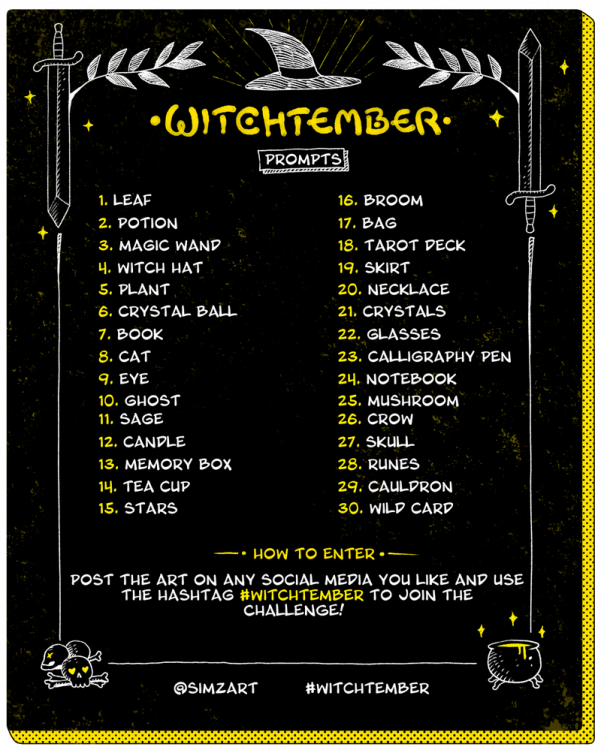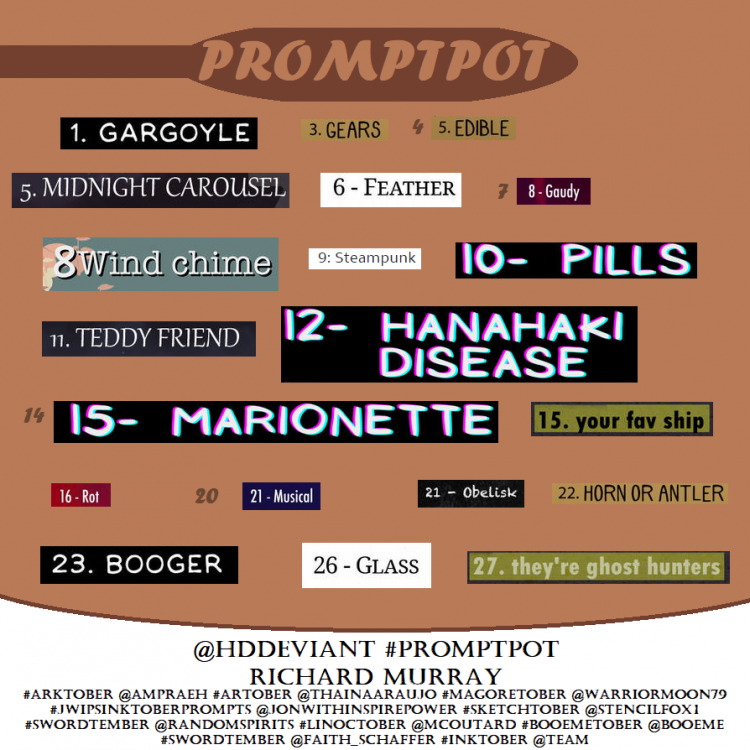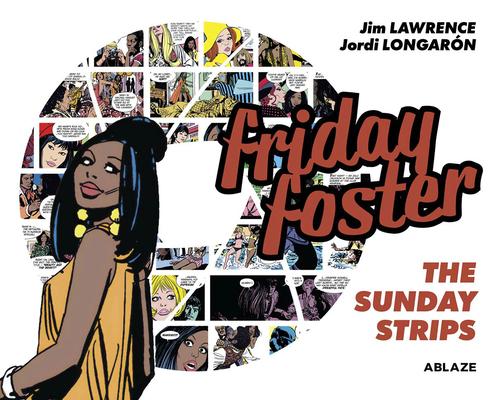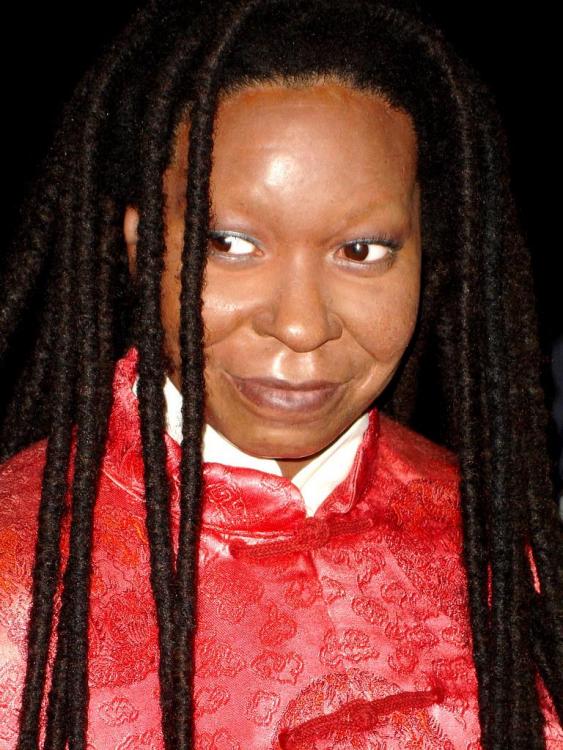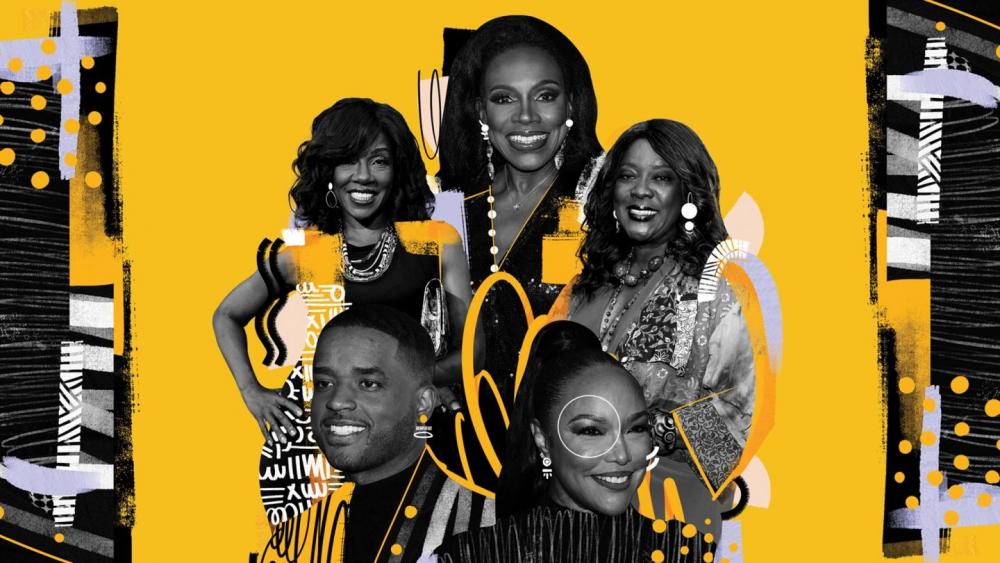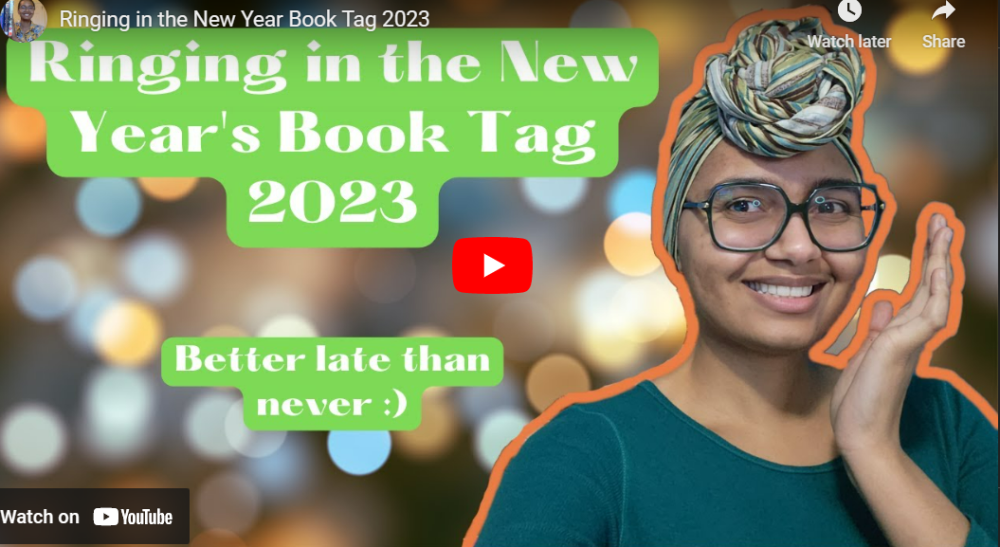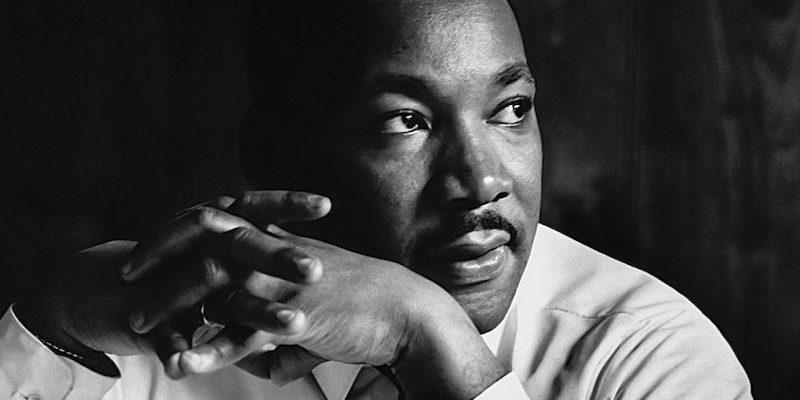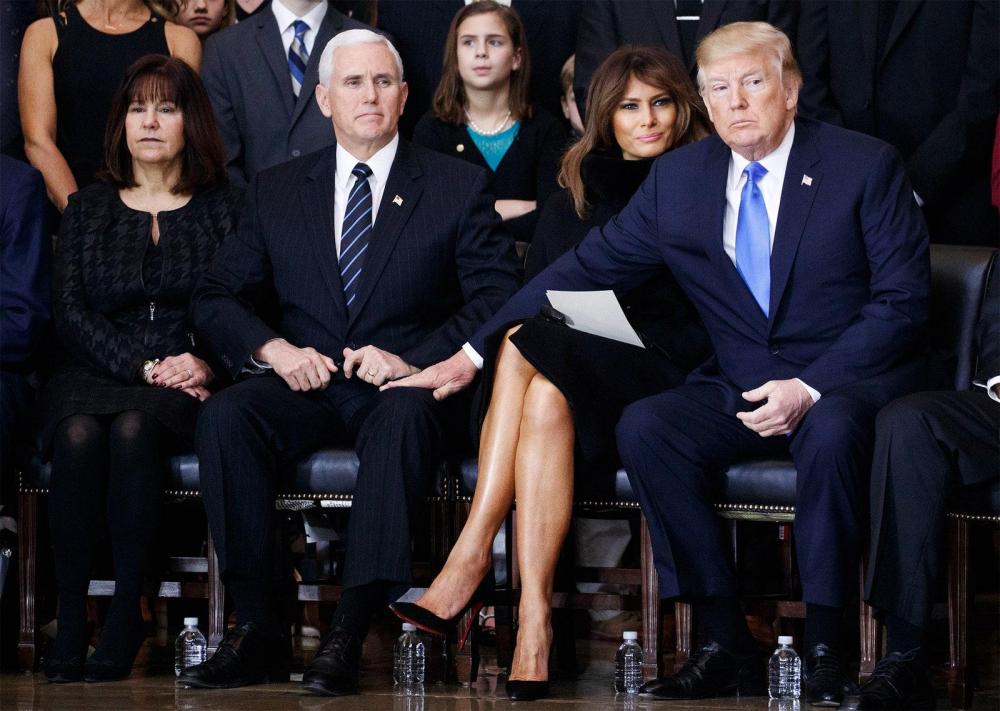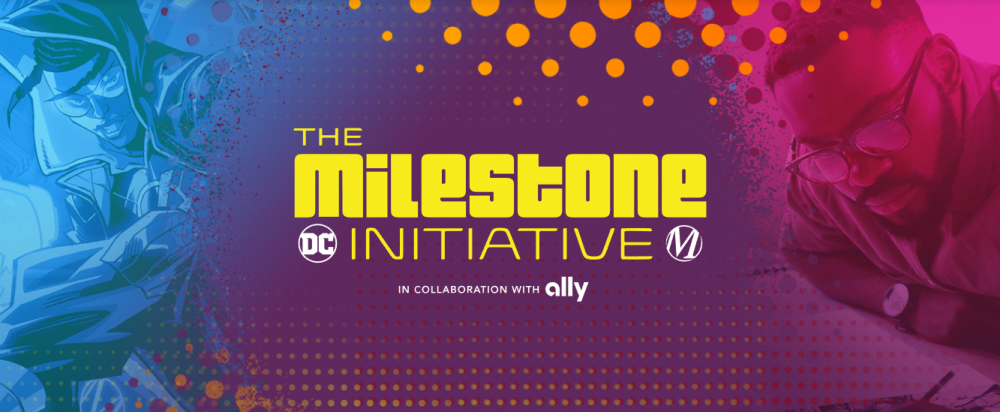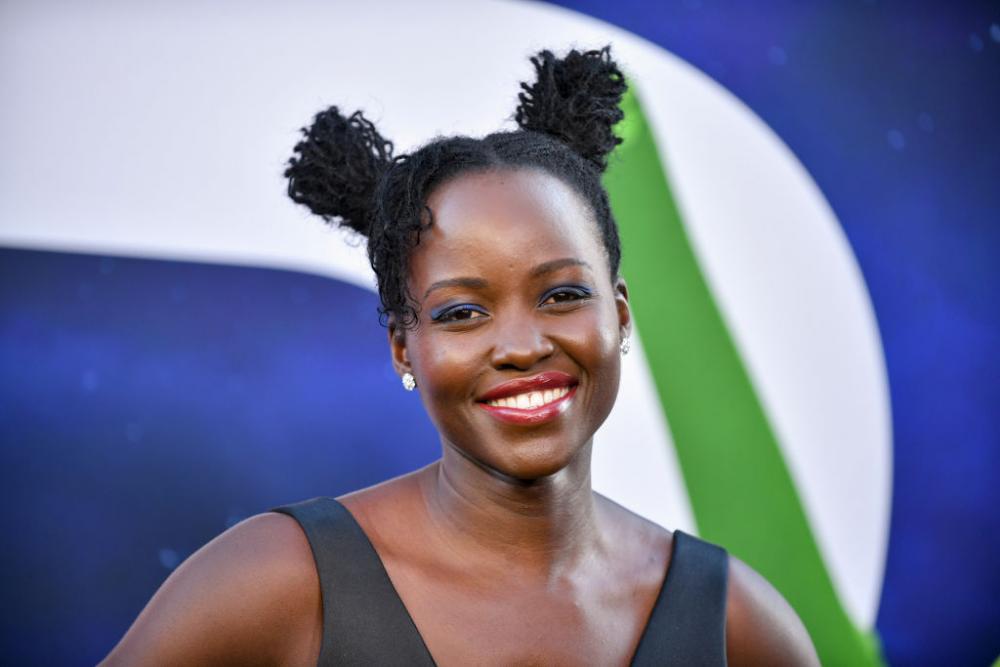-
Posts
2,401 -
Joined
-
Last visited
-
Days Won
91
Content Type
Profiles
Forums
Blogs
Events
Status Updates posted by richardmurray
-
Witchtember 2022 collection
Witchtember 2022 by simoneferriero on DeviantArt
My Witchtember gallery LINK
I will place my days for each prompt in the comments
forum post
https://aalbc.com/tc/topic/9724-witchtember-2022/
-
Promptpot - a collage of prompts
The following is mine
https://www.deviantart.com/hddeviant/art/Promptpot-931555529
This is the Promptpot explanation
https://www.deviantart.com/hddeviant/art/PROMPTPOT-931556698- Show previous comments 7 more
-

Day14
Marionette of Promptpot 01 - I thought of a marionette in reverse. From the ground to above.
https://www.deviantart.com/hddeviant/art/Promptpot2022Day14-933290001Day 15
Your Fav Ship of Promptpot 01 - Not my favorite, but a ship I always felt I wish I could had a hand in designing... the land boat from the film , age of dragons..
https://www.deviantart.com/hddeviant/art/Promptpot2022Day15-933290278Day 16
Rot of Promptpot 01 - Well, rot is decomposition. Where carbon based lifeforms, like humans, deteriorate. Carbon based lifeforms give off carbon dioxide. Can you tell what is going on?
https://www.deviantart.com/hddeviant/art/Promptpot2022Day16-933290543 -

-

day 21
https://www.deviantart.com/hddeviant/art/PromptPot2022-Day21-935153441
day 22
https://www.deviantart.com/hddeviant/art/Promptpot2022Day22-935154480
day 23
https://www.deviantart.com/hddeviant/art/Promptpot2022Day23-935154930
day 26
https://www.deviantart.com/hddeviant/art/Promptpot2022Day26-935155720
day 27
https://www.deviantart.com/hddeviant/art/Promptpot2022Day27-935155971
extra ingredient
https://www.deviantart.com/hddeviant/art/Promptpot2022ExtraIngredient-935156720
-
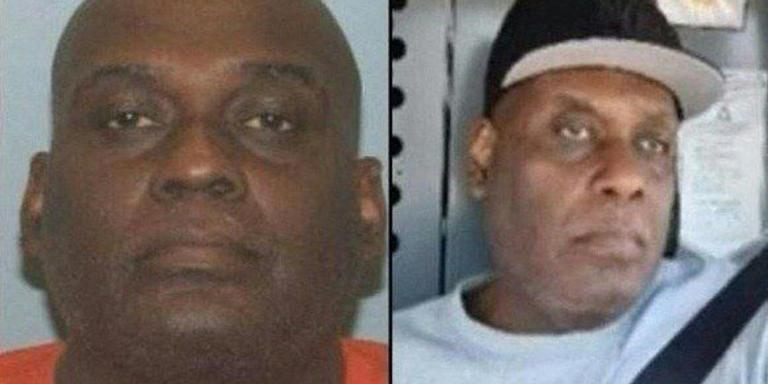
I don't know if Frank James was the shooter in the subway, but if he was, he offers an interesting query challenge.
NYC's black community always had black people in it, who love to suggest a usage of violence is incorrect. The reason why is complicated, it isn't merely about right or wrong. But, one of the juxtaposes between white controlled media of nyc /the black church in the black community of NYC/black employed class in NYC is the idea of gun violence in the Black community as something of youth. The narrative is, the youth must get the violence out of them. But, Frank James is sixty something years old. Frank James was an elder teen in the 1970s. So Frank James is not a Black person who is without a decades long look at the Black community in NYC, in NYS, in the USA and with that a high potential for a very honest while negative appraisal of many things in this area.
Many will suggest mental imbalance, as in NYC that is suggested for anyone who is violent. From white media to many or most black homes in NYC, mental dysfunction or imbalance is always the reason behind any violence as if, being violent can not be from a mentally sane person, which of course is a lie.
A FORUM POST
- Show previous comments 6 more
-

@Stefan It all boils down to a simple question.
Is the Black Individual free to do as they want in the USA today? For many black people, I don't think most but I can be rong, in the usa the answer is yes. I say this with offline conversations in mind side other Black folk in the usa. Sequentially, if you are Black in the usa and you feel the Black Individual is free to be in the usa, then you may view the power of the White collective is between nonexistent/mute/irrelevant.
White power is not an individual force. It is collective, and thus the only way Black people can defend themselves from it is with Black power. but Black power requires a Black communalism/collectivism that by default is against how many Black people in the USA interpret being an individual in the USA.
-
Dude, please stop using that word sequentially. Because you're employing it incorrectly.
And cut down on your word count. Stop insulting your readers as if they are completely clueless about the world.
You honestly sound as if you are speaking to fourth graders or folks who were magically transported here from a hidden jungle or a cave. -

-
as an ebook writer, I Can say a lot about this, but the reality is authors of ebooks need to ban am*zon ourselves. Stop publishing through them. am*zon comprehends one key point, most artists whether they want to admit it or not, are so desperate to make a dollar, that they are unwilling to risk any financial penalty, thus they gamble the safest financially, and that means publishing through am*zon in the ebook world.
https://www.washingtonpost.com/technology/2021/03/10/am*zon-library-ebook-monopoly/- Show previous comments 5 more
-

I hope my worlds help in any way:)
Good point... Obama wanted to kill the affordable care act but nancy pelosi believed in it and told him to stick it through, that is why I call it PElosi-care. She sacrificed losing the house for it. But, like with clinton, as president, no matter who is behind the formulation of a law or its molding in legislation, the president has to own up to that law, stating they accept that law as one to defend.
Please fact check and if anything I say is dubious or false, don't keep it secret, tell me:) ! I want to know if I am wrong.
Don't be too hard on we writers. Like the death of local farming wasn't farmers fault. Writers being ushered into am*zon's embrace isn't writers fault. I Rather we be prostitutes with a dirty pimp than slaves to a master.
-
-
 1
1
-
- Report
-
.thumb.jpg.afc88dfee9cd2927de0c440601caac13.jpg)
"I Rather we be prostitutes with a dirty pimp than slaves to a master. "
Or writers can remain independent...It's just as hard as being pimped by am*zon but the payoff is much sweeter.
 The remaining farmers are fighting the good fight. Let us be the writers who do the same!
The remaining farmers are fighting the good fight. Let us be the writers who do the same!
-
-
 1
1
-
- Report
-

good point @Mel Hopkins
-
MY REPLY
You miss two issues concerning milestone : First is of Dwayne McDuffie and that any literary form, needs a great storyteller, and milestone misses McDuffie. I submitted to the Milestone initiative, that didn't even involve one of the milestone creators , who had to submit to it himself. so, do black comic books have the best storytellers. Your focus is on what people call "Woke", what I call stories involving elements of modern sociopolitical frictions. The problem isn't the themes but it is the stories. The storytelling is simply not good enough. I oppose milestone's choice about changing the origin story, but I think other writers could had written a better story. Second, Literature is not meant to be escapists. Literature can serve any of infinite functions to a reader but did milestone's administrators comprehend the financial market for comic books? The problem with milestone today is they seem to be written absent a comprehension of the comic book market today. How do you sell the new milestone series better?
https://www.youtube.com/watch?v=bhUMiLlSYgc
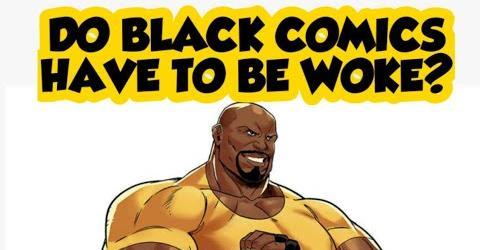
- Show previous comments 3 more
-

REPLY
Well Milestons is self contained so I guess it is better set up than DC/Marvel to let characters age and move on BUT their only really important and well known character is Static (maybe Icon and Rocket due their being on Young Justice).
Would Milestone be able to go on without Static and would people who love Static accept a new Static?
Would they want a new Static? Would they accept a Static that is, as is going on right now, bi or even gay?
Would his hardcore fans who made him what he is, accept a new character under that name whose biggest selling point is he (or even she) is gay or bi?
I'm guessing the answer to all these questions is no.
Let's recall that Milestone was such a disaster that it collapsed and was canceled and that was with the characters they started with.
Now, I DO agree that when they restarted it they should have just done an x number years later thing but again, their only marketable character is Static, as I said above, I don't think Static fans would accept a new Static and I really don't know if they would want an adult Static, certainly if they just skipped the years between so they didn't get to see him mature.
The thing I think you're not getting (or are not acknowledging) is that characters are properties. They are about what they're worth, the fans they have. You don't throw that away just to avoid a reboot, or use them for social experiments such as changing their very nature because it's trendy right now and it's a cheap way to get press.
There is a reason why the new Coke failed. Why products like that fail. You can change the packaging (give a character an updated costume, maybe change the way they're drawn) but you can't change the product itself.MY COMMENT
Chris McWilliams excellent questions, these are the gambles of the board room, the gamble of the people in charge. ... to milestone's history as a publication. I want to say one point. The comic book industry in the usa then or now is going through challenges. That many firms in the comic book industry are failing. I will not use the word disaster but I will say: between DC owning Milestone and the environment in the USA, milestone was in a very negative place to begin with. ... I do comprehend, look at Jack Ryan from the tom clancy books, look at James Bond or the media furor, I am not certain how real it is, over the next bond's identity, for is the next film about james bond or about 007:) so you see, I Comprehend very well, your point about properties. but, my point is for people to get the core issue of the industry in the usa. We both don't remember the comic code, but by its very nature it was , as you say , "woke" before the word wok was applied to such things. And the comics code role was cultural. yes? so, my big point is that the issue is the industry itself in the usa. Sadly milestone has joined a long list of these poor decisions to reboot. And, more than likely will not be the last. -

I just posted a comic book on the site: Friday Foster
This would not be a woke comic, but I don't think the writer is Black (I have not bothered to check)
-

I will share the post, glad the site has it. I accept not every black person is as demanding to the creative process to seeing black people as me.
more information
Friday Foster
One of the first, if not the first female led comic strip
https://en.wikipedia.org/wiki/Friday_Fostera question and answer with Jordi Longaron, the artists to Friday Foster
https://museumofuncutfunk.com/2015/01/17/jordi-longaron-the-legend-of-friday-foster/some still
http://davekarlenoriginalartblog.blogspot.com/2009/06/buried-treasure-lawrence-longarons.html
-
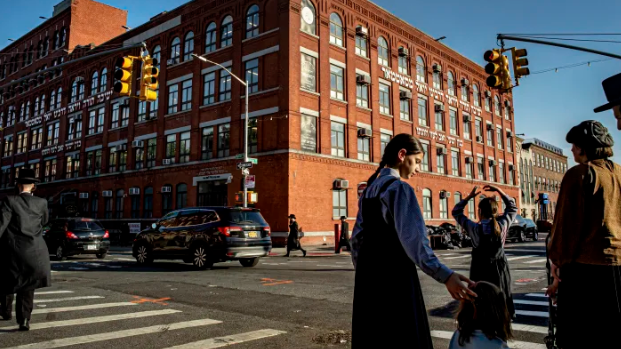
Students pour out of a Jewish school, known as a yeshiva, in Brooklyn, June 8, 2022. (Jonah Markowitz/The New York Times)
New York Lawmakers Call for More Oversight of Hasidic Schools
Eliza Shapiro, Brian M. Rosenthal and Nicholas Fandos
Tue, September 13, 2022 at 7:51 AM·5 min read
NEW YORK — Top New York officials voiced grave concerns about the quality of education in Hasidic Jewish private schools on Monday, a day after The New York Times revealed that many of the schools taught only rudimentary English and math and virtually no science or history.
Two Democratic congressmen — Jerrold Nadler, chair of the House Judiciary Committee, and Hakeem Jeffries, chair of the House Democratic Caucus — said they had serious concerns, with Nadler saying it was clear that some of the Hasidic schools were “utterly failing.”
“It is a paramount duty of government to make sure that all children — whether it’s those educated in parochial, private or public schools — are provided a quality education,” said Nadler, the senior Jewish member of the House, whose current district encompasses a major Hasidic neighborhood and who was himself yeshiva-educated. “It is our duty to all New York students to ensure that the law is enforced.”
Sign up for The Morning newsletter from the New York Times
Jeffries, who represents parts of central Brooklyn, called for “a rigorous inquiry in order to make sure that the health and well-being of all children is protected.”
Daniel Goldman, who recently won a contested Democratic primary for a new congressional seat that includes Hasidic areas in Brooklyn, said he hoped the schools would work to comply with the law, adding that the Times report “paints a damning picture of an inadequate secular education that does not comply with state law.”
At the state level — where politicians routinely court the cohesive Hasidic voting bloc — the state Senate majority leader, Andrea Stewart-Cousins, said she was concerned about the lack of secular education in the Hasidic schools.
“The allegations in the story are deeply disturbing and must be addressed,” she said.
State Sen. Julia Salazar and Assemblywoman Emily Gallagher, both Democrats who represent heavily Hasidic Williamsburg, Brooklyn, said they were particularly alarmed by accounts of corporal punishment in the schools and would introduce legislation to ban such punishments going forward.
Other leaders, including Gov. Kathy Hochul and members of a powerful state education board, showed less willingness to criticize the Hasidic schools.
Hochul, a Democrat who has sought to appeal to Jewish voters before this fall’s gubernatorial election, declined to take a position on the Hasidic schools. She is ahead in polls, but, only a year after taking office, is still forging relationships with key groups across the state.
“People understand that this is outside the purview of the governor,” Hochul said Monday at an event in Harlem.
Although the state Board of Regents, not the governor, controls the state education department, Hochul is the most powerful politician in New York and can have significant influence over education issues.
For their part, members of the Board of Regents made no mention of the Times report in discussions Monday before an expected vote on new rules that would hold private schools, including the Hasidic schools, known as yeshivas, to minimum academic standards.
An attorney who has represented many Hasidic yeshivas, Avi Schick, recently said that Hochul’s chance of being reelected this November could be threatened by the Regents vote, even though the governor has not taken a public position on the rules.
Other New York Democratic officials either did not respond to inquiries or declined to comment Monday about the Hasidic schools, including Sen. Chuck Schumer, the majority leader; Sen. Kirsten Gillibrand; and Rep. Sean Patrick Maloney, chief of the House Democratic campaign committee.
New York Republicans, including Rep. Lee Zeldin, defended the schools and criticized the Times report. At a campaign event outside City Hall on Monday, Zeldin, who is running for governor against Hochul and is Jewish, suggested that public schools ought to be emulating “the values” of Hasidic schools, not the other way around.
Other state Republicans said they believed the government should not interfere with private religious education or parents’ ability to choose where their children are educated.
Benine Hamdan, the long-shot Republican candidate challenging Goldman in Brooklyn, said she opposed the state regulations, taking a shot at critical race theory. “While public schools are teaching CRT and sexuality, Hasidic schools should continue to have the right to teach Judaism,” she said.
“At my core, I believe all parents have the right to choose the educational setting they think is best for their children,” said Mark Martucci, a state senator who represents a district just north of New York City and added that he had toured yeshivas and had been impressed by the students.
In a state where Republicans are largely locked out of power, the party has been increasing its outreach to Hasidic voters who have consistently voted for Democrats in local elections but have begun favoring Republicans, including former President Donald Trump, in national races.
Published on Sunday, the Times investigation showed that Hasidic schools appear to be operating in violation of state law by denying thousands of students a basic education. The community operates more than 100 all-boys schools across Brooklyn and the lower Hudson Valley, which have received more than $1 billion in government money over the past four years alone.
The schools typically provide only 90 minutes a day of secular instruction, just four days per week, and only for boys ages 8 to 12. As a result, the students are failing to learn secular subjects at extraordinarily high rates, the Times found. More than 99% of students who took standardized tests in 2019 failed, according to state data.
At a news conference Monday, Mayor Eric Adams of New York City said he was “not concerned” about the Times’ findings but stressed that his administration was continuing a long-delayed city investigation into some Hasidic schools.
“I’m not going to look at a story. I want a thorough investigation. I want an independent review, and that’s what the city has to do. And we’re going to look at that,” Adams said. The mayor added that any instances of child abuse in the schools should be reported and investigated.
Over the past few years, Hasidic leaders have made keeping government out of schools their top political priority and have relied on officials elected from their community to help block the regulations.
One Hasidic politician, David Schwartz, a Hasidic district leader in Brooklyn, disputed reports of problems in the schools, including regular use of corporal punishment, saying, “I and my community — tens of thousands of caring parents and educators — are unfairly being paint-brushed due to the accounts of a few.”
© 2022 The New York Times Company
ARTICLE
https://www.yahoo.com/news/york-lawmakers-call-more-oversight-115132238.html
MY THOUGHTS
I want to first restate the key points in the article.
- The white jewish schools are operating with some level of illegality for an extended time
- government officials at the federal level <senator chuck schumer> new york state <governor hochul> or new york city level <mayor adams>are so frightened of the white jewish voting block aside the white jewish financial power that none have accepted the findings as true publicly while all want an extended time of deliberations which they would not give the black community or any part of the black community
- The defenders of the white jewish schools say parents have the right to place children where they want and to preserve the heritage in their community, in this case jewish. I think of the Black descended of enslaved MOVE movement in philadelphia and how a black mayor treated them for wanting to preserve their own culture.
- The white jewish schools , over one hundred all boys schools at least, received over one billion dollars in four years while providing per week only four days with ninety minute secular instruction.
- More than ninety nine percent of students in the white jewish private schools who took standardized tests failed in 2019, this is 2022.
Now what is my position. I don't care about: the white jewish schools whether committing illegality or not, the financial power of the white jewish community in New York City, the influence by the white jewish community on government officials<federal, state, city>, the white jewish community's heritage or culture being preserved or maintained, or the failure of white jewish students.
What I care about is the Black community all throughout humanity and in particular, the black community in New York City.
The Black community in New York City doesn't have a large private school system internally and yet Black teachers in public schools have been removed for the crime of disagreeing with administrators, on a first time offense, not for years of neglect doing their job.
I know the black community in NYC is fiscally poor, it started that way for enslaving black people was legal when new york was new amsterdam before the creation of the United States America. Sequentially, the Black community in NYC doesn't demand the trepidation from elected officials even though it historically votes as a block too.
From the Black Panthers to The Nation of Islam to the Rastafarians the Black community in NYC tends to have the loudest opposition internally to heritages or cultures from within a community. I can see a Black newscaster in New york city asking, what does it mean to have a Black school.
The black children of New York City have a financially impotent Black adult community, which includes me, who in majority, I am part of the black adult minority, continually preaches to them about merit or equality or voting while providing black children in new york city nothing. The black adult community in new york city, includes me, have failed the black children of new york city hiding behind a cheap veil of individual decency or merit when in truth we black adults are just flat broke and are too proud to admit it. Any Black adult who reads this, stop telling black children about the need to be more educated and start making money and giving it to black kids regardless of their scholastic quality. Any Black adult who reads this, stop telling black children about competitive spirit and start making sure governments give money for black kids to enjoy life more regardless of their demeanor. Any Black adult who reads this, stop telling black kids what they have to do and start telling black kids what you can't do, admit your impotency your weakness your poverty and tell the truth of you to black children.
I feel sorry for Black Children in new york city. I was once one, and while I was fortunate in the time span of my childhood from a homelife perspective or communal perspective, I despised local media in new york city which was and is ninety nine percent white owned. White owned new york city media never stopped reminding black children how they needed to do better in my childhood days, comparing black children to various children anywhere with one thing in common. At the time of comparison they are better than black children in New York City. While the same white owned news media of New York City, couldn't find time to discover how the French don't count the schools in the Balieues as part of their main surveys to the world , the japanese don't count the children who don't come to school at higher rates, the schools in the white towns or villages in the midwest where the curriculum is lower isn't admitted in the assessment to comparing the black children in new york city. Black children in NYC have been falsely attributed as consistent failures when in truth it is a mere trick of statistics. Any thing can be proven statistically, anything, the key is in the details. Black children in education have been attacked by statistical warfare and black adults, like me,let it happen.
- Show previous comments 3 more
-

@Chevdove Education is a part of life:) I will never deny the need to keep an open mind, to want to keep learning... but when it comes to scholastic achievement in the USA. Black adults, to be blunt, have to change tact. We have to stop suggesting our children whom we can not provide for like White adults can to white children must overcome Black adult inability. I am not suggesting Black Adults tell Black Children to stop dreaming or working or desiring. But, this story not only confirms what many in NYC already knew. I can speak to that. But the story also exposes how unfair Black adults, who can't provide the kind of financial or environmental scenario for black children as a community, are to black children in asking them to overcome those walls. White children failing 99% with an average scholastic test, are going to a school getting billions. That is the power of the white adults. What are we black adults actually asking our children to to?
-
-
 1
1
-
- Report
-
Yes. How can Black children overcome our inabilities without help?
Black adults do need to give children more than just words.
But then, another problem, I believe, is that many Black adults become parents at too young of an age and part of our failures has to do with maturity.
I believe we need elders, a community of elders to come together, and pool resources to help young
parents as well.
-
-
 1
1
-
- Report
-

-
I looked at two forum posts concerning whoopi goldberg and none focused on the point, what did WHoopie Goldberg say and was it the truth
What did WHoopie Goldberg say, I paraphrase close to a quote: "Why are they upset over nudity more than the holocaust...Well, this is White people doing it to White people, so y'all gonna fight amongst yourselves,...If you're going to do this, then let's be truthful about it because the Holocaust isn't about race....man's inhumanity to man...its about two White groups of people... your missing the point, it's about how people treat each other... if your worried about Maus, they are not going to say it is about me, they are going to say, I don't want to be like that"
So, what were Whoopie's points?
1)The people who want to ban MAus's book are more interested in nudity than the violence between human beings?
2)THe violence between human beings in Maus book is more of an issue than the nudity
3)The actions of the National socialist party of germany concerning the holocaust or in general within germany was about white people to white people.
4)White people fight amongst themselves
5)The holocaust isn't about race
6)The holocaust is about man's inhumanity to man
7)The holocaust is about two groups of white people
8)Children reading the book will not ponder about the inter human violence, they will not want to be the abused.What is the truth in each point?
1) Truth, the people banning "Maus" are stating the primary reason is nudity, in a modern media where nudity is rampant. Either they are lying , and they want to ban a book that speaks on the holocaust or racial issues, or they are fanatic about an issue, nudity in public, that in the modern USA is near impossible to fight off.
2) False, neither is an issue. Books , like all forms of art, are not obliged to many anyone comfortable but the writer and the reader who wishes to or continues to read.
3) Truth, most of the people in germany are white, regardless of their religious race. Sequentially, this is an issue within the phenotypical race commonly called white.
4) Truth, the Nazi party of the USA was as emboldened to follow Hitler as any other Nazi party throughout the world.
5) False, the holocause is about religious race. It isn't about phenotypical race. White jews are jews, while also white. A White christian in germany can say a white jew is not german, as german is a label for three seperate races. A geographic/cultural/linguistic race.
6) False, All of war is about human negativity towards other humans but not inhumanity. Cruelty/savagery/slavery are negative things but not inhuman things. When a male lion defeats another male lion and kills a cub of the defeated lion, that is not an inlion act. Nor does it mean the victorious lion is a sinner or evil. The point of power is to be powerful. To continue your line while the others end. The goal of the NAzi's concerning their murder sprees was erasing those not deemed appropriate for Nazi german, by there standards, who lived in Nazi Germany. They wanted a germany free of jews/romani/midgets. The USA itself had many an eugenics program. The goal is to kill some bloodline and continue others. It isn't inhuman but it is very negative for those whose bloodlines are at risk.
7) Truth, the white jew in germany side the white nazi , comprehend that white jews existed in nazi germany as collaborators. Sequentially, even the Nazi party of germany thought white jews had a positive function that was worth not killing them.
 Truth, the role of parents is to guide children. In the USA most parents guide children to not be the abused. It isn't about character, it is about power. Be the slave master, not the slave. The slave master may be disliked but the slavemaster is free, the slavemaster controls their life.
Truth, the role of parents is to guide children. In the USA most parents guide children to not be the abused. It isn't about character, it is about power. Be the slave master, not the slave. The slave master may be disliked but the slavemaster is free, the slavemaster controls their life.
In conclusion, I see five true points and three false points in Whoopie's statements. An employer has the right to suspend or fire an employee , if the contract doesn't protect the employee, based on their literature. Freedom of speech for most jobs in the usa historically doesn't protect the laborer from the firm's negative appraisals.
All the talk about the person of whoopie goldberg or the potency of the white jewish community is invalid to the issue.Read an article concerning book banning from an authors lips
https://aalbc.com/tc/profile/6477-richardmurray/?status=1757&type=statusFORUM POST- to read views
https://aalbc.com/tc/topic/8512-whoopi-goldberg-suspension/
- Show previous comments 2 more
-
@richardmurray, IMO, it's not about whether Whoopi Goldberg said something that was right or wrong. She's entitled to say whatever she thinks. But, she should have known better too.
Same applies to your treatise. You have a right to your opinion/belief.
BTW, humans are not animals. We do not have to rely solely on instincts for survival. As a result, we do not have to be savage. That's a choice.
From where I sit, black folks don't need to insert themselves in word, deed or action when it comes to white folks going against each other.
As black folks,we have our problems with white supremacy.

-
-
 1
1
-
- Report
-
Whoopi is part of a panel on a popular TV talk show that airs free to most. So she is supposed to and expected to offer a take on trending issues and events.
I do not think many people understand her role in the popular TV media. The View is not a news show, but too many erroneously believe it is.
She simply spoke in error.
I have no idea why some have no clue where the name Goldberg came from. Whoopi was trying to break into the stand-up comedy scene and her adopted last name allowed her to stand out.
I always thought she was funny, devastatingly sarcastic and a pretty good actress.
But that statement she made was a terrible mistake. Not to mention wrong.-
-
 1
1
-
- Report
-

-
Loretta Devine, Sheryl Lee Ralph and the THR Blackfamous Roundtable – The Hollywood Reporter
After reading the article, the argument is what in completion? ... Black thespians in the USA movie industry, titled hollywood, are revered by Black Audiences or in Black owned or mostly populated media outlets in certain roles or films , most with heavy black involvement behind the camera, while underrecognized by White audiences or in white owned or mostly populated media outlets. ... The solution in my view, is perspective. I will explain. Most people use the term bollywood to refer to the cinema of india. But I know a few indians who live in india and people who live in india relate all media by region or culture. Very few things in Entertainment in india are deemed by Indians in india as pan indian. In parallel, people or media outside India like to suggest all media in india is pan indian. Bollywood/Tollywood/Kollywood I heard of before. The following wiki displays how many more there are. < https://en.wikipedia.org/wiki/Cinema_of_India#Cinema_by_language > .. Now what is the point? the point is, each of these woods have their own identity. It isn't Kollywood thespians are underappreciated in Bollywood. Each wood in india is its own ecosystem. yes, some thespians can go between, but it isn't usual. Now, to the USA. If you look at the Cinema of India, a highly internally multiracial county, as a good comparative to the Cinema of the USA based on quality of racial complexities from the people in their country respectively, then you see the issue is not that Black Cinema's stars are underecognized in hollywood. It is that Black CInema is not hollywood. To be clear, Blackwood needs to stand isolated from hollywood the same way the hindu and tamil speaking woods do in india. yes, most black people in the usa speak english, but the culture of black people in the usa is not that of whites. Even though many black people work hard to make it so.
- Show previous comments 2 more
-
@richardmurray
A couple of suggestions:
Use the paragraph key to break up blocks of text.
You definitely need a Copy Editor and an AP Style Book.
Never use "etc." That tells your readers that you simply couldn't think of anymore to say in that sentence.
Read over your work carefully before posting.
Because you asked a question about how cheaply one could make a film and then left your readers hanging for a reply.
The industry term is "low budget." Not cheap. -

-
Not a problem. Just contact me if you need any more pointers. If you're going to blog, shoot - be DAMN GREAT at it!
One more tip, never use Wikipedia as a source. It's too easy and Wikipedia content can be edited and rewritten by anyone who is intent on doing so.
Stick with academics. Google is your friend to find websites.
-
Ringing in the New YEar Book Tag 2023 from Thistle and Verse
mentioned- Ties that bind from Tia Miles
- Darknesses from Lachelle Seville
- Early Departures from Justin A Reynolds
- Delicious Monsters from Liselle Sambury
- Wakanda Forever from Ryan Coogler , Joe Robert Cole
- Heaven Official's Blessing from Mo Xiang Tong Xiu
- Of One Blood: Or, The Hidden Self from Pauline Hopkins
- The Brothers Jetstream: Leviathan from Zig Zag Claybourne
- Forest of a Thousand Daemons: A Hunter's Saga from D.O. Fagunwa , Wole Soyinka (Translation)
- The Things That Fly in the Night from Giselle Liza Anatol
- A History of Nigeria from Toyin Falola
- The Gatekeeper's Staff: An Old Gods Story from Antoine Bandele
- Flowers for the Sea from Zin E. Rocklyn
- The Infinite from Patience Agbabi
- For the Culture Readathon from TyBooks01
- Drunken Dream of the Past from Sun Yujing performed by Lin Zhixuan
my comment
https://www.youtube.com/watch?v=OKreFvghrKk&lc=UgxXtsU2FVBC5yJcoOd4AaABAg
- Show previous comments 2 more
-

did you see thistle and verses book list prior?
-
-
 1
1
-
- Report
-
No. Never been to that website. I'll surf its wave ...
-

it is a video, @Rodney campbell just click read more and the video will unveil for thistle and verse
-
-
 1
1
-
- Report
-
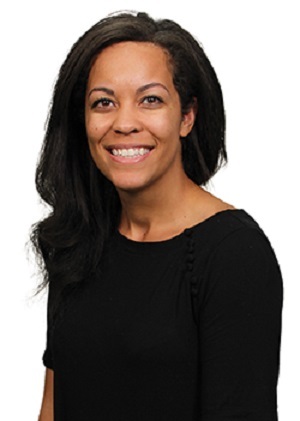
This week on the podcast we are joined by Lateefah Zawistowski to discuss all things OverDrive. As an account manager for OverDrive, Lateefah gives us the inside look at how OverDrive works, how authors can add and market their books on OverDrive, and how libraries utilize the service. She also shares some advice on pricing your books for libraries, what trends she’s currently seeing in library sales, and she discusses the impact of the pandemic on libraries.
- Lateefah tells us about her role as account manager at OverDrive and why she believes publishers and indie authors alike should consider opting their books into OverDrive
- She discusses the borrowing habits of readers and how they change based on the genre, and she tells us why the library is such a great tool for discovery, especially for backlist and midlist titles
- Lateefah explains how libraries purchase books from OverDrive, the multiple purchasing models available to authors and libraries, what time of year libraries are most likely to be purchasing books, and she gives some advice on how to price your eBook for libraries
- She gives us her predictictions for library trends in 2021 and beyond, and explains why the surge of new library users at the beginning of the pandemic, while great, isn’t necessarily enough to support local libraries
- Lateefah discusses OverDrive promotions and she explains how merchandising is essential to discoverability on OverDrive
- She explains the global reach of OverDrive and how many different markets they’re available to, from public libraries to education to corporations, and she discusses the different language markets outside of English Language books
- Lateefah talks to us about current trends in library sales, what books have sold the best during the pandemic, and she explains why genre fiction is having a big moment right now
LISTEN TO THE INTERVIEW OR READ THE TRANSCRIPT USING THE ARTICLE BELOW
KWL - 245 - Optimizing OverDrive with Lateefah Zawistowski - Kobo Writing Life

Happy Audiobook Month! What better way to celebrate than by uploading your audiobooks directly to Kobo! Especially because it’s incredibly easy to do.
How easy, you ask? You can upload your audiobook in only ten steps (and one of those steps is signing into your account)! Here’s how:
Log into your Kobo Writing Life account here: https://www.kobo.com/writinglife
Select the Audiobooks tab on your dashboard. Don’t see the audiobook tab? Send us an email at writinglife@kobo.com and we can activate it for you!
Click “Create new Audiobook”. Once on the audiobook uploading page, you can start inputting your audiobook information. You will first be asked to describe your audiobook. This includes: the title and subtitle (remember to only include text that appears on your book’s cover!), the series name and number if your book is part of a series, the contributors including your narrator, your synopsis, publisher name and imprint, your publication date and release date, your ISBN (this must be a unique ISBN and cannot be the same as your eBook or print book!), and finally the language of your audiobook and whether it’s abridged or unabridged.
You will then be required to enter the categories for your title. These categories will determine how your audiobook is labelled and categorized in the Kobo Store. We recommend selecting three categories for each book to ensure that customers who are browsing through our store have a better chance of finding your titles.
Next, you will need to upload your cover image. We accept cover images in .png, .jpg and .jpeg file formats. We recommend the minimum size of audiobook cover images be at least 600px by 600px. Covers for audiobooks should be square; if they are not, they will be automatically adjusted. Please note: cover images cannot exceed 5 MB in size.
Now you are ready to upload your audio files! You can drop files directly from your computer into the Upload Audio Files section or select the folder on your desktop that contains your audiobook files. We only accept audio files in .mp3 and m4a formats. An individual file cannot exceed 200 MB in size and all files combined cannot exceed 2 GB in size. Please wait for your audio files to be completely uploaded before moving to the next step. You will know when files have been successfully uploaded when the “Listen to confirm content” prompt appears .
Once your files have been completely uploaded, you can then start to make your Table of Contents. The Table of Contents organizes your audiobook to make sure it is in reading order. You can move the files up and down to ensure they are in the correct order and provide the chapter title for the file under the “Name of Content” section. Please note: What you list in the “Name of content” section will appear in the Table of Contents customers use to navigate your audiobook on our apps.
You will then be asked to provide the geographic rights for the title. Please select the countries you own the rights to sell your title in.
The final step is to set the price for your title. Please input the price of your title in all the available currencies. Audiobooks pricing is slightly more complicated than eBooks. The royalty percentage thresholds are as follows:35% royalties for audiobooks priced $2.99 or lower
45% royalties for audiobooks priced over $2.99Please note: If a customer redeems a free trial token for your audiobook, the royalty amount will be 0. If they redeem using a paid token, the royalty amount will be 32%. Otherwise, the royalty amount will be the values displayed above.
Once all steps have been completed you can then select publish! If you have missed any steps, you will receive an error message. Otherwise, your audiobook is in good hands and has been sent for processing. It will soon be available on the Kobo store in 24-72 hours.
Be sure to let us know when you’re publishing new audiobooks so we can add them to our audio new release calendar! < https://docs.google.com/forms/d/e/1FAIpQLSdy1Hzav1WCotnQqd9zOmrUYj5OMcQcqQ-YJl_erliV6apuYQ/viewform >- Show previous comments 1 more
-

@Mel Hopkins you mean overdrive or kobo for audio?
-
.thumb.jpg.afc88dfee9cd2927de0c440601caac13.jpg)
Overdrive - but it would apply to any service. I've noticed that many independent authors and even some traditionally published authors hand over their intellectual property to vendors.
-
-
 1
1
-
- Report
-

good point @Mel Hopkins this is why you need to accept what you will use where. I think artist need to know where certain content they create is going or at least accept where it will go. if you want to be safe, make content to be shared. I know quite a few artists who do that in various fields: drawing/writing/photography
-
-
 1
1
-
- Report
-
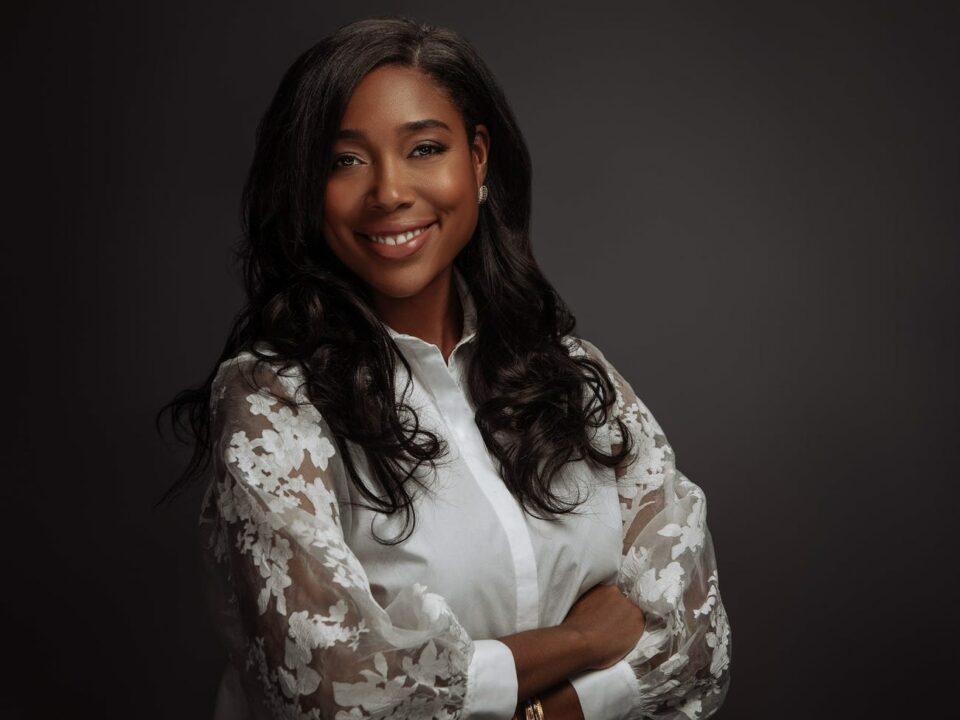
THIS MILLENNIAL BOUGHT EBONY AND JET FOR $14M WITH PLANS TO BRING THE MAGAZINES INTO THE DIGITAL ERA
by Dawn OnleyAugust 11, 2021
Founded in 1945 by John Johnson, Ebony struggled under declining advertisements, financial troubles, and controversy a few years ago. It was quite a shift from the magazine’s heyday, when Ebony and sister magazine, Jet, were the go-to publications for people interested in reading about Black culture, notable Black leaders, and issues impacting Black people.The company eventually filed for bankruptcy, and by 2019, both Ebony and Jet had stopped printing. This was an opportunity for Bridgeman and her father, former NBA player and entrepreneur Ulysses Junior Bridgeman, to discuss the magazine with the family to gauge interest in purchasing.
Bridgeman told Business Insider she jumped at the opportunity. The family purchased the legendary pubs for $14 million — and Bridgeman began talking with Michelle Ghee, a former executive at CNN and BET, about serving as CEO. Together, they relaunched Ebony on March 1 and are planning a relaunch of Jet later this year.
Ebony’s new mission is to be bold, brilliant, and beloved. Both magazines are now fully digital with no plans on reprinting physical copies.
According to Business Insider, Ebony has at least a dozen people on staff. Bridgeman’s role has been all-encompassing — from calls with advertisers to meetings with potential partners and magazine contributors.
“You have to understand every aspect within the business,” Bridgeman told BI. “You show up in a way that people feel they can approach you. They feel that they can work with you, not only just for you.”
Bridgeman’s strategy has seen her touting the power of the Black dollar to potential advertisers. “You are going to want to tap into that power,” she tells them, according to Business Insider.
https://www.blackenterprise.com/this-millennial-owner-bought-ebony-and-jet-for-14m-with-plans-to-bring-the-magazines-into-the-digital-era/
- Show previous comments 1 more
-

Hi @richardmurray in your blog post questioning Ebony's viability you wrote, "...in the usa people, all races, are buying less and less books in any form." I was wondering where you got that stat?
No I do believe a print version of Ebony will be wrought with challenges. I just don't think a lack of potential readers will ne their problem. The need to publish substantive articles. Celebrity fluff will not cut it -- at least not with me.
It they follow the mainstream media's lead, in the way Black people are covered, they will fail. Ebony needs to elevate itself above the fray -- the way they did in the past.
-

thank you to Troy < https://aalbc.com/tc/profile/9056-troy/ > , I said all forms, I meant all forms of paper based books, pbooks:: magazines on the rack, newspapers, retail paper books similar. Audiobooks/ebooks are always upward. and libraries are in heavy or growing use. So I misspoke:)
-

I Said
you argue that black people forgot or lost sight of ourselves with the push to integrate as equals to whites, but who was ourselves? Your words suggest a unity or communal organization that did not exist. Remember, Frederick douglass/nat turner/web dubois/booker t washington were in each others lifetime; they did not have similar minds about various questions to the black individual or community. Do most black people want better for black people? yes. But the definition of what that means has never been agreed upon in our community. Sequentially, what you say was a mistake was what many black people wanted. Not all black people, not me, not you or cynique, but in a population of tens of millions, many.
Troy < https://aalbc.com/tc/profile/9056-troy/ > said
The disagreement between the likes of Frederick douglass/nat turner/web dubois/booker t washington was between individuals. I'm talking about a people.
There certainly was greater unity in the past than there was today. The unity was required for our very survival. Here in Oklahoma I'm aware of many thriving Black towns that existed because white folks refused to let us live in their communities.
That does not mean everyone in those communities agreed on everything -- that would be impossible. N=They however agreed on enough to create wealth in the face of constant existential threats.
Today it is questionable if we can generate enough unity to maintain a magazine that provided the agency to speaks to our needs and tell out own stories ... and that is sad.
So yes I look to the past the lament the lack of solidarity that we had in the past.
My Reply
each one of those men had many black people who aligned to their philosophy. Is that true or not? If it is not true, then as you say, their philosophical variance is merely individual. If true, then it is a communal issue.
Unity is not organization, they are not the same thing. In the comments sections in this forum most black people , you+ me+ mzuri+cynique, all are unified. we all support this black owned website, but are we organized? no. The key here is the difference between unity or organization. If unity is organization to you then you are correct.
The word agree means to like. The word accept is to take something, whether you like it or not. For this phase in my response. I will use the word accept , in place of your word agreement. Why? Agreement isn't about organization, a thing of the body. Organization is about acceptance. When the irish mob relented to the italian mob in NYC, it wasn't agreed it was accepted. Getting all in a group to like a thing is near impossible. But getting all in a group to accept a thing is mandatory if it is to function positively. To your point, black people whether we liked it or not accepted, the situation under white power. Thus we collated into towns and , proving my point, the second white people allowed blacks in their towns, the exodus of many blacks from our towns. Those blacks never liked or agreed to living side other black people, but they accepted it, under white power. But a strong organization isn't when the body is formed under pressure from outside but when it is formed from balance within, ala the irish mob and italian mob in NYC.
And that leads to my point. You question if enough unity exists. I know enough unity exists. Most black people want better for black people, ala this website's mere existence. But unity is not organization. And that was why I said the better stratagem for Ebony is to focus on fiscally wealthy blacks, all throughout humanity. Yes, most black people, including me and I think you, are not part of the fiscally wealthy black group. But, that group's members have a lot in common. All are fiscally wealthy, thus absent the difficulties being fiscally poor brings. Most, over 90%, have a positive relationship to some whites. Now they do not all speak english, are not all african, but the Ebony magazine can bridge those bounds. My original comment suggested ebony can succeed. But not by catering to the entire village, it must cater to a tribe in it. And why? cause the village in the usa or beyond it is not organized. And never was.
Fair enough, we had a solidarity in the past, but that was under white duress. The future goal, is to see what kind of solidarity we can make without pregnant black women being hanged, without black children being electrocuted for living, without formerly enslaved illiterate black men signing their lives away for bread, without black towns at the mercy of the white towns next to them. Black people being forced side other black people cause all of them are afriad of whites is a solid thing, but I rather black people want to be side other black people cause we want to be. And we have yet to prove that, in the usa at least.
-
Someone ask me: what will the novels of the future be if all the protagonists do everything online? You wouldn‘t have the romcoms with Julia Roberts meeting Hugh Grant in a bookshop…
He originally asked me but i feel the question is good for all to answer
My answer is in sections: epistlary fiction/subordinate characters/the modern readership-viewership-listenership
Epistles are merely letters and online communication, whether people want to admit it or not are letters. Human beings are accustomed to epistlary work. Many segments of the bible are letters. Books of letters , linear or alinear temporally, were a fiscally profitable genre in various times in the white european literary industry<said industry includes the usa or australia>. Historically, precedence exist for financial viability of or customer desire to epistlary fiction.
Modern customers of fiction love the visual,they love visual description, pseudo realism, fantastical visions. At the core of epistle is the letters are not bound to give all details, to explain all events. Writers can choose that path of creation but it isn't mandatory. Sequentially, why many writers use letters as tools for a specific purpose in a non epistlary work. But, if all the protagonists and I add antagonists use letters, then for action , descriptive action, you need subordinate characters. not supporting but subordinate. to be blunt, you need robots, you need characters that can not act alone or are extensions of the protagonists or antagonists but individual enough to have a physical identity one can write about. In parallel, think of a doctor that performs surgery remotely. The doctor actions are in the same way as writing a letter, the machine that translates the doctors motions/words/typing into action on the patient, while it does not act absent impetus from the doctor is had individual elements. its programming/its energy/its maintenance/ its environment all can have a positive or negative influence on itself that can lead to scenarios many will call drama or definitely action. But they are not protagonists or antagonists.
Customers matter, they always have and always will. Art has no bounds. Many people today apply their opinions as rules of art but the truth is, art has no ruleset to it. In parallel, making money with art is where all the judgements have value and where many artists or readers , do not speak enough of their purpose in their judgements. to that end, the modern readership , as the questioner stated individually had problems with epistlary fiction. But the reason is complex.... Most human beings are not online nor do they have money. But to the humans who have money, many are online, many are multilingual. The buyers are used to reading epistlaries every day, tweet streams, facebook streams, instagram comment streams are all epistlaries. not written by a steven king or jk rowling, but a sequence of unknown strangers, but the readers are used to reading epistlaries full of drama.
I conclude with a question, based on what was said, what kind of work epistlary can bridge what the customers do every day, with fictional characters? In the film world you already see movies that use message screens in the films. Like any style, when it doesn't have many financially successful examples, the judgement passion in literary or art circles is silent cause they have nothing to base a judgement on. So, it is an open multilog financially, like writing modern epistles with online messages.
Now, what say you all?
- Show previous comments 1 more
-

A REPLY
Have you seen the recent movie Zola? It's based on a bunch of Tweets and it's a masterpiece
...it's not for the faint of heart but I enjoyed the style, story-telling and acting -

A REPLY
'Live Free or Die Hard', no lV of the Die Hard movies, was supposedly about cyberterrorism, at least for a little while, until the computer screens got so boring that the 'Analogue cop in a digital world' started to explode into the most ridiculous special effects, e.g. shooting down a helicopter with a jumping car…
...
The opposite extreme is Daniel Glattauer's delightful 'Gut gegen Nordwind', a totally epistetolary novel that consists exclusively of the email exchange between two unknown people (a love story). Enjoyable, but it felt like a one-off gimmick. But I thought the same when the first 'rap' song appeared …
My Response
when a book doesn't have a financially viable genre isn't allowable to be called a gimmick? -

A REPLY
I fear I didn‘t understand your last paragraph. Could you explain this again? First paragraph: yes, the issue of letters within writing/films is endlessly fascinating to me too, but is it to everyone? Second: here it seems that the future of mankind - or at least literature - desperately rests on the hope that somewhere, somehow there are still a few renegade people who actually do other things apart from tapping or swiping on their phones. Things with theatrical slapstick potential.
My Response
I can restate the last paragraph, succintly. Customer taste matter more than art when it comes to fiscal profitability of art. Not the quality of art, but the fiscal profitability of art.
-
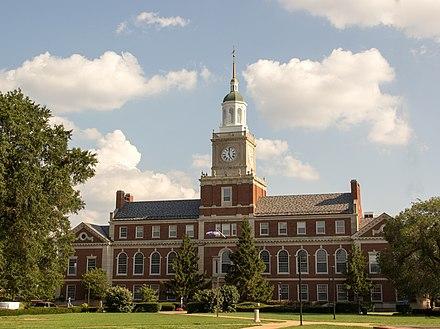
In reply to
@ProfD Your hope in reply lead to a great topic, at least to me. The topic is the purpose of educational institutions in the english colonies to 2022 in the usa.
You have three avenues.White european
Indigenous
Black
White european mass education < meaning schools> was originally for religious teaching. Apprenticeship , was the primary tool for education in the crafts or philosophical arts. The first colleges in the usa had one function, that they all still maintain today, a place where rich white male children can come together and make alliances for the future. ... now going through time, white women gained colleges but they were designed to prepare for wifedom, not working or owning anything. Classes on homelife dominated those schools originally. ... later on whites like woodrow wilson gave the college of new jersey their first academic requirements, which was viewed as radical at that time. That time being the late 1800s early 1900s so.then after world war two, the statian empire through the leadership of FD Roosevelt, made the gi bill so all the male soldiers just finished killing for the empire, were preoccupied with school and financial stipends, not poverty and thoughts of money making through arms. That led to the modern idea of the education system being about self improvement and a way to create a peaceful or positive multiracial society.
Indigenous mass education was originally, absent any native american or indigenous input , meant to eliminate the culture of the native american in the remaining survivors of the native american community. As one navajo poet said, most native american poets don't write in their native tongue, which their traditional culture will allow but , they don't know their traditional culture, and the reason is the schools whites owned , controlled, used to do said purpose. Now in the 1950s, note the time between the first white invading immigrants and the 1950s, native american communities rallied against these institutions, with varying levels of success. I think the last of those schools existed in the 1990s. But, Native americans today, absent money, absent power, absent knowledge are trying to relearn their own culture. A very hard thing to do when everything is against your community. Cause the damage in the past wasn't little.
Black mass or individual education was banned legally or culturally within the usa or the european colonies that preceded it holistically, until the end of the war between the states. Now the Historical Black Colleges and Universities, most of whom were financed by white religious organizations , had two purposes. Religious indoctrination plus craft teaching. The three key leaders to HBCU's in my view is frederick douglass/booker t washington/web dubois. Each black male had four things in common : each was black, male, had positive relations on a personal level with financially wealthy whites, had a strong belief in the ability of education to empower. To the issue here that last point is massive. The HBCU's eventually taught more than physical crafts and started teaching law or chemistry. But, the black leadership of the day, those three men I spoke of, had an idea that black people absent ownership could educate our way into some positive situation. Over time,the white religious groups stopped funding the schools and many fell. But those who survived have within each of them a similar community of black students, like the white students that originally inhabited in majority and still inhabt in minority, the ivy league schools. A black one percent.
Now what does this have to do with HBCU's getting more membership, or the role of affirmative action in the educational system?
The problem is the initial role of educational systems, and how they haven't functionally changed from their original premise.
I am from NYC, Harlem in particular, I know COlombia University very well. I can tell you with certainty that most whites know colombia is a place to connect to the money. Yeah, they want to learn or study. But, the role of colleges is to connect to the money.
Native americans exist in NY state, the cloest tribe is on the tip of long island, a place called montauk. But it isn't like their language or culture is taught in schools.
And I will not speak for any of you... but, I persoanlly know a ton of black matriculated people older than me, my generation, younger than me. Civil engineers/chemical engineers/electrical engineers/physicists/mathemeticians yes... and not just recent immegres from jamaica or nigeria, yes, DOSers, that is right , people descended from black people enslaved in the usa. As a teenager, I knew of black kids in bronx science/brooklyn tech/styvesant, as well as in brandeis... educationally, I don't see anything wrong with the black community. But, the issue isn't education. It isn't even entry. Like myself most black people in NYC didn't get affirmative action to go to school. The issue is the role of the educational system to opportunity. The historical black colleges were not for collections of fiscally wealthy blacks cause too few , I realize when I use absolute words in this forum somebody has to comment I am wrong for being absolute in my words, fiscally wealthy blacks existed. Now today a fiscal black elite exists but they haven't done their part.Before I go into their part, my closing point on education education systems in the usa is, they are not for education. They either serve as gated communities for fiscally wealthy children to keep the money tight/are cultural weapons to annihilate or diminish non white or non white european culture/ or they are for religious cultural teachings that don't respect the fiscal capitalistic reality of the usa. And that is ownership is key, not labor. IF you own, you are the slavemaster. Everybody else is either a slave/overseer/crafts person but everybody else works for you, and at your behest, not cause any from everybody else merits it. It is cause you the owner want them.
Now, to the black fiscal elite.
I don't know how many black people were paid to go to school by a relative who was a financially successful singers/thespians/athlete... but I am 99% certain that said relatives didn't send 90% of their kin to HBCUs.
So, before the fiscally poor black children are asked to go to HBCU's 99% of the fiscally wealthy or attached to fiscally wealthy black children need to go to HBCU's first.And that also provides that investment that is badly needed.
- Show previous comments 1 more
-

@ProfD I think you can write it better yourself. but thank you.
Two reasons,
1. It was away from Nels topic. Nels isn't speaking about the educational system. he is speaking about affirmative action, which was/is applied throughout the bureaucracy. He focused on the issue of college enrollment, but affirmative action also involves municipal labor plus labor in private enterprise. And I wasn't interested in talking about affirmative action much.
2. When I segway away from topic with one of these long winded replies I am used to veering to my personal page. Maybe over time I will feel more comfortable like the rest of you. I Am very new to using forums compared to the rest of you.
-
Got it. I understand your rationale for not posting it in that thread.
Then, I also have to quesion where that guy is coming from in his thoughts on a black discussion forum.
Still, the perspective you've provided on the educational system could be the subject of a new thread. Only if/whenever you feel comfortable putting it out there. Thanks for sharing it.

-

@ProfD thank you
fair enough, I don't know you or nels, but ... I don't question where nels is coming from. I know black people offline who talk the same way. I read black people , in speeches from the time of the war between the states, who spoke similar. It isn't about hating black or ignoring white. But, the philosophy is black accountability overrides white blame. In fairness, the labor of black people in the usa, in the over 150 years since the war between the states ended, explains why said philosophy has prevalence. Most black people in said time frame who achieved a level of success above living: from having a job or surviving military boot camp to being president of the usa or a billionaire,did it as a lone black in a white communal setting. Thus today, most black people offline and in in large number in voice online, have a self accountability mentality. When a black person is not used to having a community to aid or defend them, they have to hold themselves accountable, even from the attacks from whites. It isn't fair but I comprehend. Nels just wants individual or collective accountability no matter what. He isn't alone.
and thank you again.
-
As a writer in a fiscal capitalistic environment, I am, like all other writers, two thing. I am a literary artist plus a commercial artist.
As a literary artist, I am complete. I create literature that I love, that comes from my soul. I make public or keep private what I choose from my creations.
As a commercial artist, I am learning. The selling or buying of art involves factors outside creativity or art. Some of said factors are heritage or culture or financial quality.
In the modern, meaning current, United States of America a culture made in response to historic heritages in said community has become potent in the media industry. In common history of the USA, the historic heritage, media was over ninety nine percent populated by humans who are male-person born with a penis+heterosexual-fornicate with someone who is born with the opposite sexual organ no hermaphrodites+christian-various denominations+white-phenotypical range+european ancestry. Humans who are not in the stated racial group , composed of additives, were less than one percent present in media across all activities. OVer time for various reasons, the cold war desire of the white power of the USA to be accepted by the larger human populace outside the usa over the ussr being the largest one, media in the USA changed at the impetus from its white owners. But , as ever larger money in the USA started being earned by more than just white christian male heterosexuals of european descent, the desire to impose a new media paradigm grew and grew. Said paradigm was and is aided by the growing financial clout of countries outside the USA that are mostly populated by non european or non white or non christian or maybe even mostly female humans.
But what is the culture?
The culture brewed state two position. Panracial integration is mandatory. Those in the stated group <white/male/christian/hetero/european ancestry> are blockaded from depicting those who are not while those who are not can depict those who are <white/male/christian/hetero/european ancestry>.
Why did I make this post?
Not for anything I said prior. Everything I said prior was or is common knowledge or should or shall be common knowledge.
I made this post to state a dysfunction in said culture.
It mirrors the same dysfunction in Brown vs Board of Education.
Can human beings of different races, any racial category, coexist peacefully or functionally? the answer is a simple, historically proven, yes. Multiracial bodies, any racial category, are common throughout humanity.
But, history proves something else. Humans beings can also thrive segregated from each other. Peaceful/functional/positive monoracial bodies, any racial category, are common throughout humanity.
The question in media is? If Valinor doesn't have any Black people , are Black people harmed/injured/insulted? The answer is a simple no.
The tales of Anansi don't include any whites or europeans. Grimms fairy tales don't include any blacks or africans. Neither story collection is lessened by their reality. Neither story requires unrepresented races to be forced through new characters or stories.
The answer isn't how to push black students into a white students only school to get the resources of the white school to be accessed by black students. The answer is to increase the resources of the black students only school to be at least equal to the white students only school.
Was media in the USA an industry that blockaded those who were not male+white+european ancestry+christian+heterosexual? yes.
But, is the wisest response to that past a modernity where said media is forced by external powers to share its resources OR where media that is not owned by male/+white+european ancestry+christian+heterosexual people have greater resources?
As I said in years past, why do Black people not have their own film awards? or moreover, why do Black people not emphasize their own film awards? Miss Juneteenth has began decades ago, but Black women in miss america is still a symbol. Is the goal to have white side black women or is the goal that black women have their own pageants just like white women?
A thought experiment, if every Black college student in the USA never went to any college but a historical black college or university <HBCU>, what will today's collegiate landscape look like? will it be bad in your mind? I argue that Harvard+ Yale +MIT+ Stanford will not be lessened or destroyed or evil if they didn't have black students. In parallel I argue that HBCU's lost their momentum or positive possibility having to compete with the resources of more fiscally potent schools.
Is segregation evil? Is integration good? I argue, the USA or the british colonies preceding it has always been integrated while never segregated. From the first whites of Europe appearing before Native Americans who sadly didn't know what horrors these immigrants will bring to them through white slavemasters houses built on black families bodies or reservations the native americans left alive are forced to live in to NYC today in all of its christian babel likeness, integration has always been in the USA. Segregation has never been now at any time in the USA.
The key is how are the people integrating. Usually it is one master while the others slave or one alive with the others dead. In modernity, one is in power, while the others are not as powerful.
But, the image of power is always most dangerous, when it is a lie. The NAzi's saying they hate everyone else wasn't a lie. It was negative but not a lie. And the USA media lives with lies. We are all equal, we are all a family, a set of loving ones, in the USA... but then we are not. Your white cousin can't portray you, but you can portray them ala Hamilton stage play by mirande side Angelina Jolie playing Mariane van Neyenhoff. Black people of fiscal wealth say they want black unity against white oppression in the usa but most of them finance relatives or friends to go to non Historical black colleges or universities. Lies are dangerous. And media promoting lies leads to greater problems.
In the art world, this means we artists have financial limitations on our craft based on the messages in our work. We artists always have, and always will I think. But, in the USA it is more narrow than in the past, even with a globally connected media.
Discussions of the Blackwood LINK
Post SCript: I will love to write a story about Harad in the lord of the rings universe or Sothoryos in the Song of Ice and Fire universe. The writers to either of the mentioned worlds did include black people, asian people, all people in truth, but they only focused on writing about one part. They didn't have to create a USA in their story.
- Show previous comments 1 more
-

FAT EXCUSE from Maher
-

Fat acceptance to fat celebration is not really ne. It has been around for a long time -- perhaps longer in the Black community. The idea that you can be obese and healthy, which we have accepted today, seems dangerous.
Not a battle I have chosen to fight as people can do whatever they want to do and I'm not prepared to to tell people to exercise and eat well.
I'm not sure this change in our culture is something a person under 40 can relate really appreciate.
-
-
 1
1
-
- Report
-

@Troy hmmm, well, in the history of the USA I argue fat celebration is not common within the indigenous, black descended of enslaved, or white descended of slavers communities. The oldest three communities in the USA. whites suggested the large black mammy warranted celebration or acceptance <ala the black mammy in birth of a nation whipping black union soldiers with a broom> but that wasn't the opinion of blacks themselves. And if you ever see photos of said three communities in the past, being obese or fat wasn't nearly common. Only rich people were fat. I think fat acceptance or fat celebration in the USA are both creations of the 1900s USA, when the USA's wealth and consumption based culture started by the firms took hold. So, is it new? not in my opinion. Not from a larger historical view, in my opinion. Is it standardized in modernity? I think yes.
Communally accepted obesity from before the time of the USA, in Europe for example, was heavily accepted in the arts through european opera.
Yes, it is healthwise always unadvisable to suffer consumption. We forget greed or consumption as words originally referred to unwise intake.
Well, I think your position is in line with the cultural trend that has brewed in the USA since its inception, which is individual accountability. The problem with individual accountability when communities/races/groups battle is individual's problems do not reside solely onto their own actions; they reside with the friction between races. But in modern USA, the personal accountability that was in terms of financial or legal or governmental scenarios dysfunctional or misplaced has true presence in modern USA. In modern USA the hierarchy of races/groups/communities still exist. but, through a complex set of historical reasons, individual accountability is not merely a false strategy that is conveniently uttered as in the past, it is a functional reality. In modern USA, if you are black, you have the individual ability to do. If you are a woman, you have the individual ability to do. If you are indigenous, you have the individual ability to do. IF you are online , you have the individual ability to collate honest news sources. If you are an artist, you have the individual ability to sell and financially profit off your work. If you have any health condition, you have the individual ability to learn and manage your health.
Is anything easy? no. Is anything fair? no. Are some things hurdles beyond your control ? yes. But in the usa, while bias will always exists like throughout all humanity. The reduction of communalism/tribalism/collectivism and the adherence to a mass accepted individualism has occurred in the USA.
Sequentially, your desire not to tell others what to do is part of that mantra, that way of life that more people in the USA adhere to.
And many more people under 40 comprehend this than you think. I am sure of it.
I will end with a strategic point. The great dysfunction in personal accountability was and always will be the reality that communal/racial/tribal disparities will always influence the lives of individuals of the single person and thus, a person can never be totally accountable for the various negative or positive factors in their life. But, how does a populace that in majority accepts and allows for personal accountability handle when a person isn't?
-
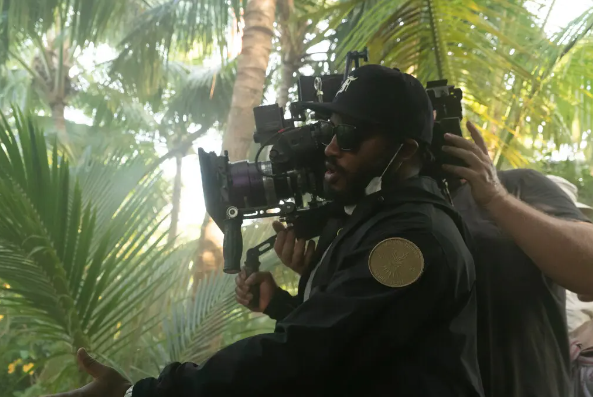
The director Ryan Coogler on the set of “Wakanda Forever.” Does he want to direct more “Black Panther” movies? “I’ll do it as long as folks will have me.”Credit...Annette Brown/Marvel
The ‘Black Panther’ Sequel That Never Was
Writer-director Ryan Coogler and co-screenwriter Joe Robert Cole reveal the original plot for “Wakanda Forever” and discuss working in the Marvel universe.
By Reggie Ugwu
The “Black Panther: Wakanda Forever” screenwriters Ryan Coogler and Joe Robert Cole are just coming up for air. A month after release, the much anticipated follow-up to the original “Black Panther” (2018) is well situated, still screening at more than 3,000 theaters heading into the holiday weekend. The film has received mostly positive reviews from critics and holds the year’s second-highest performance at the box office, after “Top Gun: Maverick.” To date, it has grossed more than $420 million domestically and nearly $800 million overall.
Things could have gone much differently.
“This film was difficult in ways that only the people who made it would know,” Coogler said in a recent interview. “There are things we put in there that felt revolutionary, that challenged the definition of having ‘a good time’ in a movie like this.”
The death of Chadwick Boseman, who played the title role in the original film — a noble but untested leader of the fictional African promised land Wakanda — forced a radical reimagining of the franchise. Coogler and Cole had recently sent Boseman a completed first draft of the script when the actor succumbed to a secret bout with colon cancer.
Their eventual rewrite opened with the death of Boseman’s character, T’Challa, turning the $250 million superhero film that followed into what can be fairly described as an extended meditation on grief and recovery.
In a recent joint conversation over video, the screenwriters discussed their original vision for a “Black Panther” sequel, how they addressed the loss of Boseman, and balancing the demands of their story with those of the broader Marvel Cinematic Universe.
These are edited — and spoiler-filled — excerpts from the conversation.
What was it like collaborating this time?
RYAN COOGLER Last time we went back and forth. Joe had already started when I came on. I think I tried to go for a draft, but I was taking too long and so he jumped in. Then we would get notes from the studio, and we would just kind of divide and conquer. On the second one, we were doing it over the pandemic, so we couldn’t meet up. But Final Draft [the screenwriting software] came out with this update where we could both work in the script at the same time. It was an amazing feature. Very productive, very fun.
JOE ROBERT COLE It allowed us to bridge that feeling of being in a room and just spitballing ideas.
COOGLER Then we took that hit, bro, when Chad passed. I couldn’t believe what was happening. I didn’t know how we were going to pull ourselves up and figure it out. Thank God for Joe and the collaborative process, man. It would’ve been impossible for me to write this thing on my own.
In the initial draft of the script, before Chadwick’s death, how were you looking at the story? What were the challenges?
COOGLER It was, “What are we going to do about the Blip?” [In Marvel’s “Avengers: Infinity War,” T’Challa is one of billions of people who suddenly vanish, only to be brought back by the Avengers five years later.] That was the challenge. It was absolutely nothing like what we made. It was going to be a father-son story from the perspective of a father, because the first movie had been a father-son story from the perspective of the sons.
In the script, T’Challa was a dad who’d had this forced five-year absence from his son’s life. The first scene was an animated sequence. You hear Nakia [T’Challa’s love interest, played by Lupita Nyong’o] talking to Toussaint [the couple’s child, introduced in “Wakanda Forever” in a post-credits sequence]. She says, “Tell me what you know about your father.” You realize that he doesn’t know his dad was the Black Panther. He’s never met him, and Nakia is remarried to a Haitian dude. Then, we cut to reality and it’s the night that everybody comes back from the Blip. You see T’Challa meet the kid for the first time.
Then it cuts ahead three years and he’s essentially co-parenting. We had some crazy scenes in there for Chad, man. Our code name for the movie was “Summer Break,” and the movie was about a summer that the kid spends with his dad. For his eighth birthday, they do a ritual where they go out into the bush and have to live off the land. But something happens and T’Challa has to go save the world with his son on his hip. That was the movie.
Was Namor, the leader of the undersea nation Talokan in “Wakanda Forever,” still the villain?
COOGLER Yeah. But it was a combination. Val [the C.I.A. director, played by Julia Louis-Dreyfus] was much more active. It was basically a three-way conflict between Wakanda, the U.S. and Talokan. But it was all mostly from the child’s perspective.
In the new version, the opening scene is T’Challa’s death. Why did you decide to start there?
COLE Just practically, everyone was going to be waiting to see how we dealt with it, so doing it right up front made sense. In terms of the characters, we needed to introduce a different version of Shuri [T’Challa’s sister, played by Letitia Wright]. We’re showing the moment that she becomes a different person than the person we met. She’s the smartest person in the world, but she can’t save her brother. What does that do to you?
COOGLER We wanted to have an emotionally intelligent conversation. It’s about the transformative quality of grief and trauma. There’s this expectation with emotional trauma that you just need time. “Oh, give them a couple weeks off; they’ll come back to work and get back to it.” But that person is completely different in some ways. You just don’t see it because the change isn’t visible.
T’Challa’s death is attributed to an illness, but it seems sudden and inexplicable, which profoundly unsettles Shuri. Why did you make that choice?
COOGLER We wanted to keep it simple. At the end of the day, what mattered is that she had a self-expectation of being able to be solve it and she failed. And we didn’t want her to have anywhere to displace her anger. If somebody else would’ve taken T’Challa out, Shuri would’ve looked for that person. We wanted it to be a situation where the only place to go was internal.
Julia Louis-Dreyfus’s character has appeared in other Marvel properties and is being set up as a major antagonist in the studio’s future projects, including the “Thunderbolts” movie due in 2024. Is it challenging to incorporate characters or story lines from the broader Marvel Cinematic Universe?
COLE Ryan will have a different perspective as the director, but I’ve never had a conversation where I was asked to incorporate something that didn’t feel organic. The dynamic of the U.S. being an instigator and Western powers being an instigator, that always existed. It wasn’t, “Oh, we need to find a reason to make this character exist.” It was, “Oh, this is already in here and there’s this wonderful actress available.” It always starts from the story and the ideas.
COOGLER Yeah, nobody was shoehorned in or asked to be put into the movie or anything like that. Actually, in this version, [Louis-Dreyfus’s role] was pared back in order to make space for dealing with T’Challa’s death. And we had Val in there before she even appeared in any of the other movies, before “Black Widow” and [the series] “Falcon and the Winter Soldier.” People assume that we were told to put her in, but she was there from the beginning.
Ryan, what’s your appetite to tell more stories in the world of Wakanda?
COOGLER I feel blessed that I have the opportunity to work on these movies, bro. When I got asked to do the first one, it was like a moving train. I thank God every day that I was able to jump on it and meet these people, these actors, and to meet Chadwick during some of the last years of his life. I’ll do it as long as folks will have me. But I think it’s bigger than just me or Joe. Between the first and second movie, we made $2 billion at the box office, which is what matters the most to corporations. So I hope that it continues, man. I hope people are still making movies about Wakanda long after we’re gone.
Reggie Ugwu is a pop culture reporter covering a range of subjects, including film, television, music and internet culture. Before joining The Times in 2017, he was a reporter for BuzzFeed News and Billboard magazine. @uugwuu
URL : https://www.nytimes.com/2022/12/23/arts/ryan-coogler-black-panther-wakanda-forever.html
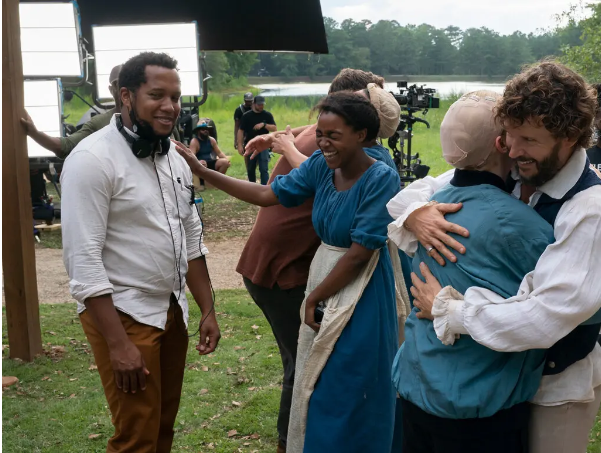
Jacobs-Jenkins, far left, on the “Kindred” set during filming. “In honoring Octavia’s book, I’m trying to find new things to talk about,” he said.Credit...Tina Rowden/FX
‘Kindred’ Creator Wants Viewers to ‘Question Their Assumptions’
In his TV adaptation of the Octavia Butler novel, Branden Jacobs-Jenkins changed parts of the story but kept the author’s focus on “making the familial political.”
By Salamishah Tillet
Dec. 26, 2022
“If a ‘Kindred’ movie is ever made, I wouldn’t be involved,” Octavia Butler wrote in a letter in 2000. “It won’t be my movie, and I suspect it won’t look much like my book.”
It was yet another Butler prediction that was mostly on target, though she was wrong about the format. Adapted by the playwright Branden Jacobs-Jenkins for FX on Hulu, “Kindred” is neither a film nor a completely faithful interpretation of the novel. But it comes at a time when there is more interest in Butler’s body of work than ever before, and in how her prolific writing, mainly science fiction novels, continues to resonate with our world more than 15 years after her death.
“Kindred” is Butler’s most well-known and often-taught novel. Published in 1979, it tells the story of Dana Franklin, a 26-year-old African American writer who repeatedly and unexpectedly travels from 1976 to a mid-19th-century plantation in Maryland. Each time Dana arrives in the past, she finds herself saving the life of Rufus Weylin, her white slaveholding ancestor; she returns to the present only when her own life is at risk.
In a 1988 interview with the literary critic Larry McCaffery, Butler said that “Kindred,” with its blend of genres, periods and antebellum histories, was informed by ideological debates she had during college in the 1960s, about the extent to which slaves should have rebelled against their masters.
Knowing this, Jacobs-Jenkins sought to capture those tensions while updating the story to convey the complexity of our post-Obama racial reality. A lifelong Butler fan, he wanted to turn “Kindred” into a television series as far back as 2010, when he debuted his first full-length play, “Neighbors,” at the Public Theater.
The drama was well regarded, but it was Jacobs-Jenkins’s 2014 Obie-award-winning play, “An Octoroon,” that established him as one of America’s most exciting young playwrights. A satirical adaptation of Dion Boucicault’s “The Octoroon,” a 19th-century melodrama about the tragic love story between a European-educated white plantation owner and the play’s titular character, an enslaved woman, the play inspired critical raves and hot ticket sales. In his review for The New York Times, Ben Brantley wrote that its success “seemed to confirm the reputation of its author as one of this country’s most original and illuminating writers about race.”
Even then, Jacobs-Jenkins remained committed to “Kindred.” In 2015, he persuaded Courtney Lee-Mitchell, the rights holder of the novel, that it should be a television series and not a movie as previously imagined by other potential producers and even by Butler herself. The decision to stretch the story over multiple seasons has drawn some criticism. (All eight episodes of Season 1 are available on Hulu, but the series has not yet been renewed.)
Nevertheless, Jacobs-Jenkins hopes that his expansion of the novel’s universe encourages more people to discover Butler’s writing for themselves.
“After watching this, I want people to question their assumptions about what they think they know about history, about themselves,” he said. “I want them to read Octavia’s work.”
In a video interview earlier this month, Jacobs-Jenkins talked about his introduction to Butler’s writing, the motivations behind some of his changes to her story and why he thinks television and theaters need even more stories about slavery. These are edited excerpts from that conversation.
When did you first come in contact with “Kindred”?
My relationship with Butler preceded my engagement with “Kindred.” I was one of those kids reading Stephen King on the playground for no good reason, and Ray Bradbury’s novels were important transitional objects for me too. I was like 12 or 13 when I had a babysitter who went to Howard, who was a Black nerd, too. She told me, “You should read Octavia Butler.” So I started with her Patternist series. And when I got to college, I read her on an African American studies syllabus and remember thinking, Oh, this person I read for fun is important academically. That is also when I learned of “Kindred,” which was oddly one of my later introductions to her work.
Before, when I was reading her, it felt very much still like a secret; it felt good to be a part of that weird underground. And now, she’s been mainstreamed in this gigantic way.
How did this adaptation come about?
Slavery is the material of my creative life. I remember becoming obsessed with the visual work of Kara Walker, Glenn Ligon and Kerry James Marshall and wondered why they were so ahead of theater. So back then, I said, I’m going to deep-dive these people, and I’m going to write a play based on my deep dive. I just inhaled whatever their discourse was and tried to translate it into a theater space. And the truth is, my creative life is also ultimately guided by fandom on some level, and I remember rereading “Kindred” in 2010 and thinking, This is a TV show. It was a eureka moment.
I immediately started figuring out how to get the rights. It had been under option since 1979 because people kept trying to make a movie out of it. And I was like, It’s not a movie. Because the whole book is about the experience of time’s passage and watching people transform, witnessing their development, growth, decay and shift of their allegiances. It took six years for me to get the rights, and then my task became trying to translate it and ultimately peel back the layers for people.
Speaking of time passages, her novel was set in 1976 to coincide with the bicentennial year of the Declaration of Independence. Why did you set the series in 2016?
Along the way, I became very friendly with Merrilee Heifetz, Butler’s literary executor and her lifelong agent. One of the things she said to me was, “Octavia would’ve wanted you to make this for now.” So I took that to heart. I think 2016 was that last gasp of naïveté about how we had processed the legacies of this racial regime that the country’s founded on. Do you remember the day after Obama was elected, suddenly, there was a discussion of a phrase called post-race? I remember asking, “What is that?” I also think because people did not see the results of the 2016 [presidential] election coming, we suddenly felt like we were backsliding as a country. “Kindred” was the ultimate metaphor for that, too.
Another surprising change was your inclusion of her mother as a major character. What inspired that story line?
Merrilee also told me that Octavia referred to this book as one she never quite cracked. That interested me because this is her most widely read and known book, and that also sent me to her archives, which had just been cataloged at the Huntington Library.
I read every draft of “Kindred,” and there are ones in which she experimented with this mother figure. In her canon, she’s obsessed with mothers. I don’t want to be psychoanalyzing another artist, but her relationship with her mother was very complicated. Merrilee told me once that she would say, “Octavia, I want you to write a memoir.” And she would say, “I’ve already written a memoir; it’s called ‘Kindred.’”
Unlike many other contemporary representations of enslaved people in television and film, Dana is not by herself. She has a community in each of her periods to help her. Why was this important to portray?
I think Octavia was obsessed with family. I mean, it’s called “Kindred,” and it is about making the familial political. My approach was to always think of what she was doing and try to echo or expand on that universe — I took all my cues from her, except for setting it in 2016. At the same time, she was always trying to understand why tribalism exists, why genes are so varied as a concept, how they’re weaponized to oppress people and what oppression ultimately is rooted in.
Dana has to make some hard choices for herself and often risks the lives of other enslaved African Americans to ensure that she continues to exist in the present. How did you approach bringing her moral ambiguity to the screen?
That’s an essential part of the book, and I think that’s what makes Dana interesting. Most folks are not participating in active insurrection but are fighting in small ways to maintain their agency. This is driven home in Dana, who says to herself: “Wait a minute, to ensure my existence, I have become someone who might destroy or erase the existences of countless people. I want to be perceived as good, and I want to think that my goodness will rub off on Rufus too.” But playing both sides isn’t how justice happens. You wind up being morally compromised in all your actions if you are still thinking about yourself. That’s the interesting challenge she has to negotiate.
Why did you think a multi-season arc was best for this story versus adapting it as a single-season limited series?
I just didn’t think you could do this book in eight hours. It’s about being with people over time and really feeling these tectonic shifts in their personhood. I thought the idea of squeezing in six different actors for Rufus would have felt like a party trick. I’m sure that someone out there could have made that thing, but I just really wanted to give us the fullest canvas I could to tell the story.
Do you ever worry that audiences will grow weary of stories on slavery?
There is this interesting quota that we all want to put on stories about slavery, and I think that question is often asked only of Black creatives. There are a thousand shows on the air about rich white families doing evil sympathetically, and no one puts a quota on that. I think it’s interesting that there’s this desire to police any storytelling about a creative’s history. I mean, this is my history and my family history.
I also think people are worried, afraid of, or sick of the tropes and stereotypes that come with this work and are waiting for the familiar scene in which some female enslaved person is raped or someone is tied to a pole or a tree and whipped. But in honoring Octavia’s book, I’m trying to find new things to talk about. We should never stop telling these stories, especially when people try to erase them from history books.
Salamishah Tillet is a contributing critic at large for The Times and a professor at Rutgers University. She won the Pulitzer Prize for criticism in 2022, for columns examining race and Black perspectives as the arts and entertainment world responded to the Black Lives Matter moment with new works. @salamishah
- Show previous comments 1 more
-

Thanks for sharing Kindred should have just been a movie. It feels dragged it. Learning that it is supposed to go more than 1 season. It just does not make sense to me.
I’ve watched the first 5 episodes and I’m not feeling it at all…
The Black Panther details were interesting. I wonder why no one even considered just getting another actor to play Black Panther If multiple actors can play Superman and James Bond someone new could have played T’Challa — maybe even better.
-
-
 1
1
-
- Report
-

@Troy my pleasure , but from my own fringe experience , the reason kindred is a series not a film is the money. Netflix didn't feel kindred better served netflix as a film over a multi season show. I think the answer to the last question is the reality for all slavery dramas. they are hit or miss, many black people, some in this sites forums have a no want policy to anything involving slavery in a plot. These shows will always be hit or miss.
You make another valid point, all I want to say is, I would had not recast tchalla, but my reasons are from my views towards media. I am tired of the recast I am tired of the immortal character. The comic book industry in the usa and the film industry in the usa despise letting characters die, letting stories move on and I like the fact that they let a character die. The actor died and they let the character die, lets move on. I admit , I was very saddened when milestone comics rebooted all their characters. I despise reboots or recasts, move on. Having said that, if they would had recast tchalla, I would not had been sad. It would had been the normal in media. And that is fine, not my liking, but fine. and someone else may have played tchalla better. In defense James Bond has been killed and the next 007 film will not have bond. And I think the reality is, superman since the end of christopher reeves has been knocked recast after knocked recast.
-
All of these people who are making comic books into movies are functionally retarded, liars, bad people, and have wicked intent, they are using these traits to manifest their political based desires as a profit. While actively disrespecting the source material, and continuously disrespecting the readers of that source material, in multiple ways.
-
-
 1
1
-
- Report
-
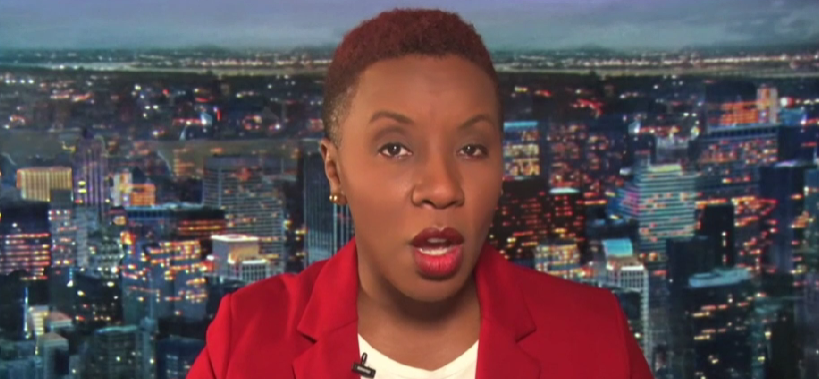
I am Vanessa Guillen
My thoughts are after the transcript
Metrofocus video
https://www.thirteen.org/metrofocus/2023/01/metrofocus-january-3-2023-08ecys/
Full Documentary
https://www.univision.com/especiales/noticias/2022/i-am-vanessa-guillen
DESCRIPTION
In April 2020, U.S. Army Spc. Vanessa Guillén was murdered after reporting her assault that took place at Fort Hood in Texas. In late November 2022, Cecily Aguilar, the only person charged in connection with Vanessa’s murder, pled guilty to four counts, including accessory to murder after the fact, and now faces up to 30 years in prison. While this decision is a victory for Vanessa’s family, the problem of sexual harassment and assault, as well as retaliation for those reporting these crimes, remains a major issue in our armed forces. A documentary, available to stream on Univision.com called #IamVanessaGuillen, covers the issue of sexual violence in our military and tells Vanessa’s story, including how her situation inspired countless others to share their own stories of abuse and push for change in the military. Joining us to discuss the film are producer and director Andrea Patiño Contreras; and Karina López, a military sexual assault survivor.
TRANSCRIPT
TONIGHT, A MAJOR UPDATE ON THE MURDER OF VANESSA GUILLEN, THE ARMY SOLDIER WHOSE DEATH INSPIRED THOUSANDS TO SHARE THEIR STORY OF THE SEXUAL VIOLENCE IN THE MILITARY.
WE REVISIT, THE CASE, THE DOCUMENTARY TELLING THE STORY.
'METROFOCUS' STARTS RIGHT NOW.
♪
> THIS IS 'METROFOCUS,' WITH RAFAEL PI ROMAN, JACK FORD, AND JENNA FLANAGAN.
> 'METROFOCUS' IS MADE POSSIBLE BY -- SUE AND EDGAR WACHENHEIM III, THE PETER G. PETERSON AND JOAN GANZ COONEY FUND, BERNARD AND DENISE SCHWARTZ, BARBARA HOPE ZUCKERBERG, THE AMBROSE MONELL FOUNDATION.
AND BY --
> GOOD EVENING, AND WELCOME TO 'METROFOCUS.'
I'M JENNA FLANAGAN.
JUST A FEW MONTHS AGO WE BROUGHT TO YOU POWERFUL STORY OF VANESSA GUILLEN, THE U.S. ARMY SOLDIER MURDERED AFTER REPORTING THE SEXUAL HARASSMENT SHE ENDURED AT FT. HOOD IN TEXAS.
HER DEATH INSPIRED COUNTLESS OTHERS TO SHARE THEIR STORY OF SEXUAL VIOLENCE AND PUSH FOR CHANGE IN THE MILITARY.
PROSECUTORS SAY GUILLEN'S KILLER TOOK HIS OWN LIFE BEFORE HE COULD BE BROUGHT TO JUSTICE.
ONLY ONE PERSON, THE KILLER'S GIRLFRIEND, WAS CHARGED WITH A CRIME IN THIS CASE E CECILY AGUILAR.
SHE ADMITTED TO HELPING DISPOSE OF GUILLEN'S BODY.
SHE FACES UP TO 30 YEARS IN PRISON.
WHILE THIS IS A VICTORY FOR VANESSA'S FAMILY, THE PROBLEM OF SEXUAL HARASSMENT AND ASSAULT AS WELL AS RETALIATION FOR THOSE REPORTING THESE CRIMES REMAINS A MAJOR PROBLEM AND ISSUE IN OUR ARMED FORCES.
THE DOCUMENTARY ' #I AM VANESSA GUILLEN' EXAMINES THESE ISSUES AND IS STREAMING ON UNIVISION.COM.
HERE'S A QUICK LOOK FOLLOWED BY MY INTERVIEW WITH THE FILM'S DIRECTOR AND ONE THOSE IN THE FILM.
IT WAS A VERY NERVOUS VOICE.
SHE SAID SOMETHING HAPPENED AND NO ONE WAS BELIEVING HER.
SHE DID NOT KNOW, AND SHE WAS CON CON CON CONTEMPLATING HURTING HERSELF.
I DIDN'T KNOW HOW TO FEEL SAFE.
I DIDN'T KNOW ANYTHING.
A PART OF ME DIED BECAUSE SOMEBODY DECIDED TO DO THIS TO ME, AND NOBODY WANTED TO LISTEN.
I REPORTED IT AND I FOUGHT AND I'VE GONE THROUGH THE TRAUMA AND THE RETALIATION THAT I FACED AND NOW YOU HAVE A MISSING SOLDIER THAT WAS HARASSED.
I WROTE MY STORY AND PUT MY PICTURE BESIDES VANESSA BECAUSE I WAS VANESSA.
I AM VANESSA.
I AM VANESSA GUILLEN IS A HASHTAG GOING VIRAL HIGHLIGHTING SEXUAL ASSAULT AND HARASMENT WITHIN THE MILITARY.
AT FT. HOOD, A SOLDIER GONE MISSING.
THEY CREATED AN ENVIRONMENT THAT CONTRIBUTED TO SEXUAL ASSAULT, EVEN MURDER.
THE ENVIRONMENT AT FT. HOOD WAS PERMISSIVE.
WE'RE JUST LIKE ANY ORGANIZATION.
WE'RE ALL ABOUT MAKING OURSELF BETTER.
BECAUSE THE MESSAGE AND CULTURE IN THE MILITARY HAS BEEN CLEAR -- SHUT UP, SUCK IT UP, AND DON'T ROCK THE BOAT.
IN THE CIVILIAN WORLD, PROSECUTORS MAKE THE DECISION TO PROSECUTE, AND THE MILITARY NONLAWYER COMMANDERS MAKE THAT DECISION.
90% OF SEX OFFENDER IN THE MILITARY WILL NEVER BE HELD ACCOUNTABLE.
AFTER 246 YEART TIME FOR CONGRESS TO GIVE THE MEN AND WOMEN SERVING OUR NATION A JUSTICE SYSTEM WORTHY OF SACRIFICES.
YOU MEMBERS OF CONGRESS, YOU NEED TO PASS THIS LEGISLATION.
JUSTICE!
WHEN DO WE WANT IT?
NOW!
I REALLY FEEL LIKE WE'RE ON THE VERGE OF SUCCESS.
WE'RE GOING TO REFORM THIS SYSTEM AND WE'RE GOING TO GET TO A BETTER PLACE.
THE WOMEN VETERANS YOU ENCOUNTER HAVE THE ABILITY TO ADAPT AND OVERCOME BECAUSE THAT'S WHAT WE HAVE BEEN TAUGHT.
BUT HERE'S THE THING -- YOU'VE CREATED A WOMAN WHO IS UNSTOPPABLE.
JOINING ME NOW TO DISCUSS THIS POWERFUL NEW DOCUMENTARY IS THE FILM'S DIRECTOR AND PRODUCER, ANDREA CONTRAERAS, THANK YOU FOR JOINING US.
I'D LIKE TO INTRODUCE KARINA LOPEZ, A SURVEVETERAN AND SURVI THE SEXUAL ASSAULT.
SHE'S THE CREATOR OF THE VIRAL HASHTAG #I AM VANESSA GUILLEN, WHICH INSPIRED THE FILM'S TITLE.
LADIES, THANK YOU TO P 'METROFOCUS.'
THANK YOU FOR HAVING US.
ABSOLUTELY.
I WANT TO START BY ASKING ANDREA, YOU, THE QUESTION I ASK ALL DIRECTORS, AND THAT WAS WHAT MOTIVATED TO YOU CREATE THIS DOCUMENTARY.
WHAT WAS, YOU FELT, THE NARRATIVE THAT WAS NOT ALREADY OUT THERE?
SO, DURING 2020, OUR TEAM AT UNIVISION HAD BEEN COVERING THE DISAPPEARANCE AND MURDER OF VANESSA GUILLEN, WHO WENT MISSING AT THE FT. HOOD BASE IN APRIL OF 2020, AND LATER HER BODY WAS FOUND.
DURING THAT REPORTING, THE FALLING ONES, WE HEARD FROM A COUPLE OF CASES, KARINA INCLUDED.
SHE REACHED OUT TO US TELLING US HER STORY, AND AT THAT POINT IN THE FALL OF 2020, WE HEARD FROM HER, AND IN DECEMBER OF 2020, I DECIDED TO FLY DOWN TO MEET HER.
AND ONCE WE MET, I KNEW RIGHT AWAY THAT WE -- THERE WAS A REALLY IMPORTANT STORY TO BE TOLD.
I WAS VERY STRUCK BY KARINA'S -- I TELL HER THIS ALL THE TIME -- BY HER INCREDIBLE ABILITY TO ARTICULATE HER FEELINGS AND REALLY EXPLAIN TO ME WHAT THAT WAS THROUGH AND KIND OF VERY COMPLEX -- YOU KNOW, IT'S A VERY TRAGIC SITUATION, BUT ALSO HAS REALLY DEEP AND GRAVE CONSEQUENCES FOR MENTAL HEALTH, YOU KNOW, AND KARINA, THE WAY SHE ARTICULATED THAT TO ME STRUCK ME.
SO I CAME BACK FROM THAT TRIP AND KNEW THERE WAS A REALLY IMPORTANT STORY TO TELL, NOT JUST ABOUT SEXUAL VIOLENCE AND THE LACK OF ACCOUNTABILITY, BUT ALSO THE HUGE IMPACT AND LACK OF JUSTICE HAS ON SURVIVES.
THAT'S WHY I WANTED TO TELL THIS STORY.
FRONT AND SENTER THE STORY OF SUR SURVIVES.
KARINA IS THE MAIN BUT THERE'S ALSO OTHERS.
AND ALSO TELL THE STORY OF THE LEGISLATIVE CHANGES THAT TOOK PLACE BECAUSE OF VANESSA'S CASE.
IN PART BECAUSE OF KARINA'S HASHTAG, MANY CAME FORWARD.
MANY CHANGES TOOK PLACE.
THERE'S SO MUCH MORE TO DO, BUT SOME THINGS HAPPENED THAT WERE PRISS UNPRECEDENTED.
KARINA, I WANT TO BRING YOU IN AND GET YOUR TAKE ON WHAT WAS ABOUT ABOUT VANESSA'S STORY THAT RESONATED AND MADE IT CLEAR NOW IS THE TIME TO SPEAK UP?
I THINK WHEN I ORIGINALLY HEARD ABOUT HER CASE ALL I HAD KNOWN IS SHE WAS MISSING AND THE DAYS KEPT GOING WHERE YOU WOULD SEE HER FACE AND YOU WOULDN'T -- THERE WASN'T REALLY AN EXPLANATION AS TO WHY SHE WAS MISSING.
WHEN I TWRAEACTUALLY LOOKED UP STORY, SO MANY THINGS DIDN'T MAKE SENSE.
I WAS LIKE, THERE HAS TO BE MORE COVERAGE.
A COUPLE DAYS INTO IT I REALIZED I DIDN'T LOOK AT THE SPANISH SECTION OF THE NEWS AND MAYBE I'LL FIND SOMETHING THERE, AND THAT'S WHEN I -- WHEN I HEARD HER MOM SAY THAT SHE WAS SEXUALLY HARASSED AND NOW SHE'S MISSING AND SHE WANTS ANSWERS.
AND TO ME IT FELT LIKE A TON OF BRICKS JUST FELL ON TOP OF ME BECAUSE THIS WASN'T BEING SAID, YOU KNOW, IN THE ENGLISH MEDIA.
AND IT JUST MADE ME SO ANGRY.
I REMEMBER JUST SO MANY EMOTIONS, AND I STARTED, YOU KNOW, LOOKING AT EVERYBODY.
I STARTED TRYING TO GET IN TOUCH WITH THE RIGHT PEOPLE THAT COULD LISTEN AND COULD UNDERSTAND THAT THIS -- YOU KNOW, WHAT HAPPENED TO HER WAS NOT AN INDIVIDUAL THING.
IT HAPPENED ALL OF THE TIME AND, YOU KNOW, MORE SPECIFICALLY, MY CASE AND HOW I HAD JUST LEFT AND I WAS FORCED OUT OF MY CAREER BECAUSE I WAS SPEAKING UP ON THIS, AND IT HAD GONE SO BAD AND CHAOTIC THAT, YOU KNOW, CONGRESS HAD TO GET INVOLVED IN MY CASE.
SO IT WAS ONE OF THOSE THINGS THAT, YOU KNOW, I WAS ANGRY, I WAS SENDING, YOU KNOW, THE FAMILY -- MORE SPECIFICALLY THE SISTERS, YOU KNOW, MY STORE, AND IT JUST, YOU KNOW, WASN'T REACHING THEM, WHICH I UNDERSTAND, YOU KNOW, WHY.
THERE WAS PROBABLY SO MANY MESSAGES COMING IN THERE IN BOXES AND TO THEM.
AND YOU KNOW, I -- I WAS LIKE, OKAY, I'M GOING TO PUT IT ON FACEBOOK, AND I'M GOING TO COME FORWARD AND SEE WHAT HAPPENS WHEN IT'S OUT THERE.
YOU KNOW, BECAUSE THIS ISN'T -- YOU KNOW, MANY PEOPLE DON'T UNDERSTAND -- ESPECIALLY CIVILIANS DON'T UNDERSTAND WHY YOU CAN'T COME FORWARD, AND YOU THINK THAT WHEN SOMETHING TRAUMATIC HAPPENS LIKE THAT THAT YOU'RE SAFE IF YOU GO TO THE RIGHT PEOPLE.
HOWEVER, THAT'S REALLY NOT THE CASE.
YOU CAN HAVE ALL THE RIGHT PEOPLE, AND THOSE RIGHT PEOPLE, THOSE DOORS ARE SHUT ON THEM TO PROTECT YOU.
AND THE RETALIATION THAT COMES IS -- IS -- IS HORRIFYING SO, YOU MIGHT AS WELL JUST STAY QUIET AND JUST ENDURE EVERYTHING IN SILENCE.
YOU KNOW, IT'S -- IT'S A VERY SCARY THING TO GO THROUGH, AND I THINK PEOPLE NEEDED TO UNDERSTAND THAT AND SEE THAT MORE SPECIFICALLY THROUGH MY STORY, BECAUSE I CAME FORWARD AND I HAD MOMENTS WHERE, SHOULD I HAVE COME FORWARD?
MAYBE I WOULD STILL HAVE MY CAREER IF I DIDN'T, AND I WOULD JUST GET MENTAL HEALTH SERVICES BEHIND THE SCENES, BEHIND, YOU KNOW -- BEHIND EVERYONE'S BACK AND JUST TOOK CARE OF IT THAT WAY.
YOU KNOW, WHO KNOWS?
ANDREA, I WANT TO GO BACK TO YOU, BECAUSE WE DID SHOW OF COURSE A CLIP FROM THE FILM, AND WE ALWAYS DEFINITELY WANT PEOPLE TO WATCH THE FULL DOCUMENTARY, BUT CAN YOU TELL US, JUST FILL IN FOR PEOPLE WHO MIGHT NOT BE AWARE OF VANESSA'S STORY, WHO WAS SHE, AND WHAT DO WE NOW KNOW HAPPENED TO HER?
YEAH, SO VANESSA WAS A LATINA SOLDIER.
SHE WAS STATIONED AT FT. HOOD IN TEXAS.
SHE STARTED, AND SHE WAS VERY EXCITED TO JOIN THE MILITARY.
HER FAMILY SAYS SHE WAS JUST VERY PROUD TO SERVE.
HER FAMILY IS AN IMMIGRANT FAMILY.
THEY'RE MEXICANS, OF MEXICAN DES DESCENT, AND I THINK SHE SAW THIS AS AN OPPORTUNITY TO SERVE HER COUNTRY AND WAS JUST VERY PROUD.
AT SOME POINT, VANESSA CAME HOME AND HER MOM NOTICED SHE WAS A LITTLE OFF, WASN'T SLEEPING, JUST SEEMED REALLY OFF TO HER, AND WHEN SHE ASKED HER WHAT WAS HAPPENING, VANESSA WOULDN'T TELL HER.
EVENTUALLY SHE TOLD HER SHE WAS BEING SEXUALLY HARASSED BY A SARGENT, BUT SHE DIDN'T WANT TO REPORT IT BECAUSE SHE WAS AFRAID OF RETALIATION.
FAST FORWARD A FEW MONTHS, AND VANESSA GOES MISSING IN APRIL OF 2020.
INITIALLY -- YOU KNOW, THE FAMILY KNEW RIGHT AWAY THERE WAS SOMETHING WRONG WITH THAT, BECAUSE THEY WERE A VERY TIGHT KNIT FAMILY AND NOT HEARING FROM VANESSA WAS JUST REALLY OFF TO THEM.
THEY WENT TO THE BASE.
THEY WERE NOT GETTING A LOT OF ANSWERS.
THEY WERE, YOU KNOW, KIND OF KEPT -- PUSHED AWAY IN SOME WAYS.
BUT THEY WERE VERY, VERY PERSISTENT.
THEY WERE JUST DEMANDING ANSWERS.
AND EVENTUALLY, HER BODY WAS FOUND, AND WE KNOW THAT SHE WAS MURDERED BY SOMEONE IN HER UNIT.
WE KNOW THAT HE WASN'T THE PERSON THAT WAS HARASSING HER NECESSARILY, BUT THERE'S STILL A LOT OF ANSWERS THAT NEED TO BE -- TO BE CLEARED OUT, AND THE FAMILY'S STILL WAITING FOR A LOT OF ANSWERS.
AND THROUGHOUT THAT SEARCH, YOU KNOW, WITH KARINA'S HASHTAG WHEN VANESSA WAS STILL MISSING THOUSANDS OF PEOPLE CAME FORWARD WITH THEIR OWN STORY OF HARASMENT AS WELL.
KARINA, I WANT TO GO BACK AND GET YOU TO EXPLAIN A LITTLE BIT FOR SO MANY OF US WHO ARE CIVILIAN, WHAT IS THAT MILITARY CULTURE LIKE THAT PUSHES, MAYBE COERCES, MAYBE EVEN DEMANDS THAT WOMEN WHO ARE SERVING REMAIN QUIET ON AN ISSUE LIKE THIS?
THAT'S THE QUESTION I GET FROM A LOT OF PEOPLE, AND I THINK -- I DON'T THINK THAT THERE'S A REALLY GOOD ANSWER TO IT.
I THINK, FOR EXAMPLE, BEFORE I JOINED MY FAMILY SAT DOWN AND TALKED TO ME ABOUT WHAT IT'S LIKE TO BE A WOMAN AND WORK IN A MALE FILLED INDUSTRY, AND THEN ME AS A MINORITY AS A WOMAN, ESPECIALLY BEING 19 YEARS OLD, BECAUSE I WAS 19 AT THE TIME.
AND THEY WENT THROUGH, YOU KNOW, DIFFERENT THINGS THAT COULD BE ISSUES.
YOU KNOW, THEY TOLD ME THAT I WAS VERY NAIVE, I WAS VERY YOUNG, AND YOU KNOW, THEY WANTED TO MAKE SURE I WAS SET UP FOR SUCCESS WITH KNOWING THINGS LIKE THIS.
I REMEMBER MY FAMILY SHOWED ME THE LIVEINA JOHNSON CASE AND I REMEMBER THINKING, YOU KNOW, THEY'RE STILL FIGHTING FOR THIS.
BUT THAT WAS THE ONLY CASE I REMEMBERED.
BUT THE STATISTICS OF THAT HAPPENING TO ME WERE PRETTY LOW.
HER FAMILY IS STILL FIGHTING FOR ANSWERS.
THEY'RE GOING TO GET THOSE ANSWERS.
I WAS VERY I WAS VERY NAIVE, VERY -- I HAD A LOT OF TRUST IN THE SYSTEM.
I WAS LIKE, I'M GOING TO DO THIS.
I'M GOING THE GO SERVE MY COUNTRY.
I'M SUPEREXCITED ABOUT IT.
THERE'S GOING TO BE A LOT OF OPPORTUNITIES.
I'M NERVOUS.
AND YOU KNOW, I REMEMBER BEING IN BASE, GOING THROUGH I.T., GOING THROUGH THE MILITARY PROCESS.
I REMEMBER JUST HOW MANY FEMALES PULLED ME ASIDE AND GAVE ME ADVICE OR TOLD ME TO STAY AWAY FROM A SPECIFIC PERSON OR, YOU KNOW, JUST SOMETHING THAT KIND OF -- THEY WERE DOING THE BEST THEY COULD TO GIVE ME ADVICE, BUT, YOU KNOW, TO A 19-YEAR-OLD, A 20-YEAR-OLD, YOU'RE JUST LIKE, THAT'S SO WEIRD THAT THAT PERSON HAD TO COME AND TELL ME AND GIVE ME THAT ADVICE IN THE FIRST PLACE.
I REMEMBER HAVING THIS REALLY, YOU KNOW, BEING SEXUALLY HARASSED IN ONE SPECIFIC INCIDENT IN KOREA, AND I DIDN'T KNOW WHAT TO DO.
I FELT LIKE I WAS, YOU KNOW, SUFFOCATING AND I WAS BLOCKED INTO A KITCHEN.
AND I REMEMBER GOING TO AN NCO, A FEMALE NCO AND I TOLD HER HOW I FELT BECAUSE I DIDN'T KNOW WHAT I WAS FEELING.
AND SHE TOLD ME -- SHE GAVE ME ADVICE AND SHE WAS LIKE, YOU KNOW -- SHE WAS BACKING ME UP THE FULL TIME AND TOLD ME HOW TO HANDLE SITUATIONS LIKE THAT, AND SHE MADE ME CONFRONT HIM AND TELL HIM THAT WAS UNACCEPTABLE AND JUST STAND UP FOR MYSELF.
SO WHEN THIS HAPPENED ON FT.
HOOD AND I THOUGHT THAT I COULD DO EXACTLY THAT, THAT I WAS SHOWN HOW TO DO IT AND I WOULD GET HELP IN MY SITUATION, AND I WAS INSTEAD REDIRECTED AND GUIDED TO NOT GET THAT HELP AND INSTEAD TO JUST STAY QUIET ABOUT THAT BECAUSE THE BASE DIDN'T -- THE UNIT DIDN'T NEED EYES ON -- OR EXTRA ATTENTION ON THE UNIT.
I KIND OF FELT ASHAMED.
I FELT LIKE I COULDN'T STAND UP FOR MYSELF.
I HAD ALWAYS BEEN THAT 19-YEAR-OLD THAT WAS LIKE, IF THIS EVER HAPPENS I'M GOING TO STAND UP FOR MYSELF, I'M GOING TO FIGHT BACK.
NO ONE'S GOING TO BE ABLE TO DO THAT.
THAT STARTED THAT INNER WAR WITH MYSELF WHERE I DIDN'T -- I FAILED MYSELF, BECAUSE HERE I WAS, YOU KNOW, LETTING THEM WIN AND INTIMIDATE ME AND KEEP ME SILENT, AND I FELT UNSAFE, AND THEN ON TOP OF THAT I DIDN'T KNOW HOW TO -- MY FAMILY MEMBERS WERE THE ONES WHO TOLD ME ALL OF THIS, SO THEN I FELT COMPLETELY SHATTERED, BECAUSE THAT 19-YEAR-OLD GIRL WHO WAS TELLING THEM, I WILL STAND UP AND FIGHT FOR MYSELF AND I'LL DO WHAT'S RIGHT, AND, YOU KNOW, THEY'LL HAVE TO HELP ME.
NOW IT'S THE OPPOSITE.
SO WHEN SOMETHING HAPPENS LIKE THAT, YOU GET -- IT'S THE SUBJECT THAT'S EXTREMELY HEAVY.
SO EVEN IF YOU DO TELL THE RIGHT PEOPLE, THEY DON'T KNOW REALLY HOW TO APPROACH THE SITUATION AND THEN ON TOP OF THAT IF YOU GO TO THE WRONG PEOPLE, THE WRONG PEOPLE DON'T WANT TO YOU ACKNOWLEDGE IT AT ALL.
IT'S YOUR FAULT AND THAT'S IT.
EVEN WHEN I STARTED RECEIVING MENTAL HEALTH SERVICES, I HAD BEEN TOLD IT WAS MY FAULT.
YOU START REALLY BATTLING YOURSELF, AND I THINK ULTIMATELY THAT'S HOW THEY KIND OF WIN, BECAUSE THEY TARGET -- THEY MAKE YOU QUESTION YOURSELF.
YOU'RE NOT QUESTIONING THEM.
IF YOU'RE QUESTIONING THEM YOU'RE LIKE, NO, I KNOW WHAT HAPPENED TO ME, AND THAT'S WRONG.
BUT ONCE YOU HEAR IT ENOUGH AND YOU'RE IN THAT FRAGILE STATE OF MAYBE THIS WASN'T -- YOU KNOW, MAYBE THIS WASN'T THEIR FAULT.
MAYBE THIS WAS MY FAULT.
WHAT DID I DO WRONG?
YOU'RE RETRACKING AND GOING THROUGH THE PROCESS OF, OKAY, IT HAPPENED HERE, BUT WHAT DID I DO THAT LED ME TO BE PUT INTO THE SITUATION?
WELL, IT'S SOUNDING A LITTLE BIT LIKE PERHAPS ISSUES OF HIERARCHY AND CHAIN OF COMMAND ARE ALSO COMING INTO PLAY WITH YOU AS A 19-YEAR-OLD RECRUIT.
FOR THE NONSERVING CIVILIAN AUDIENCE, JUST VERY QUICKLY CAN YOU JUST LET EVERYBODY KNOW, SO THEY FULLY UNDERSTAND, WHAT EXACT LY IS AN NCO?
THE NCO IS BASICALLY THE -- THEY'RE KNOWN AS THE BACKBONE OF THE ARMY, OR THE MILITARY IN GENERAL.
THEY HAVE SERVED FOR SOME TIME.
THEY'VE GONE THROUGH THE BASIC LEADERSHIP SCHOOLS, AND THEY HAVE THAT RANK.
SO THEY'RE THE ONES THAT ARE PUT IN CHARGE OF THE LOWER ENLISTED SOLDIERS SOME BASICALLY THEY ARE A FORM OF LEADERSHIP.
THEY ARE SOMEONE YOU REPORT TO AND HELP YOU --
OKAY, AND DOES THAT STAND FOR SOMETHING?
I JUST WANT TO MAKE SURE PEOPLE ARE LIKE, OH, THAT'S WHAT NCO IS.
YES, NONCOMMISSIONED OFFICER.
MY SECOND QUESTION IS ALSO -- YOU DO KEEP GOING BACK TO YOUR AGE, AND ONE THING I THINK EVERYONE CAN RELATE TO IS BEING A 19-YEAR-OLD AND THINK YOU UNDERSTAND BUT NOT FULLY UNDERSTANDING THE WORLD YOU'RE STEPPING INTO.
HOW LONG AFTER YOU GOT TO FT.
HOOD DID YOUR ASSAULT HAPPEN?
AND I KNOW THAT YOU SORT OF TOUCHED ON IT, BUT AS MUCH AS YOU CAN SHARE, CAN YOU SHARE WITH US WHAT HAPPENED?
YES.
SO I JOINED WHEN I WAS 19, JUST TO CLARIFY, AND I HAD SEEN, YOU KNOW, JUST THE SEXUAL HARASSMENT FROM 19, 20, YOU KNOW, THOSE AGES.
WHEN I WENT TO FT. HOOD I WAS 21 ALREADY, AND I HAD ARRIVED LATE JULY.
SO I WENT THROUGH THE PROCESS OF -- THEY CALL IT -- IT'S BASICALLY FOR CIVILIAN TERMS ONBOARDING WHEN YOU FIRST GET THERE, THEY HAVE TO IN-PROCESS YOU.
AND I REMEMBER SENDING MY MOM A TEXT MESSAGE, RIGHT, THAT FIRST DAY, AND I REMEMBER TELLING HER I FELT LIKE A PIECE OF MEAT.
I REMEMBER TEXTING HER AND TELLING HER I WAS CRYING, BECAUSE SHE WAS LIKE, MAYBE YOU'RE GOING TO LOVE IT.
I WAS LIKE, I DIDN'T WANT TO GO TO TEXAS, BUT WHATEVER.
I'M SO FAR AWAY FROM HOME.
I WANTED TO GO TO FT. BRAGG AND BE CLOSER TO MY FAMILY AFTER BEING AWAY FROM THEM FOR A YEAR.
I'M YOUNG.
I WANT TO BE CLOSE TO MY FAMILY.
THAT FIRST DAY WAS FRUSTRATING FOR ME.
I FELT LIKE EVERY TIME I ASKED A QUESTION THEY WERE SETTING ME UP FOR FAILURE.
THEY THOUGHT IT WAS REALLY FUNNY THAT I WAS ASKING THESE QUESTIQUE QUESTIONS SO I WOULDN'T BREAK ANY RULES BECAUSE THEY WERE GIVING ME THE COMPLETE OPPOSITE ANSWER.
IT WAS LIKE YOU WERE BACKED AGAINST A WALL AND I DIDN'T KNOW HOW TO BELIEVE OR DIDN'T.
THAT WAS EXTREMELY FRUSTRATING.
ON TOP OF THAT IT WAS THE COMMENTS AND THINGS LIKE THAT THEY WOULD MAKE.
THAT WAS BEFORE I GOT TO MY UNIT.
I WAS SEXUAL ASSAULTED IN SEPTEMBER, SO I HAD BEEN THERE TECHNICALLY ONE FULL MONTH AND A COUPLE WEEKS.
BUT ALSO WITH THAT, TOO, YOU KNOW, ONE THING I ALWAYS TELL PEOPLE IS, WE GROW UP WITH OUR PARENTS TELLING US DON'T TALK TO SPRAI STRANGERS, DON'T GET IN THE CAR WITH STRANGERS, BUT IN THE MILITARY, YOU DO WHAT YOU'RE TOLD, SO THERE WERE A LOT OF TIMES THAT I WAS IN A CAR WITH A STRANGER, BECAUSE I -- YOU KNOW, SOMEBODY WHO WAS SUPPOSED TO PICK ME UP DIDN'T SHOW UP, SO THEY SENT SOMEONE ELSE.
SO TECHNICALLY I'M GETTING IN THIS CAR ON A BASE WHERE I HAVE NO IDEA WHERE ANYTHING IS OR WHO ANYONE IS AND THEY'RE DRIVING ME AND IT'S LIKE, OH, I NEVER MET THIS PERSON IN MY LIFE.
SO IT KIND OF GOES INTO THAT KIND OF SITUATION WHERE IT'S LIKE, WE'RE TOLD OUR WHOLE ENTIRE LIVES NOT TO GET INTO CARS WITH STRANGERS AND THINGS LIKE THAT, BUT THEN THAT'S WHAT WE DO IN THE MILITARY.
AND BEING THAT YOUNG AND STILL, YOU KNOW, DOING WHAT YOU'RE TOLD, YOU THINK THAT WHAT YOU'RE BEING TOLD IS LAW AND YOU HAVE TO DO IT.
SO THERE'S A LOT OF INTIMIDATION THAT COMES INTO WHEN YOU'RE TELLING YOUNGER SOLDIERS, HEY, YOU HAVE TO DO THIS OR YOU HAVE TO BE HERE AND IN A LOT OF CASES AND A LOT OF STORIES, THAT, ESPECIALLY FROM THE SURVIVES THAT CAME FORWARD WITH THE HASHTAG, THEY'LL TELL YOU, I WAS DOING WHAT THEY TOLD ME TO DO BECAUSE I THOUGHT THAT'S WHAT WAS EXPECTED FROM ME.
THERE'S A LOT THAT GOES INTO BEING YOUNG.
I HAVE HAD SURVIVES TELL ME THAT THEY WERE 25, 26 EVEN, AND STILL, IT'S THAT -- IT'S JUST WHEN YOU COME INTO THE MILITARY, EVERYTHING IS COMPLETELY BRAND NEW BECAUSE IT'S NOT THE CIVILIAN WORLD.
IT IS ABOUT AGING BUT IT'S THAT INTIMIDATION FACTOR WHERE YOU HAVE SOMEBODY SUPERIOR TO YOU OR TELLING YOU OR GIVING YOU AN ORDER THAT IF YOU DON'T FOLLOW THAT ORDER YOU COULD GET IN TROUBLE.
IT'S ALSO, I DON'T WANT TO MAKE THIS PERSON UPSET, BECAUSE THIS PERSON LEGIT HOLDS ALL OF THE POWER FOR MY CAREER.
MY CAREER PROGRESSION AND MY REPUTATION AS WELL.
BECAUSE IF I DON'T DO THIS, THEN THAT PERSON'S GOING TO GO AND TELL EVERYONE THAT I'M A BAD SOLDIER AND I DON'T LISTEN AND I'M DISRESPECTFUL.
IN MY CASE, YOU SEE THAT WHERE IT'S LIKE, EVERY TIME I WOULD COME ALL OF A SUDDEN SOMETHING WOULD COME OVER MY HEAD AND SAY, YOU WANT TO GO TO I.G.? HERE'S THIS.
WE'RE GOING TO SAY YOU DID THIS.
IT'S LIKE, WAIT A MINUTE, WHY ARE YOU BRINGING THIS UP AT THIS EXACT MOMENT WHEN I'M TRYING TO GET HELP?
IT SILENCES YOU AGAIN AND YOU JUST KEEP GOING ON WITH YOUR LIFE, UNABLE TO LOOK AT YOURSELF IN THE MIRROR AND REALIZE, YOU'RE JUST STUCK.
WELL, ANDREA, I WANT TO BRING YOU BACK IN.
WE ONLY HAVE ABOUT A MINUTE LEFT, BUT YOU DID MENTION ABOUT SOME OF THE LEGISLATIVE CHANGES THAT WERE BEGINNING TO TAKE PLACE.
CAN YOU JUST LET US KNOW WHAT IS POTENTIALLY ON THE TABLE TO HAPPEN TO ADDRESS SOME OF THESE ISSUES?
YEAH.
THE BIGGEST CHANGE THAT HAPPENED LAST YEAR -- ONE OF THE MAIN ISSUES IN THE MILITARY, GOING BACK TO KARINA'S STORY IS THAT BASICALLY THE MILITARY -- YOU KNOW, LIKE, CHECKS THEMSELVES.
YOU HAVE -- IF YOUR CASE IS IN THE CHAIN OF COMMAND, IT'S YOUR COMMANDER WHO DECIDES WHETHER THE CASE OF ASSAULT OR HA HARASSMENT IS PROSECUTED.
CHAIN OF COMMAND IS NONLAWYERS SO IT'S NOT AN UNBIASSED BROSS.
FOR DECADES ACTIVISTS HAD BEEN WANTING TO TAKE THOSE CASES OUT OF THE CHAIN OF COMMAND TO A BODY THAT WOULD REGULATE, AND THAT WAS ACHIEVED LAST YEAR FOR THE FIRST TIME, AND IT'S A HUGE CHANGE.
IT'S GOING TO TAKE A FEW YEARS FOR IT TO BE IMPLEMENTED.
BUT THERE ARE OTHER THINGS THAT STILL NEED TO CHANGE.
FOR INSTANCE, THOSE -- THE CASES THAT WE'RE TAKING OUT OF THE CHAIN OF COMMAND WERE SEXUAL ASSAULT BE AND MURDER AND OTHER REALLY GRAVE ASSAULTS.
BUT FOR INSTANCE SEXUAL HARASSMENT WAS NOT TAKEN OUT OF THE CHAIN OF COMMAND, AND THAT IS VERY CONTRADICTORY BECAUSE SEXUAL HARASSMENT IS A HIGH INDICATOR OF SEXUAL ASSAULT, RIGHT?
SO IF THE COMMANDERS ARE STILL HANDLING THOSE CASES THEN IT KIND OF FEELS LIKE A BIT OF A CONTRADICTION.
LIKE, PEOPLE ARE NOT GOING TO FEEL COMFORTABLE.
THAT'S A HUGE CHANGE.
I THINK CULTURE NEEDS TO CHANGE AS WELL, AND THAT'S OBVIOUSLY GOING TO TAKE MANY, MANY YEARS.
OKAY.
IMPORTANT STEPS.
I DON'T MEAN TO CUT YOU OFF, BUT WE HAVE RUN OUT OF TIME.
I WANT TO THANK YOU BOTH SO MUCH FOR JOINING US.
THE FILM IS ' #I AM VANESSA GUILLEN'. YOU CAN STREAM IT ON UNIVISION.COM.
AND OF COURSE I WANT TO THANK THE FILM'S PRODUCER AND DIRECTOR, ANDREA.
THANK YOU SO MUCH FOR JOINING US.
AND OF COURSE KARINA, ALSO, THANK YOU FOR JOINING US, AND THANK YOU FOR SHARING YOUR STORY.
SO THANK YOU BOTH.
THANKS FOR HAVING US.
THANK YOU FOR HAVING ME.
AND ANDREA.
> 'METROFOCUS' IS MADE POSSIBLE BY -- SUE AND EDGAR WACHENHEIM III, THE PETER G. PETERSON AND JOAN GANZ COONEY FUND, BERNARD AND DENISE SCHWARTZ, BARBARA HOPE ZUCKERBERG, THE AMBROSE MONELL FOUNDATION.
MY THOUGHTS
I recall years ago a village voice article about women in the NYPD with tons of accusations.
The woman in the metrofocus video said she was 18 and naive, but when I was 12 I knew the military or nypd were not organizations for a black person to be in. Maybe I simply had honest parents but it bothers me that the woman abused was told by relatives the environment of the military was abusive to women and she thought the military would be this mythological knights of the round table place.
I am not trying to suggest women should be abused by men in any environment . But, in all earnest, women who join organizations that should be commonly known as abusive to women, are fools to me. It is the same with Blacks, male or female. I don't have the desire to give lenience to a person, in my opinion, who should know better. Women, stop joining the military, that is the answer.
I have always called feces of bull on Black people who feel joining organizations that are clearly anti black is the best way to change them. I have always felt that is a stupid thing to do and has no proof of being a historically valid strategy. The NYPD is still anti black, the military, anti black, the federal government anti black. Am I wrong? If you want to change an organization , the best thing to do is to not try to change it and make a new one with a similar purpose that you control so you can start it with the cultural principles you want. It is that simple.
- Show previous comments 1 more
-

Thank you @Chevdove I live in NYC, people talk about the federal military but the NYPD is just as bad with a smaller profile. I give as proof, Eric Garner. From my memory , when he was murdered the senior police officer at the scene was a black female police officer, maybe lieutenant, maybe captain, I don't recall the rank, but she was at the scene. Why didn't she do something? She was the senior officer. But the reason why I think we all know. She fears confronting male cops especially white male cops even if they are her juniors.
Many people use financial need as the culprit for putting themselves in bad environments, and I argue financial need isn't a culprit. I am not suggesting being poor is easy, being homeless is easy. living in a place absent financial opportunity is easy or wanted. But, people like the female soldiers or the immigrants to the usa, gamble. When the gamble works out well and a female soldier never was harassed and becomes a general, or an immigrant is given opportunities and never taken advantage of, the media and many of us make that the truth but those are exceptions or rarities aren't they?
I know the opportunities in the military were inviting but I am glad you didn't cause many women , as said documentary proves have a far worse time in the military than meets the eye.
-
-
 1
1
-
- Report
-
"I know the opportunities in the military were inviting but I am glad you didn't cause many women , as said documentary proves have a far worse time in the military than meets the eye."
Oh yes. I absolutely agree.
I did not know the head police in Eric Garner's killing was a Black woman!
You are so right though, this kind of situation, whereby a Black woman is elevated in that type of position could be extremely oppressive such as in Eric Garner's case, because, of the fear of checking a White perpetrator. How sad!
-
-
 1
1
-
- Report
-

@Chevdove yes, the thing about most stories involving nyc, is they are usually told partially, rarely completely. Media focused on elliot spitzer paying for call girls as an act of immaturity or impropriety. yet, the fact that spitzer had eyes on the banks of nyc, specifically targeting their financial illegality or abuse , which connects to nyc's biggest industry, the real estate market was not mentioned as much. Most people remember the banking collapse but don't know that the only bank that was taken to court was a small chinese american community bank in nyc. why was a little community bank taken to court but big banks that owed billions were not given any oversight, just a blank check. focusing on garner's murder is convenient. Black elected officials can make speeches and garner votes or support, the clan of the deceased regardless of their true feelings to the murdered when alive will get alot of money in a civil case, the nypd community or organization is kept safe from critique or modulation while an individual law enforcer is the media focus. The news style makes all sides profit. Asking black elected officials why they have been in nyc as a force since the 1960s but have never made the nypd a major initiative when the nypd pushed drugs in the black community and publicly treated the black community differently while negatively its entire history. Publishing clan members of the deceased true feelings of the deceased when alive will display the falsehood in their claims in civil court or the larger problem amongst common folk in nyc in general. Asking why the NYPD never succeeds and constantly supports criminality, will then emphasize why nyc has never tried to change the laws to lessen that which is illegal in the first place. Like the legal marijuana scenario in nyc, that demands a huge fee for a license to sell marijuana but then suggest the marijuana industry is supposed to be more phenotypically equitable, as if black people have an equal rate of money per capita.
-
-
 1
1
-
- Report
-
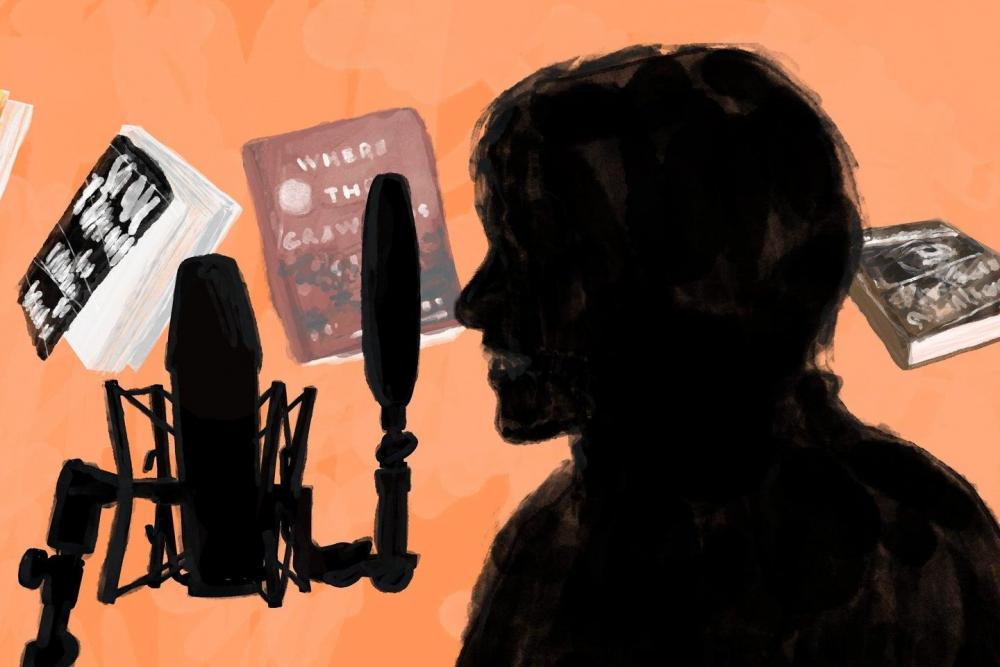
“I Probably Modeled Him on Something I’d Heard on The Wire”
The audiobook industry is collectively squirming through the cultural debate on representation and casting.
BY LAURA MILLER
Twenty years ago, Grover Gardner began narrating a series of comic mysteries whose title character is a white lawyer named Andy Carpenter. In the series—written by David Rosenfelt—Carpenter also has a partner, Willie Miller, who’s a Black ex-con, which means Gardner had to voice Miller too. Back then, he hardly gave any thought to the fact that he was a white narrator voicing a Black man. “I probably modeled him on something I’d heard on television, on Hill Street Blues, or The Wire,” Gardner said. Today, 14 books later, he’s still voicing Willie—but he’s changed his approach. “I’d think very hard about doing that kind of accent now,” he said.
In an era of heightened sensitivity to issues of representation and misrepresentation, it’s no longer acceptable to cast a white actor as a character of color in a movie or TV show. But audiobooks play by different rules. It’s customary now in the audiobook business to try to match a book’s narrator to the gender, race, and sometimes sexual orientation of a novel’s author or main character. Yet most novels feature characters with an assortment of different backgrounds, and this can require narrators to voice characters with identities very different from their own.
When audiobooks first rose to popularity in 1980s, the field was overwhelmingly white. Gardner, who has been an audiobook narrator for four decades and also works as a producer, recalls that, for the first couple of decades of his career, “the whole industry was geared toward middle-aged white businessmen” who listened to “books on tape” while on the road for work. There were hardly any narrators of color, and few female narrators back then, Gardner said. “I recorded Scott Turow’s [1990 novel] Burden of Proof. The narrator of that book is a Latino lawyer,” he told me. “I did it. We did whatever they sent us back then. But I wouldn’t do that book today. You would find a Latino narrator to do it.”
Apart from the amused response to the cartoonish accents Ronan Farrow rolled out when narrating the audio version of his 2019 exposé Catch and Kill, the audiobook world has so far been largely free of the sort of scandals that have triggered reckonings about representation in other creative industries, like magazine publishing and television. This is partly because it’s a low-profile, unglamorous field that doesn’t attract a lot of attention from the press. But many who work in the industry still feel the tensions around casting acutely. Amid a publishing boom in literature by writers of color, nonwhite narrators are being offered more work than they once were. Meanwhile, like most narrators, they find themselves getting asked to voice marginalized characters from backgrounds that bear no resemblance to theirs. January LaVoy, a biracial narrator who identifies as Black, said that cross-cultural audiobook narration is freighted in different ways for white narrators and narrators of color. “For many white narrators, it’s difficult because of fear [of backlash]. For many narrators of color, it’s difficult because of the weight of responsibility.” The industry is grappling with these issues daily. “It’s difficult for everyone,” LaVoy said.
Although some publishers have audiobook divisions, they usually function separately from the print division, and the audio rights for many titles get sold to separate companies such as Brilliance or Blackstone. The producer of an audiobook, who is employed by the publisher, acquires the rights and oversees casting and other big-picture decisions, such as opting for multiple narrators on a novel that often switches points of view.
Michele Cobb, a producer and the executive director of the Audio Publishers Association, told me that she and her colleagues have tried to figure out how they can sensitively ask narrators to provide producers with information about their backgrounds—such as gender identity, sexual orientation, and disability—that can be helpful when casting. Cobb explained that it’s an ongoing challenge to cast appropriate narrators for books by authors of color, while avoiding typecasting. In her own company, which publishes romance audiobooks, “I’ve definitely had authors come back and say, ‘Well, this character is white so I wouldn’t go with a Black narrator,’ ” a choice she feels obliged to respect.
Traditionally, both a director and an engineer, usually both freelancers, work on the recording with the narrator. Director Simone Barros outlined an exhausting list of tasks to me, from making sure the narrator doesn’t skip or add words to researching accurate regional pronunciations and maintaining continuity. “You can get to the last page of the book, and it will mention that a character had a German accent the whole time,” said Barros, speaks with the mile-a-minute lucidness of a person whose job is anticipating every contingency. Barros is of Cabo Verdean descent and identifies as Black.*
In the case of some first-person narrators, such as the one in Charlie Kaufman’s Antkind, an audiobook Barros directed, the book is “written so much within the perspective of the first person that the ethnicity of other characters are specifically heard from the narrator’s perspective of them. More specifically in Antkind, the author’s very point is this shifting, mutable and even unreliable perspective, to shine a light on how too often minority characters go unseen, or only seen or heard through a bias cipher.” But with a book written in the third person, she and her narrator will work up a full voice profile—a cache of recorded dialogue and biographical information—for each speaking character. That way, if, say, a villain appears in a novel’s first few pages only to disappear for several chapters, the narrator and director can remind themselves of what he sounds like. Such profiles are particularly helpful with recurring characters in sequels and series, which may be recorded years later.
In the past, it was largely left up to the professionals behind the scenes to anticipate and head off any problems. Ten years ago, it wasn’t uncommon for a book’s author—the person most intimately acquainted with a title—to have no input at all in the audiobook production. But as audiobooks became a more mainstream and high-profile format, authors began seeking more oversight. Today, writers often get the final say on casting, and are often invited to choose a narrator from a selection of sample recordings and encouraged to provide crucial information about how characters ought to sound. Nathan Harris, a Black writer whose debut novel, The Sweetness of Water, is set at the end of the Civil War, knew the accents of his multiracial cast of characters, who include freed slaves, would be a challenge. “You can go down a very precarious road with how they sound,” he said. “That’s why I didn’t want to do it myself.” His publisher presented him with an audition recording by William DeMeritt. “They told me they could go in all sorts of different directions if that’s what I wanted,” Harris said. “But he just nailed it.”
Over the past few years, the crew of professionals who work on a given book has increasingly been whittled down to a bare minimum, putting greater pressure on narrators’ judgment—even though a narrator, who is in most cases a freelance contractor, doesn’t have much time to carefully screen a book for potential stumbling blocks before agreeing to the job. The exploding demand for audiobooks with the advent of digital downloads and, most recently, an increasing number of home studios built during the pandemic also means that more narrators have ended up doing most of the production work and key decision-making on their own.
Some narrators say they now turn down jobs when they feel unsure about voicing major characters. Cassandra Campbell—narrator of, among other things, Delia Owens’ bestseller Where the Crawdads Sing, a novel featuring several Black supporting characters—recalled narrating the first two in a series of books, which made her the automatic choice for the third. But when she discovered that the third book was told from the point of view of a young Burmese boy, Campbell, who is white, bowed out. “I just didn’t feel comfortable with it,” she said.
A multitude of minor characters can turn an audio book into a minefield for its narrator. Edoardo Ballerini, who was profiled in the New York Times Magazine last year as “a go-to voice for intelligent, subtle but gripping narrations of books,” says he’s now most often asked to narrate books requiring European accents. (His father is an Italian poet, and he was raised in New York.) Still, challenges do arise. “Take a James Patterson book,” he explained. “Let’s say it’s set in New York City and the detective is hard-boiled, an Italian-American. I can do that. His partner is a feisty woman and I think I can handle that.” But then the minor characters start showing up, sometimes slotted into uncomfortably stereotypical roles: “They get in a cab and there’s the cabbie, or they run into a perp who happens to be Black, or whatever it is. You have to voice them as well. And there’s really no way for anyone to say, ‘Well, I’m not going to do this book because there are a handful of lines by an Indian cabbie.’ ”
Meanwhile, many narrators of color—extra-conscious of the weight of representation—find themselves engaging in a lot of extra, unpaid work researching characters and voices that they may ultimately decide they can’t do justice to. Recently, LaVoy bowed out on a title in a children’s series she narrates about a group of middle school students who travel the world with their eccentric professor, encountering mythical creatures from the cultures they visit. “When we did one that took place in the Pacific Northwest,” she said, “we got a Native American linguist from the Muckleshoot tribe to work with me. I felt really comfortable,” she said. “But this one particular book took place in Cuba, and it was very heavily written in Spanish,” a language LaVoy doesn’t speak fluently. When she got to a part where the whole group begins singing the Cuban national anthem, she decided to pass. “They needed someone with a different mouth,” she concluded.
A character’s accent can be an evocation of her origins and identity, but it can also be—as was the case with Apu, the Indian-born convenience-store clerk on The Simpsons, voiced by white actor Hank Azaria—a mocking caricature. (Azaria recently announced that he would no longer voice Apu and expressed a desire to “go to every single Indian person in this country and personally apologize.”) “Actors love to do accents!” Campbell told me. “It’s fun to do vocal gymnastics, but we have had a moment of recognizing that there are certain accents where you’re appropriating someone’s culture.”
The one motto that nearly every audiobook professional I interviewed repeated to me when I asked about their strategies for dealing with accents is “less is more.” Kevin R. Free—a Black theater actor who began narrating audiobooks 20 years ago and has become the voice of both a soap opera–addicted cyborg in Martha Wells’ Murderbot series and of Eric Carle’s iconic picture books (The Very Hungry Caterpillar, etc.)—laughingly recalled reporting for his very first recording session armed with a set of theatrically bold character voices, only to be told by his director: “I don’t want you to think of doing this book as doing a solo show. … There’s no reason for you to go all the way there.”* That holds especially true for cross-cultural accents. If Ballerini feels that “maybe I’m not the right person to give a voice to this particular character, let me just do it as plainly and as simply as I can. I think that’s a general trend that’s happening in the industry.”
Campbell explained that when voicing characters of color, she uses an acting technique that focuses on the character’s intentions rather than on more superficial markers of identity like accent. “What does the character want from the other person in the scene? What is the conflict of the scene? Play that fully without relying on cultural stereotypes.” In Campbell’s recording of Where the Crawdads Sing, she audibly dials the rural North Carolina accents of the Black characters further down than the accents of the white characters they interact with.
Sometimes, however, an accent shouldn’t be underplayed, because it serves a crucial role in the story. That can create conflict with the production or postproduction staff, if they’re not familiar with or sensitive to the cultural context of a book. Barros directed the audiobook of Simon Han’s 2020 novel Nights When Nothing Happened, about a family of Chinese immigrants living in Texas. The wife in the book becomes annoyed when her husband leaves an outgoing message on their answering machine pronouncing the family’s surname as “Chang,” as the Texans around them say it, rather than using the Mandarin pronunciation, which is closer to “Cheng.” When narrator James Chen’s recording went through a postproduction process called quality control, or QC, Barros and Chen received orders for “pickups” (short rerecordings edited into the final audiobook to correct errors) on every instance of the family’s name, instructing them to pronounce it the Anglicized way—as the Texans do. This was, as Barros put it, “not only totally wrong,” but a literal replication of the assimilation that so bothers the main character’s wife. In that instance, the producer backed Barros and her narrator, but that’s not always the case; January LaVoy wincingly recalled the time that, at a director’s insistence, she recorded pickups replacing her correct pronunciation of Latinx with latinks.
Deciding whether to use the Anglicized or loanword pronunciations can be fraught for bilingual performers. Emily Woo Zeller, a Chinese American narrator, has sometimes clashed with directors and QC over whether to Anglicize the pronunciation of words taken from other languages, such as tofu or kung fu. She is also one of the few narrators I spoke with who took the step of contacting the author of a book that she found objectionable. “I won’t name names,” she told me, “but it was a white author,” and the scene involved what Zeller called “misplaced comedy,” in which the author “mixed up Chinese and Japanese culture, and the comedy was about the way characters looked and the fact that wanted to do kung fu and they were Communists.” Deciding “this can’t come out of my mouth,” Zeller brought her concerns to the author, who, she said, was “very apologetic and willing to change it.”
Hers was an unusual move. Audiobook narrators tend to see their role as strictly interpretative. Their job is to convey the book from the author to the reader in a way that remains true to the author’s intent. This includes texts like classics, books whose authors can’t be appealed to for changes, and books that contain words, passages, and characters that are now deemed offensive. There also remain plenty of contemporary authors who, as Cobb tactfully put it, “haven’t caught up yet,” and narrators will continue to have to figure out how to perform those books.
For Grover Gardner, four decades in the audiobook industry have taught him that “where there’s ignorance, you fall back on the only things that you’ve seen or heard, and chances are very good that, if you’re an older person, you’re drawing on a stereotype.” He’s had to work to transform some of his ongoing roles from vocal clichés into full characters. In the case of the former convict Willie in the Andy Carpenter mysteries, for instance, he has consciously tried to lean less on an exaggerated accent as an actorly crutch. “I’ve tried to focus more on attitude,” Gardner said, “on the real person.”Correction, June 23, 2021: This article originally misstated that Simone Barros is Black. Barros is of Cabo Verdean descent and identifies as Black.
Update, June 23, 2021: This article has been updated to add additional comments by Barros about the narration and perspective in Antkind.
Correction, June 22, 2021: This article originally misstated that Kevin R. Free began narrating audiobooks five years ago. Free began narrating audiobooks 20 years ago.
How Stories Change When They Move From Page to Voice
Laura Lindstedt on the Different Ways We Read a Book
By Laura Lindstedt, translated by David Hackston
June 14, 2021To all intents and purposes, a psychoanalyst’s couch is in fact a bed—after all, it lacks a back and armrests. And yet, this item of furniture must be called a couch. Nobody would offload their traumas on a psychoanalyst’s bed unless, that is, they were in a relationship with said psychoanalyst.
In October 2019, I found myself sitting in the Silencio recording studios, headphones over my ears, reading aloud my novel My Friend Natalia, which had been published in Finland six months earlier.
“‘Natalia’ was one of my first clients to lie on her back without prompting,” I read and continued: “When I showed her round my office, which I had rented in an apartment next to my house, I told her about the couch.”
These two consecutive sentences are from the opening chapter of the novel. Reading these sentences aloud irrevocably sprained something in my brain.When one reads a book aloud as an audiobook, the visual aspects of the text all disappear. Of course, one could read the word couch, which appears in italics, in a slightly different way, perhaps by holding a short, artistic pause before the word. But this is not the same thing. Italics are not the same as a short pause.
The therapist, the book’s narrator, gives the patient the code-name “Natalia.” Under the cover of this anonymity, the therapist then proceeds to divulge intimate details of Natalia’s life to the reader, then at one point removes the inverted commas from Natalia’s name “as I might remove the safety catch from a gun”. When read aloud, this sentence is absurd: the listener cannot hear the inverted commas around Natalia’s name.
*
Let’s be clear: I am very skeptical about the practice of turning works of literature into audio recordings.
If audiobooks become the primary way in which we interact with books, it would be strange if at some point this did not have a direct impact on how people write literary works.
Will writers—either consciously or subconsciously—start writing books so that they sound good when read aloud? The succinct speech between Me (the writer) and You (the reader) works well when spoken aloud, so the current appetite for autofiction is unlikely to dwindle any time soon. A linear narrative, in which we already know (or think we know) something about the end point, is also easy to listen to. For this reason, celebrity autobiographies and so-called true stories make for successful audiobooks.
However, complex narrative structures, shifting perspectives, narrative polyphony, long, meandering sentences and the visual aspects of a text find themselves increasingly under threat from a medium that relies solely on hearing. If linear narrative becomes the only acceptable form of complex literary expression, our thoughts will be the poorer for it. Imaginary worlds and possibilities will shrink because such worlds and possibilities are not “content” that can be detached from “form,” they are not statements, suggestions or questions isolated from their rhetorical devices.*
That being said, I’m not a militant opponent of audiobooks. To my mind, it is simply important to recognize that there is a significant difference between the printed book and the audiobook. Written material turns into vibration, letters become sound waves. They always come from a concrete source that guides our interpretation, a source that is completely different from the reading process heard through our “inner voice.”
A new element appears between the book and its recipient: a voice that shapes how we receive the text. It is a sound born of a human body in a unique way and that is (generally) readily identifiable as the voice of a man or a woman.
In the audiobook of My Friend Natalia, this unavoidable fact becomes a poetic problem in its own right. Throughout the text, I have scattered conflicting clues as to the sex of the therapist, the novel’s first-person narrator, but I was careful never to define the therapist as either a man or a woman. With certain exceptions, in many languages a writer and a translator can easily disguise or at least avoid the matter of the narrator’s sex. A writer can also play with this ambiguity, as is the case in my novel My Friend Natalia.
Some readers have been convinced that the narrator is a man, others have considered the therapist a woman. Several readers have told me that their perception of the matter changed as they were reading. Readers always read a text through the prism of their own experiences, preconceptions and cultural stereotypes.
For this reason, I wanted to read the Finnish audiobook of My Friend Natalia myself. I am a woman, but because I am the book’s author my voice is above all an authorial voice, and in this way I feel I managed to resolve the dilemma described above.But my relief was somewhat premature. I was once again forced to confront this matter in early 2021 when Penguin Random House Audio began to produce the English-language audiobook of David Hackston’s translation of My Friend Natalia (W.W. Norton/Liveright).
PHR Audio’s producer kindly sent me a number of audio samples to listen to. All these samples were very professional and of the highest quality, but still they were unsuitable for my novel’s narrator. I started to lose hope. Was it at all possible to find an actor whose voice was neither that of a man nor a woman, a voice that wasn’t too young as it should be a voice that conveys the therapist’s wealth of professional experience? The voice also needed dash of pompous embitterment, stemming from the fact that nobody seems to value the therapist’s subtle genius.
But we were lucky, and eventually we found an excellent voice, that of the actor TL Thompson, who identifies as non-binary and whom I chose as the English-language reader for My Friend Natalia.
Thompson’s voice is characterful, mesmerizing and unforced. To my own ear, Thompson’s voice sounds more masculine than feminine, or perhaps it’s the whisky baritone of an elderly lady. However, the voice is not remotely “gender-neutral,” a voice-type that we tried to look for at first and whose very existence I have seriously begun to doubt. Thompson’s voice made every sentence oscillate between the two. I have not written such oscillation into my novel, let alone a gender-neutral narrator’s voice: the question of the therapist’s identity opens up—if, indeed, it opens up at all—when readers find themselves indulging in assumptions that the text does not affirm.
I can say quite whole-heartedly that I love Thompson’s reading. Yet in the same breath, I must reiterate what I have already said: an audiobook is a different entity from a printed book.
*
For me, the act of interpretation is specifically that of thinking with the book. It requires stops, pauses, flicking through the pages, making notes in the margins. The book takes on markings, layers that are missing from digital products, which are perpetually new.
We can browse with our eyes but not with our ears, as my partner, who works with sound, would put it. The ear is more sensitive to chaos and clamor than the eye. Sound operates like a one-directional timeline, a surge that is hard to control. A detailed auditive perception of a large space is simply impossible.It is to these very layers that I return when trying to form an understanding of the kind of book I am reading. I can easily locate markings I have made by flicking through a book, even if it is a book I read 20 years ago.
The various temporal strata of my home library provide a shadow story of what has touched me and who I have been throughout my reading life. Last summer I awoke to the immeasurable value of these little scribblings when going through my grandmother’s estate after she died at the age of 100. From the collection of religious books, treatises and notebooks, I saved those in which my grandmother had left some kind of mark—and exclamation mark, a line under a section of text, or a Biblical verse in the margin. These markings reveal not only what touched her and who she was; they also say a lot about where I have come from, what kind of supra-generational reality I carry with me.
New works from Dr. Martin Luther King Jr.’s archives will finally be published, starting next year.
By Dan Sheehan
June 23, 2021, 11:21amThe publishing giant HarperCollins has reached an agreement with the estate of Dr. Martin Luther King Jr. to acquire world publishing rights to the late Civil Rights leader’s entire archives—a collection which contains some of the “most historically important and vital literature in American history.”
As reported by Publishers Weekly earlier today< read below > , the mega-deal gives HarperCollins world rights “to publish new books from the archives across all formats, including children’s books, e-books, audiobooks, journals, and graphic novels in all languages.”
Given the significance of the books in question, it seems strange that a deal like this one wasn’t made sooner, but this is welcome news nonetheless.
More welcome still is HC’s assertion that it will hire a dedicated archivist to oversee the project, and “engage prominent Black scholars, actors, artists, performers, and social activists to help bring Dr. King’s works to life.”
Way back in 1958, HC’s predecessor company Harper & Brothers published Dr. King’s very first book, Stride Toward Freedom: The Montgomery Story, which detailed the 1955–56 Montgomery bus boycott and described the conditions of African Americans living in Alabama during the era.
The first MLK titles to be published by HC are scheduled to drop in January 2022, to coincide with Martin Luther King Jr. Day.
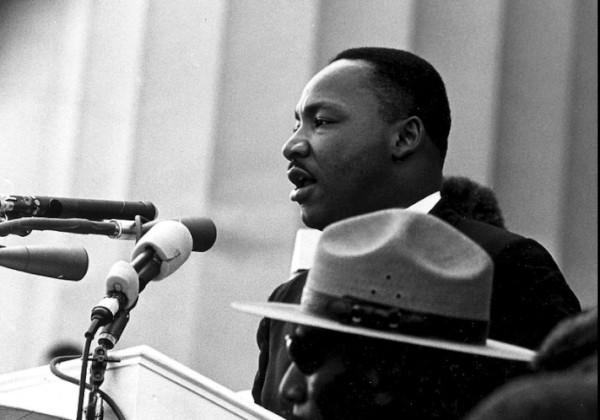
HC Inks Deal with MLK Jr. Archives
By Rachel Deahl | Jun 23, 2021In an agreement with the estate of Dr. Martin Luther King, Jr., HarperCollins has acquired world publishing rights to the archives of the civil rights leader. The publisher said the collection features some of the "most historically important and vital literature in American history."
Judith Curr, president and publisher of HarperOne Group, negotiated the deal with Amy Berkower, president, Writers House and agent for the King estate; and Eric D. Tidwell of Intellectual Properties Management, manager of the King estate. The deal gives HC world rights to publish new books from the archives across all formats, including children’s books, e-books, audiobooks, journals, and graphic novels in all languages.
HC said it plans to hire an archivist who will oversee the material in the archive and make it "available to all HarperCollins editors globally." HC added that it intends to "engage prominent Black scholars, actors, artists, performers, and social activists to help bring Dr. King’s works to life."HC also has history with King. A predecessor company to HC, Harper & Brothers, published King's first book, Stride Toward Freedom: The Montgomery Story, in 1958.
All current his King titles, including those published by Beacon Press, will continue to be publishing by their current rights holders.
“We are thrilled to be the official publisher of Dr. Martin Luther King Jr.’s archives,” said Curr in a statement. “We view this as a unique global publishing program."
The first King titles to be published by HC are scheduled to drop in January 2022, coinciding with Martin Luther King Jr. Day.
SOURCE ARTICLE
Kobo Emerging Writer Prize, Books for Palestine, and an Intro to Booktok: This Week in Book News
https://kobowritinglife.com/2021/06/25/kobo-emerging-writer-prize-books-for-palestine-and-an-intro-to-booktok-this-week-in-book-news/
-

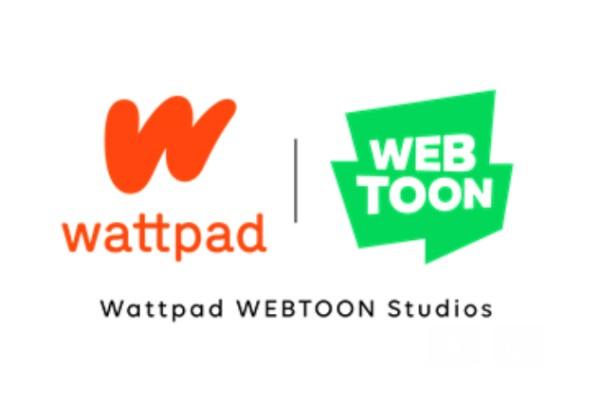
Following Naver's $600 million acquisition of Wattpad earlier this year, Wattpad and Naver's Webtoon are merging their film and television production studios under the name Wattpad Webtoon Studios. Aron Levitz, who previously oversaw Wattpad Studios, will serve as president of combined group.
"One of the best things about Wattpad Webtoon Studios is that we’re format agnostic, we have incredible IP with built-in fans in every genre, and stories that already travel across borders," said Ashleigh Gardner, deputy general manager for publishing of Wattpad Webtoon Studios. "We have access to some of the biggest libraries of stories and digital comics on the planet, with stories in every genre you can imagine."
Naver is supporting the new studio with an investment of $100 million in content development and production financing. The studio will use data to determine the most popular stories and attempt to ascertain their potential for success in the broader marketplace as TV shows, films or books.
"This commitment reflects Naver’s confidence in our team’s ability to create incredible books and industry-leading entertainment that fans will love in any format," Gardner said, adding that the formation of the studio and investment will enable Wattpad to move faster, to adapt stories for new formats and audiences.
-

OverDrive to Acquire Kanopy
June 9, 2021
2021, PRESS RELEASES
OverDrive Library and College Partners to Benefit from Kanopy’s Acclaimed Video Catalog, Platform and Apps
CLEVELAND – June 9, 2021 – OverDrive, the leading digital reading platform for libraries and schools worldwide, announced today that it is acquiring Kanopy, a leading video streaming service for public and academic libraries.
OverDrive to Acquire Kanopy - OverDrive
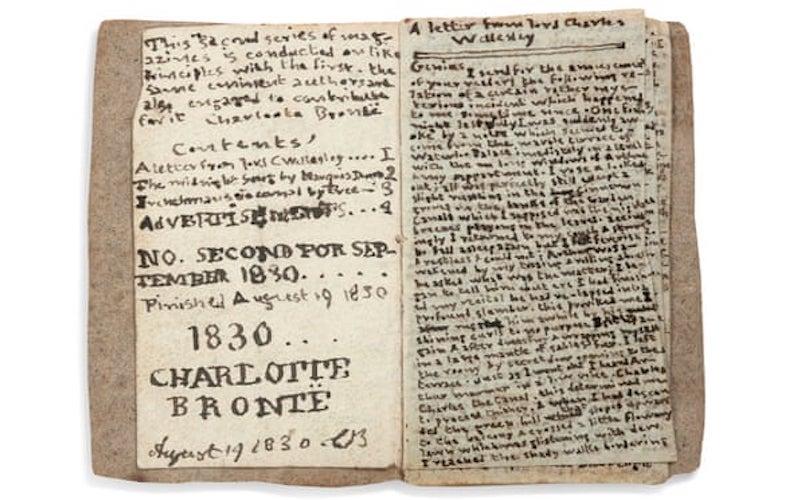
Brontë enthusiasts have banded together to stop Sotheby’s from auctioning off rare manuscripts.
By Walker Caplan
June 22, 2021, 1:37pm
Last month, Sotheby’s announced that a collection of rare Brontë-affiliated manuscripts, most notably a volume of 31 handwritten poems by Emily Brontë, was slated for auction along with other manuscripts by Robert Burns and Walter Scott. Now, Sotheby’s has agreed to delay their auction, as a group of British libraries and museums have announced their attempt to purchase and preserve the collection for the public. The time frame of the auction delay has not been publicly announced.
The aforementioned manuscripts are all part of a private library, the Honresfield Library, collected and kept in the 1800s by Alfred and William Law; after Alfred’s nephew, inheritor of the library, died, the collection disappeared from public view and was thought to be lost to the ages.
-

BEFORE YOU READ THE ARTICLE BELOW, I have a question
Where are the publishers for thoughts from non white communities in the usa, that are negatively biased toward others?
THE GREAT RIGHT-WING PUBLISHING DIVIDE WIDENS
Mike Pence and Jared Kushner are writing for establishment players, as Mark Meadows and Peter Navarro head to a conservative upstart. So where does Donald Trump end up?
BY CALEB ECARMA
JUNE 17, 2021
Right-wing authors struggling to ink book deals—like Missouri senator Josh Hawley, whose deal with Simon & Schuster was nixed after he seemingly cheered on the January Capitol riot—can take heart: A pair of conservative publishing executives have united to bring them hope. Louise Burke, a former top publisher at Simon & Schuster, and Kate Hartson, the former editorial director at Hachette Book Group’s Center Street imprint, are launching All Seasons Press, a company that, by its own definition, is “open to welcoming those authors who are being attacked, bullied, banned from social media, and, in some cases, outright rejected by politically correct publishers.”
Uproar over right-wing figures’ publishing deals has come to a head of late. In April, about 14% of Simon & Schuster employees signed a petition calling for Mike Pence’s book deal to be dropped, saying that publishing the former vice president amounted to “legitimizing bigotry.” (Simon & Schuster CEO Jonathan Karp ultimately ignored the petition request, writing in a letter to staff: “We come to work each day to publish, not cancel, which is the most extreme decision a publisher can make.”) Burke told the Wall Street Journal that she is “increasingly concerned and somewhat outraged about what’s going on in terms of free speech and free press” and fears the “canceling of voices that…are meeting resistance from mainstream publishers, particularly former [Donald] Trump administration members.”
While Burke noted that there is already “competition” in the conservative publishing industry, which includes Regnery and Random House’s Crown Forum imprint, she still believes there’s “room for another publisher, especially one that will be as independent as we are.”
Already, All Seasons Press has illuminated an interesting dividing line in terms of the Trumpers it plans to publish. There are those like former Trump chief of staff Mark Meadows, former White House adviser Peter Navarro, and ex-Rush Limbaugh producer James Golden who have migrated to the publisher, according to the Journal. (Hawley, for his part, found an alternative publisher in Regnery.) In an email to the outlet, Navarro claimed the publishing world has “devolved into a Cancel Culture, Virtue Signaling cesspool,” adding, “it is refreshing to see a new publishing house emerge willing to print books such as my forthcoming volume in the Fall that will speak truth to power.” Then there are those like Pence and Jared Kushner, whose deal with Broadside Books, an imprint of HarperCollins, was announced this week—the names so recognizable that publishers have seemingly calculated that the headache of printing their work is, financially speaking, worth the hassle of potential blowback.
Still up in the air is Donald Trump himself. The former president claims he is “writing like crazy,” working on a memoir of his time in office. He also claims he’s rejected offers from two unnamed major publishing houses. But sources at Penguin Random House, Hachette Book Group, HarperCollins, Macmillan Publishers, and Simon & Schuster—the Big Five publishers—recently told Politico they were unaware of any such offers. The outlet also reported that publishing executives are concerned that signing a deal with Trump could result in a staff uprising and other signed authors walking out in protest.
Books about Trump and his presidency, however, are still in demand. Michael Wolff’s Landslide: The Final Days of the Trump Presidency will be released on July 27, and Wolff said on Twitter that an excerpt of the book will appear in a New York magazine cover story on July 5. The book’s publisher, Henry Holt and Company, described it thusly: “In Landslide, Wolff closes the story of Trump’s four years in office and his tumultuous last months at the helm of the country, based on Wolff’s extraordinary access to White House aides and to the former president himself.”
The Great Right-Wing Publishing Divide Widens | Vanity Fair
-
-
NEW VOICES. NEW VISIONARIES
IT’S TIME TO WRITE A NEW CHAPTER IN THE SUPERHERO STORY.
If stories are what shape the world we live in, then the storytellers should reflect that world. The Milestone Initiative is looking for the next generation of Black and diverse comic book creators.DC Superhero
In 1993, four Black creators created Milestone Comics: a new universe of Black Super Heroes, brought to life by Black creators and other artists of color. Milestone didn’t just change the way our heroes looked. It built a pipeline for talent who had been excluded and marginalized for too long, and an ecosystem in which Black creativity could thrive. Now, with the relaunch of Milestone Comics and the creation of The Milestone Initiative, we want to honor the creators of Milestone by continuing their mission. But we can’t do it without you.DC Superhero
MAKE YOUR MARK
Do you have a story to tell? Do your experiences, imagination, and perspective go beyond the limits of what you see on TV, in movies, and in other media? If you live and breathe comics, and you’re an emerging Black artist or writer —or a creator from an underrepresented group —we’re looking for you to join The Milestone Initiative.The path to a sustainable creative career in this competitive industry will never be an easy one. You already know that —you’ve spent years honing your craft on your own. But with The Milestone Initiative, we hope to give you the support you need to make that hard work pay off. The next step starts here.
DC Summit
THE
SUMMIT
Participants in The Milestone Initiative will be invited to a one-week summit, hosted by WarnerMedia, DC, and Ally, where they’ll make connections, create community, and begin an immersive course to help hone creative skills and better understand the comic book industry.WHEN
02.14.22 – 02.18.22WHERE
BURBANK, CA
1. ARRIVE
If you’re selected to participate in The Milestone Initiative, your journey will begin with the Milestone Summit. You’ll travel at our expense to DC’s headquarters in Burbank, to meet legendary creators, editors, and executives in the comics and entertainment industries.
2. LEARN
Under the mentorship of some of the most prominent names in comics, as well as Ally’s team of financial experts, you’ll receive in-depth, substantive instruction about building a creative life and earning a living in this field. You’ll hone your creative skills, but you’ll also learn the business of the comics industry and receive advice on sustaining a long-term career. Following the Milestone Summit, you’ll go home and participate in an 8-week virtual course, where you’ll receive technical training through best-in-class cartooning and graphic art school The Kubert School.
3. CREATE
It won’t be easy —throughout this multi-week course, you’ll be working as well as learning, crafting stories with your fellow participants. At the end of this journey you’ll come away with polished work that will showcase your unique talents, new knowledge, and skills and you'll have a pathway into the DC talent community if you want to pursue it.
4. IGNITE
The Milestone Initiative doesn’t end with the the completion of the coursework. The team from DC will remain in contact with all participants in the months following and will work with them to find appropriate comics assignments and other work that will help them continue to grow as creators and further their careers with DC and in the comics world.HOW TO APPLY
The Milestone Initiative is open to Black and other underrepresented creators who are ready to enter the comic book industry at a professional level. You’ve got the talent, you’ve put in the hours of practice, and this is the opening you’ve been waiting for.Think you have what it takes? Get ready to dive into the application. You have a story to tell. We want to hear it.
PROCESS
DC Milestone
Now a quick reality check: we know you’re serious, and we’re serious too. So this application is going to take some time. We think it’s worth it.STEP 1: 10-20 MINUTES
First, we’ll ask you for a bit of biographical information. We’ll also ask you to provide us with links to a few existing pieces of completed original work, to give us a sense of your creative voice and vision.STEP 2: 5-7 DAYS
The next sections are where you should plan wisely. We’ll be asking you to put your talent and skills into action by completing a short assignment. If you’re an artist, that will mean drawing three comic pages based on a script we provide; if you’re a writer, you’ll be creating a script for an 8 page story based on a loose prompt we’ve created.STEP 3: 2-3 DAYS
Finally, we want writers and artists to answer a few, short essay questions and tell us who you are as a creator. Describe your voice and your vision —what do you believe you have to offer the world? The answers won’t take long to write, but they will take some time to think about. (And artists, don’t be intimidated if writing isn’t your thing. We’re looking for substance here, not style.)Got it? Get started. You don’t have to complete everything now —our system can save your work, just make sure to click “Save Draft” at the bottom of the page so you can begin now and tackle it a piece at a time.
DC Superpowered
WHAT IS THE MILESTONE INITIATIVE?
Superman wasn’t just the first superhero: he was an immigrant, an American, and an enduring symbol of our shared ideals. But as an explosion of comic book heroes took place over the second half of the 20th century, there was something missing. Despite an enduring Black readership, it took decades before the first Black heroes appeared, and once they did, they remained uncommon. Even the most prominent Black heroes usually appeared in stories written and illustrated by white creators.Enter Dwayne McDuffie, Denys Cowan, Michael Davis, and Derek T. Dingle. With talent, vision, and tenacity, these four Black creators carved a place for themselves in an industry that didn’t always welcome or understand them. Despite their success, they were frustrated by the dearth of other Black creators in their field, and the resistance they met in trying to tell stories that reflected their own experiences and perspectives.
DC story-1-480
So they founded Milestone Media —a company that placed Black superheroes at the center of the action with their Milestone comics line, and which would make an inclusive space for Black and underrepresented comic book creators to flourish and succeed.Milestone hit like a space pod crashing to Earth —and its impact has continued to this day. Now, Milestone Media, is helmed by Reginald Hudlin and Denys Cowan, and DC is relaunching Milestone Comics and reintroducing its characters to new audiences, but we understand that there’s still much more work to be done to continue the mission of Milestone’s founders.
That’s why, with Ally as our partner, we’ve created The Milestone Initiative. While Milestone Media is about telling the stories of Black heroes, The Milestone Initiative is about empowering the creators who can tell those stories in ways that are resonant, real, and revolutionary. The program is part of DC’s talent development program, Next Generation DC (NGDC), and is designed to identify, educate, spotlight, and empower the next generation of Black and diverse creators in our field so that the stories of the next century are truly reflective of the world around us.
Throughout American history —in the comic book industry as well as in other creative fields —Black and other underrepresented creators have been consistent innovators and visionaries despite systems that work to exclude them. Now, as comic books take center stage in popular culture, DC, WarnerMedia, and Ally want to change that with The Milestone Initiative. The Milestone Media founders started the mission. It’s time for you to pick up their mantle.
DC story-2-480
READY TO MAKE YOUR MARK?
SUBMIT YOUR APPLICATION
FREQUENTLY ASKED QUESTIONS-

@Mel Hopkins @Troy I have already figured out my story. I will have it all submitted by tomorrow mid afternoon. it is open to all, I hope you go for it.
-

MILESTONE INITIATIVE
ASSIGNMENTS & ESSAYS
------------------------------------------------------------------
WRITER ASSIGNMENT
Please write a script for an 8-page story featuring Icon and Rocket, based on the story prompt below. Your script needs to be a self-contained story and should follow the standard comic book script format. We will be looking most closely at structure and flow, as well as the entertainment value of your story, in addition to your ability to properly portray these well-established characters through dialogue and actions.Icon & Rocket 8 Page Story Prompt
Icon and Rocket are in their civilian guises, in a world city of your choice, sampling local cuisine and discussing a cultural topic of your choice (Icon, as always, taking the long and inherently traditional view of things, and Rocket arguing passionately for the view of her generation), when a super-powered or extraordinary threat menaces the city. Ideally, the threat or ensuing action resonates in an interesting way with their conversation, leading to an exciting conclusion that challenges them to better understand each other’s points of view. Remember to write with spectacular visuals and action pacing in mind, including a splash page and other dramatic moments for your artist to show.............................................
ARTIST ASSIGNMENT
Please draw the 3-page story sequence. Current Static writer Vita Ayala wrote the story, which represents the type of script you will see as a DC artist. Your artwork for these pages should be black and white only. Full pencils are required. Inks are optional. We will be looking most closely at page layout and storytelling, along with the quality and dynamism of your illustrations.ARTIST ASSIGNMENT
SPECS:Your story should adhere to DC’s standard technical requirements, which are:
Standard comic trim = 6.325 inches x 10.1875 inches (16.0655 cm x 25.87625 cm)
Image safe area should be .25 inches (0.635 cm) inside of the trim (gutter)
Bleed area is .125 inches (0.3175 cm) outside the trim (draw to the edge)
Pencils: 300 dpi grayscale
Inks: 600 dpi grayscale or bitmapEXAMPLE OF SCRIPT FOR WRITING OR ARtist Assignment
-
-
 1
1
-
- Report
-

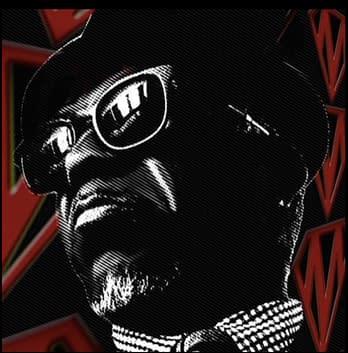
Michael Davis, Milestone Founder, Applies To Milestone Initiative
Posted on October 19, 2021 by Rich Johnston|Comments
Michael Davis was one of the co-founders of Milestone Media, and used his own life story when creating the background and bible for their most successful character, Static. He ran a mentorship programme through his production studio Bad Boys, which he used to help find talent for Milestone, including the late John Paul Leon, whose first comic book job was drawing Static #1.This weekend, DC Comics announced the new Milestone Initiative at DC Fandome to serve "Black and underrepresented" comic book creators, as part of their new talent development programme, Next Generation DC (NGDC) stating that "if stories are what shape the world we live in, then the storytellers should reflect that world. The Milestone Initiative is looking for the next generation of Black and diverse comic book creators" who are ready to enter the comic book industry at a professional level. DC states that "throughout American history —in the comic book industry as well as in other creative fields —Black and other underrepresented creators have been consistent innovators and visionaries despite systems that work to exclude them."
This was all news to Michael Davis, of course. DC hasn't involved him in any of the new Milestone projects. So he did the next best thing. And I have to say, when he told me, I burst out laughing. Michael Davis has applied to join the Milestone Initiative.
So what kind of credentials has he given, as well as a co-founder of Milestone Media and co-creator of the original launch titles? Well, his Bad Boy Studios launches the careers of Aaron McGruder, John Paul Leon, Bernard Chang, Brett Lewis, , Christopher Sotomayor, N. Steven Harris, Shawn Martinbrough Kevin McCarthy, Phil Jimenez, DC Comics' first Latina editor Alisande Morales, Walter McDaniel – the owner and CEO of Red Dragon Studios, the only African American-owned animation studio in China, Jason Medley – now a senior designer at Warner Bros, TV art director/producer Chuck Drost, hip hop designer Willie Esco and Jamaican TV anchorman Basil Reid. In 1996 he was Mentor Of The Year according to Mentor Magazine. It was also the year he had T%he Michael Davis Auditorium named after him at the Gordon Parks Academy.
As well as being a facilitator for comic book projects such as The Fifth Beatle, he also created and hosted The Black Panel at every San Diego Comic-Con, becoming the most non-Big Two attended regular panel at the show. Then there was his Guardian Line Universe was launched by Christian publishing and media firm, UMI (Urban Ministries, Inc) developed to appeal to a multicultural audience, with a focus on African American youth, selling over two million issues directly into the Black household and church. He also created The Action Files, a low-level reading program for schools to be integrated into Viacom entertainment companies, first distributed through Simon & Schuster, and still, the only comic book reading program curriculum taught in any school system to this day. The program now published through Pearson Learning has added a curriculum-free version available on am*zon. And recently, has been working on a new publishing initiative called Level Next with Wayne Brady.
Maybe some of those will help him be picked for the Milestone Initiative? You know, as well as co-founding Milestone in the first place?
https://bleedingcool.com/comics/michael-davis-milestone-founder-applies-to-milestone-initiative/
-
-
The HArder They Fall
MEdia That Moves We
Black Daddies
some of my thoughts
My Media that moves we commentary
the film was influenced by all the genre's of western films in the usa, from the john wayne era to the spaghetti western to the black films like posse or buck and the preacher
That is the brilliance of the film, it in the end is an entertainment , not a documentary or historical film.
Nike, you precancelled , canceled westerns:)
YEah, Multiple review shows of this film have I Think missed one key point. if you want to make a film a certain way, own a film studio. At some point you have to reject the level of complaint to how the story is told. Own a studio and you can do what you want ?
and let's be honest, revenge is a constant theme of westerns of all sorts, denzel's magnificent seven differed from kurosawa's seven samurai or brenner/mcqueen magnificent seven, where the gunfighters are trying to redeem themselves in a quiet little place.
yes, they trained with their doubles so they could have a more john wickian fight choreography
I give my entertainment ranking a 10, I was entertained , love the womens fight:) in terms of black westerns , it is a high percentage, 7 or 8. I think posse or buck and the preacher are better as films. In terms of westerns in general , from the black and white silent black westerns and et cetera to now, 7 . In terms of historical quality in western films... a five.
My Black Daddies commentary
Was jill scott offered the role? did jill scott reject it?
blacker than buck and the preacher... I don't know, it is clearly up there
the usa has a long history of film superstar collabs in westerns, this films joins that very long list
white zombia was a financial play, legosi reportedly was paid a lot for that film, and it was clearly designed to play on the fandom of "monster movies" the cultural aspects of white zombie is clearly negative but the reason it was made was purely financial
do you guys think disney has written the entire phase 4 already, or at least all the parts?
Do you think a cartoon of a fiscally impoverished family from a dying black town, can be made by a high profile company like disney?
What about danny glover get production money to direct his toussaint louverture movie if he does this?
if lethal weapon 5 makes money does another Beverly hills cop happen?
What about the detective jumps from a spacex ship to virgin galactic ship to solve a cryptocurrency theft
This was for entertainment, in the spirit of westerns movies in the usa. never real history, always an entertainment
-

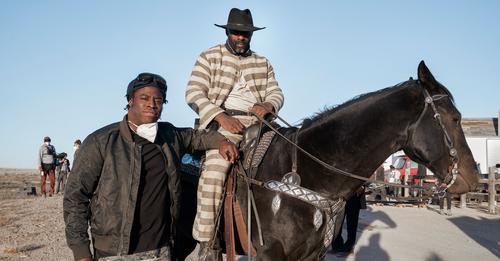
I read the article. I have a problem when a black person, says all they saw is white owned media's white representations. Black writers wrote about black cowboys for years. My question is, why did his black parents, in england, which has a fine library system and is a rich country, not put some books in his face. I will battle any black artists who gets on this , never knew black being raised bullshit story. I was raised by two black people in a black community . Why is it I knew all about black cowboys? Black warriors in medieval europe? black native americans? ITs bullshit. I want Black people like the director of "the harder they fall" to admit their black parents FAILED THEM!!! in terms of exposing black art.
I repeat Yes all caps, FAILED THEM!!! in terms of exposing black art. I didn't say black parents failed to feed them or house them or cloth them. I repeat, FAILED THEM!!! in terms of exposing black art.
Black people, we have to own up that many, maybe even most black parents in the last century simply failed to expose black children to the available black art In there home.
ARTICLE
https://www.vanityfair.com/hollywood/2021/11/the-harder-they-fall-director-jeymes-samuel-little-gold-men-interview-awards-insiderAll-Negro Comics No. 1 (June 1947). Cover artist unknown.
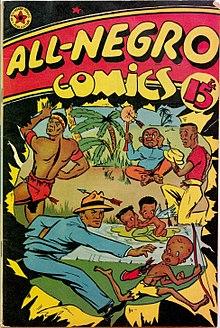
-
-
 1
1
-
- Report
-

I just added All-Negro Comics to the site: https://aalbc.com/books/bookinfo.php?isbn13=9781794099869
-
-
 1
1
-
- Report
-

-
-
Shawn Alleyne < Pyroglyphics Studio > OR < https://www.deviantart.com/pyroglyphics1 > - entries from his january series
The spot

Almost

Worship
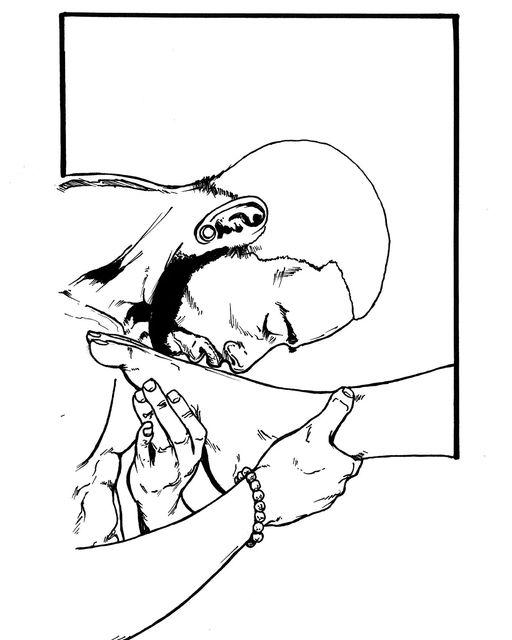
Grip
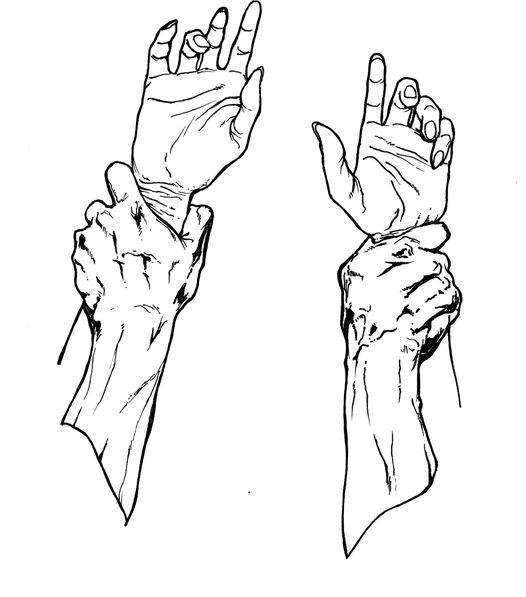
Third eye kiss
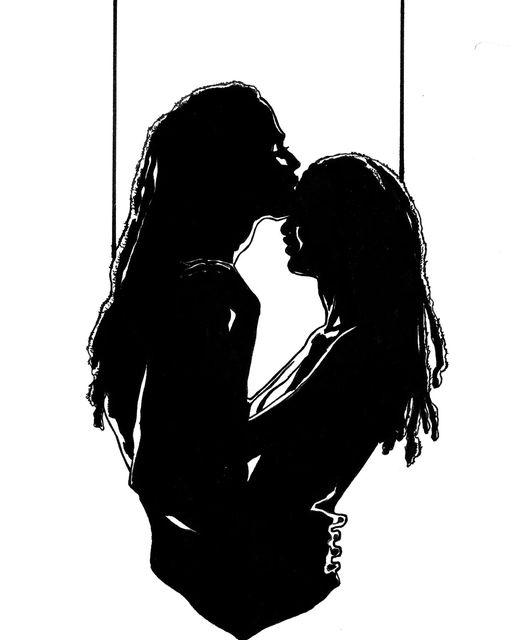
More
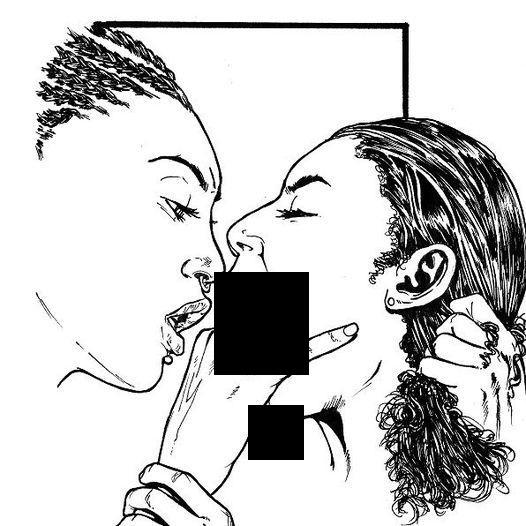
submission
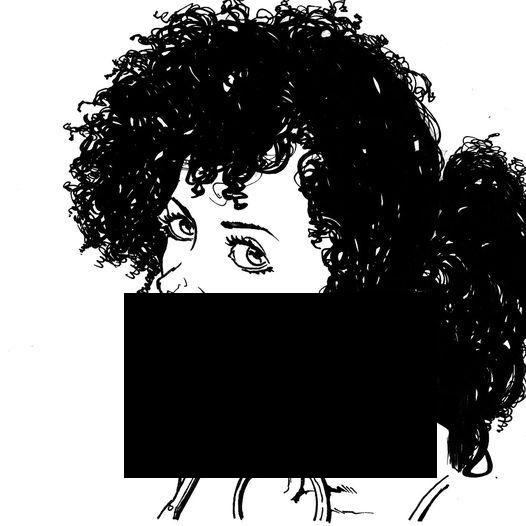
-

-

tantric and service
https://aalbc.com/tc/profile/6477-richardmurray/?status=1773&type=status
-

-
-
Mel Hopkins < https://aalbc.com/tc/profile/18-mel-hopkins/ > said on the post < https://aalbc.com/tc/topic/8495-what-do-you-want-out-of-life/ >
Mel Hopkins said:
To know what purpose the human species serves. It appears every other species are caretakers of this planet - and accomplishes their role in the ecosystem. I'd like to know the human's purpose.Click and drag to move
MY REPLY
the purpose of the human species in relation to earth is like all other children of earth, to live on earth.
The great problem with humans is the idea that earth can be killed by humans, it can't. If all the nuclear bombs went off and tons of pollution was made, the earth will not die. Many children of earth will die, but not the earth. The earth, like any lifeform, will heal itself. IT will take the earth a while but it will eventually.
-

@Mel Hopkins I present my answer to your query in the forum post
-
.thumb.jpg.afc88dfee9cd2927de0c440601caac13.jpg)
"to live on earth" <-- simple but not easy.

-
-
 1
1
-
- Report
-

yes, we humans make being in humanity hard:)
-
-
 1
1
-
- Report
-
-
Delano < https://aalbc.com/tc/profile/3868-delano/ > asked
He asked what type of leaders we need, and then defined we from the black community on earth to each black community in a city or town, indirectly.
Well first, the scope of the group is the largest factor in the quality of leadership needed. To rephrase, the black community in your town , that I think Delano is a part of needs a leader that is inadequate for the global black community.
The global black community varies in fiscal quality/knowledge/culture/views/gender demography. Yes, all humans are human. All humans need water/food/shelter but we all don't need money, we all don't need to be superstars, we all don't need a mosque or a church, we all don't need to be married, we all don't prostitution to be illegal, we all don't need something that another human being needs. And once you add a racial element , ala Black/male/christian/asian/or other categorical form to the pronoun. you have a problem. Who determines who is black? who is male? who is christian? who is asian?
What I have found living in NYC is individuals have an idea on the collectives they are apart of. Individuals like myself. But , sadly in some ways, what all humans who live long enough find out is, the idea of the group you are apart of is rarely the truth.
For example, Former Mayor Bloomberg is considered a new yorker by many and I daresay most in NYC, but not by me or many others. He was raised in connecticut or massachusetts, he is not from NYC. But, because he is a businessman who as an adult did most of his activities from NYC he s a new yorker to most in the city.
What is the point? Who is we.
Many Black people in the USA see themselves more American than Black. More Christian or Mulsim, than Black. More Asian than Black.
When searching for leadership qualities, the smaller the group of people the more specific or less complex leadership needs.
For example, fiscally rich black people in NYC don't need the leaders the fiscally poor black people of NYC need. And a leader to the fiscally poor or fiscally rich black people combined has a very complex problem, cause the needs of the two fiscal halves in the black community in nyc have needs that collide with each other.
FORUM POST-

I said the following to delano in the forum
will restate your question,
do the needs of leadership change based on the quantity of humans in a group? A common philosophical questions. many answers, none are right or wrong. Speaking specifically to the USA, a country with a multiracial while racially imbalanced populace , the legal argument is clear. The USA legal culture, national culture, states the answer is no. The Declaration of independence of the USA through its content suggest the essence of leadership in humanity has no difference based on quantity of group/time/place. So in the usa, historically from a legal view, the answer to your question is no difference exist in leadership based on quantity of people. Now the declaration also states that leadership must take into consideration the people being led. So to wrap it up, in the legal context of the USA, the type of leader needed does not matter, whether global or to the neighborhood, but the leader must take into consideration the want of the community and whether it is feasible to be in any union with another. So based on the advertised standard in the USA, the type of leader the black community needs in the usa, from sea to shining sea or in your local neighborhood, is the same. But the leader must get results to fit the black communities want. And the question to you then is, what does the black community want, from sea to shinging sea or your local neighborhood?
My specific thoughts
https://aalbc.com/tc/profile/6477-richardmurray/?status=1834&type=status
-
I would say that because groups have different needs that doesn't mean that a leader isn't needed. It just means that more than one leader is needed. Or perhaps the solution lies in the other direction what clubs or groups are needed and which should you join best on your needs and aspirations
-
-
 1
1
-
- Report
-

I added in the post
one other factor not mentioned enough in our commentary or in general with these sort of topics is the desire of the people.
I use an example hitler. many people, maybe even most, say hitler swayed the german people, mind controlled them, talked them into some situation.
Those people are liars. Hitler didn't trick anyone. he realized what the majority of german people, or shall i say, the german christian people, really wanted. The german christian people represent a majority of germany's populace, they were tired of german jews, german turks, german romani, in their country. Did most kill? of course not. most people never kill because killing is harder than movies make it. But most german christian people were willing to cheer those willing to kill. The german christian community wanted to dominate the rest of europe and keep europe a center of the world. And was education an issue? no. Actually at that time, german was required learning in many fields of study. Sometimes what a people want isn't positive. It doesn't mean they are uneducated. It doesn't mean it is right or wrong. but it is what they want. Some leaders like to not give the people what they want if it has a negative tinge. And that restrictions limits ones leadership possibilities. The people anyone lead do not always want to be nonviolent, do not always want peace. ala most of the well known or financially/governmentally supported by whites in some way black leaders post war between the states in the usa. frederick douglass/sojourner truth/booker t washington/web dubois/da b wells/thurgood marshall/fannie lou hamer/MLK jr/Jesse Jackson/shirley chisholm/al sharpton/oprah winfrey/barrack obama.
-
-
MOVIES THAT MOVE WE with Nike Ma and Nicole Decandas , discuss Alien vs Predaotr
My thoughts with time indexes as I listened
circa 3:47
Its funny, Black people in terms of film have an interesting relationship with the room in the house of fantasy called science fiction.
When I think of Body and Soul, Sankofa, Daughters of the Dust, black people are more interested in dream fiction, which is in fantasy, more than science fiction.circa 4:06
As I ponder Nichelle Nichols I realize in cheap retrospect what many Black people see, what MArtin Luther King jr. saw, and what I don't like.
Nichelle Nichols in star trek, the original series, is interesting cause she is so lauded by Black people, including me, yet the production is in many ways something between anti-black or not pro black.
To be blunt, Black people in the USA love Nichelle Nichols as Uhura because as a thespian or the character itself, she represents what they want. The Black Individual in the USA doesn't need or exclusively want a star ship designed by black people, populaced by black officers, in Black interstellar law enforcement agency or governmental union.
The Black people in the USA are content with Black people living happy, or respected aside non Blacks in a ship not designed by blacks, in a ship mostly populated by non blacks, in a non black interstellar organization or law enforcment organization.
It is not that Black people in the USA do not want the black designed ship, with the black crew , with the black interstellar organization, but they are content to live as individuals without it, hoping or knowing it will happen one day.
I don't like that, but that is the potency of Nichelle Nichols as Uhuracirca 4:32
The terms science fiction or fantasy have commonly accepted definitions but are in no way bounded to the common definitions.
I define for this section fantasy as any film that involves the unreal, so aliens/monsters/psycopaths any unreal character, including faux biographcal characters is fantasy.
Musicals I define as films where exhibitions of songs are inacted by thespians in the film on more than one occasion, thus seven brides for seven brothers <which I never saw, but I recall the title>, Purple Rain, west side story are musicals. The fifth element, footloose, the color purple, ray are not musicals based on my definition.
I will not speak for Nike, but when I say major production in USA cinema, I refer to volume of money spent on the film. Blackwood, Black financed cinema in the usa, is historically in comparison to Hollywood,white financed cinema in the USA, lower budget. But I do not concur with comparing Black cinema to white cinema financially in the usa. The distinction of Black cinema in the usa is it is historically with the leanest finances, thus expensive fantastic productions are not possible. Thus why Dream Fiction is so popular in Black Cinema: Body and Soul, Sankofa, Daughters of the Dust, Ceddo , Emitai
In the USA no high budget Hollywood film involving what is commonly called science fiction had a black female lead before sanaa lathan. Dionna Ross was in a high budget film , but the WIZ is commonly considered a musical or fantasy film, not science fiction, in the USA.
Oddly enough, the journey of Dorothy is a dream journey which is historically interesting with the prevalence of dream fiction in Black cinema.circa 5:38
Nicole asked a historical question. She asked, I paraphrase her, Black people are usually cast in Hollywood, note I define hollywood as white financed cinema in the USA, in dramatic or comedy roles but to what extent are Black thespians comfortable or the Black audience comfortable with Science fiction?
I recall Eddie Murphy saying he turned down who framed roger rabbit based on the screenplay he received or pitch he got, and he didn't buy it. The white actor, bob hoskins, who played the role Murphy let go ,oddly enough to my themes, was in a movie in 1986 called Mona Lisa, which is a dream fiction film.
So Eddie Murphy's admitted career choices show Black thespians have doubts. I add, Denzel Washington turned down Seven, which Morgan Freeman did. Sequentially, "the nutty professor" or "doctor dolittle" from Murphy or "the little things" from Washington.
In defense to Murphy or Denzel, I read screenplays. And if you ever read the original screenplay of 1986 legend, by Hjortsberg , you will realize how what thespians are originally pitched can be far away from what is finally produced.
Now, why does that matter? To Nicole's point, Black Thespians based on the two examples I gave maintain the Black labor mentality in the USA. The Black labor mentality is based on the fact that Black people rarely are the owners, thus our employment is never secure and must be merited. Sequentially, as a thespian, mistakes are costly in a career. Sequentially, Black Thespians don't take the risks that early scripts present themselves to be.
As for the Black audience, the Black audience was always ready, but only recently had the money.circa 6:51
Nike spoke on Black Panther and how a question existed in media. The question was: if people, I will define people as ticket buyers to films, was ready for an all black cast superhero film, I define ready as willing to buy tickets?
The reality is , consumers are always artistically ready, but not always financially able. I restate, Black people always wanted to see Black people in everything. But Black people didn't have the money, nor did the non black ticket buyers show the willingness to buy a ticket for an all black high budget film in the past.
But past the year 2020 when Blacks in: Africa,Europe, the Americas, Asia are all financially potent, let alone capable, they have the money to buy the tickets.
And, non Black ticket buyers past the year 2020 are willing to buy an all Black cast.Circa 7:52
Nike states Hollywood, I defined it earlier, does not feel non blacks are willing to pay a ticket to see Black leads today. I concur. But I will say in the fantasy film realm, especially, that some Black creators haven't helped.
From Poitier in the film "The Longships" <oh the Black Moor:) forgive me> to Sayles, a white director, "Brother from another planet" starring Jellyroll Morton to Wesley SNipes as Blade, Black thespians have taken fantasy roles seriously.
But from "Cleopatra Jones" to "The Adventures of Pluto Nash" to "Fat Albert" to "MEtero Man" Black creators or thespians have played fantasy roles in a comedic way that hurts the role.
To be blunt, fantasy can easily become comedy, as it is easy to laugh at the unreal. To many examples of Black thespians making a fantasy role comedic exists.
And that is why Sanaa LAthan's heroine in Alien vs PRedator is a great role. She is Black, she is a woman, the film is a hollywood high budget, but she isn't comedic. While she still offers the full range of emotions through the character's scenes, from funny, to sexy, to brave, to afraid, to legendary.circa 8:42
Nicole makes the point, I restate her, Black money has finally reached a point where it can influence larger fields in the film universe.
The 1970s Hollywood films involving or starring Black thespians, commonly called Blaxploitation, was reflected on greater Black revenue in theaters as well as white ticket buyers willingness to buy said hollywood films with black thespians. How many white women know the Shaft song?circa 10:39
They , Nike side Nicole, speak on Sanaa Lathan's preparation, and how they felt she forced some of her lines. Sanaa was inexperienced in the genre. When you look at Sigourney Weaver in Aliens as compared to Alien you see what having one of these in the belt means. But they do make a great comparison between LAthan in "Alien vs PRedator" in comparison to Angela Bassett in "What's love got to do with it".
My only issue is I would had compared Sanaa LAthan in "Alien Vs PRedator" to Angela BAssett in "Strange Days" . Yes, Ralph Fiennes was the lead thespian but Angela Bassett was totally convincing as the single mom black security driver who has a unrequited love to a man who earned her respect and is going through his own internal chaos while los angeles is going through a potential phenotypical war, and the man in question happens to be white.
I argue it will be nice to see if Angela BAssett was called for Alien vs PRedator and did any casting tests.circa 12:10
Nicole side Nike go over Sanaa Lathan in films like "Disappearing Acts" or "Brown Sugar"circa 12:25
Everyone wish Nicole Decandis a happy BESOONED BIRTHDAY!!! seven days from the time of this postcirca 13:31
They talked about the Alien or PRedator franchise and whether the story for Alien vs PRedator helped Sanna LAthan.
I saw all the Predator films or the ALien films 1 to 3 before this film.
It is a standalone, it refers to either film franchises but doesn't own either. It is standalone and even alludes, in location, to the legendary story "who goes there" more commonly known in the film world as the "the thing from another world" or "the thing"circa 15:52
I want to merely repeat what Nike stated about a film I will not type out in name, but say it is the supposed sequel to Alien vs PRedator.
It didn't need to happen.
Those who know about an annihilation, that is a clue , know what I am talking about. How can all that is good be killed in a sequel? It makes wrath of khan look magical.circa 16:04
I don't rate or star films, enjoy Nike or Nicole's rating.
My review is, if you are looking for a fun action film ride, Alien vs Predator is a fun ride. If you are a hardcoreAlien or PRedator fan that wants the details followed, this movie isn't for you.
https://www.youtube.com/watch?v=2EZcgCyq8B0
MOVIES THAT MOVE WE- aalbc search
https://aalbc.com/tc/search/?&q=%22movies%20that%20move%20we%22&quick=1&search_and_or=or&sortby=relevancy
-

After Reading your reply, my first thought was, what does it take to have a film environment.
you said Black people were not on many screens in sci fi films or films in general. That is true, but it means you need a place to show films.
you said Black people didn't run film studioes or have financing to make equal budget films. That is true, but how cheap can one make a film.
You said you don't comprehend expecting a blackwood. But was a Blackwood impossible before modernity, meaning the last forty years.
Now you say, the internet provides possibilities. And I concur, but does that mean a Blackwood was impossible in the past.
Now you say you want to enjoy a science fiction film first and be happy for who participates in it second. I am 100% certain most black people, over 90%, in the usa and definitely in the white countries in humanity, USA/UK/France/Brasil et cetera, concur to you.
And yes, Nollywood exists today, though they don't make blunt science fiction films. Many people in the usa consider Daughters of the dust a science fiction film so the artistic debate I will leave alone.
But, was it possible to have black financed/directed/produced/acted, ala a Black Wood?
Now, body and SOul by Micheaux to Meteor Man from townsend prove, Black people did make movies from the silent to today, with financial or quality standards that are on par to what audiences may have expected.
But, if the BlackWood was created, how could it be?
The questions are:
Where to show the films?
Who to make the films?
Who to finance the films?
How to distribute the films?
My quickest answers,
Where to show the films?
From the 1970s to the end of the war between the states, the most prolific places in the black community, that black people had control over was black churches. Black churches are the theaters. Take a wall, color it white, project on it. If someone has a white curtain use that. Now the white law will definitely find the act of a church theater fiscally improper, so show the films for free, people need popcorn, water, vending is the roots of retail. A person with a little cart is as ancient as the pyramids. Nothing bars the church from having a small set of vendors outside. The vendors are free to donate to the church some of their revenue.
Who to make the films?
I think many Black people made films, but it was common Black folk, not the OScar Micheaux's or Robert Townsends of the world. And, if you have a video recorder, then you have all it takes to make a film, starting with yourself. animation is not new, I know for certain black people near 100 years old recall seeing animation as a child in NYC alone so I know it isn't fantastical. Common Black folk made films. Maybe not close encounters of the third kind in production level, but artistic display isn't about competition it is about creation. if you don't create it doesn't exists.
Who to finance the films?
Black businesses are not new. The Black people who financed MLK jr, the Nation of Islam, Madame CJ Walker has her old house upstate new york. Somebody black had enough money to make a small production film, every year since circa 1865. Now again, do they have hollywood money? no. But is the goal a blackwood or the goal competition with hollywood.
How to distribute the films?
Oscar Michaeux's films were all found in Europe , not the usa. so somebody copied them and I think oscar micheaux knew who. so, I can't believe later, the ability to copy a film and send to the churches was beyond the means for the Black community in the USA.
Thus, in my view, a Blackwood should had existed already in the USA from the Black community in it. Now some caveats. yes, the Black community in the USA from the Negro leagues to my potential Blackwood are more interested in Black people aside whites than Black people alone. But, I think Black churches, showing films by Black people, spending money to make copies based on word of mouth, with small revenues was sustainable. I didn't even add historical Black colleges for the southern Black populace, which is historically or modernly the largest in the USA per a region. I can't deny many Black people wouldn't care, or would snub. But I think the model was sustainable... if attempted.
South side home movies project
Comment about making a Black Wood source
-

forum post
-

Supporting the point , above,below shows a section of a screenshot at the website linked below. the south side of chicago has 215 surviving films. I can't imagine other Black communities were less involved. Thus, from new york city to los angeles, i say thousands of home movies.
Now utilizing the system I spoke of above, a Black Wood , with Black production/direction/action is clearly feasible in the past, but it was attempted, and that lack of attempt is the lesson.
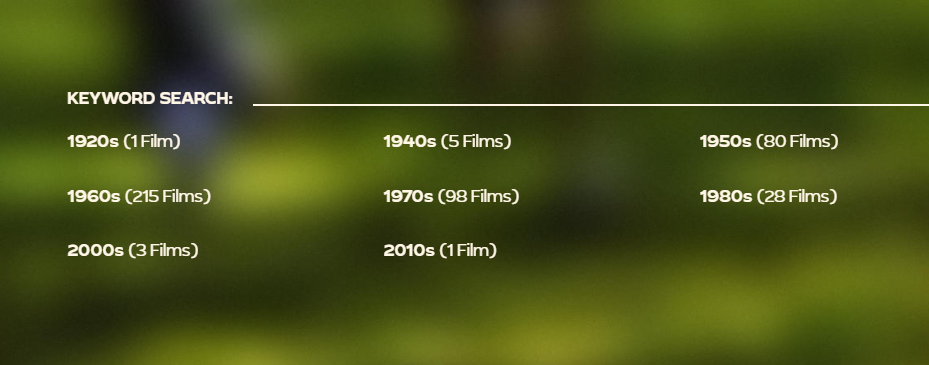
-
-

Here is the application
https://www.carverbank.com/assets/files/sH4xAGTG
To Apply use the following link
https://www.carverbank.com/Competition
The following is the application in images
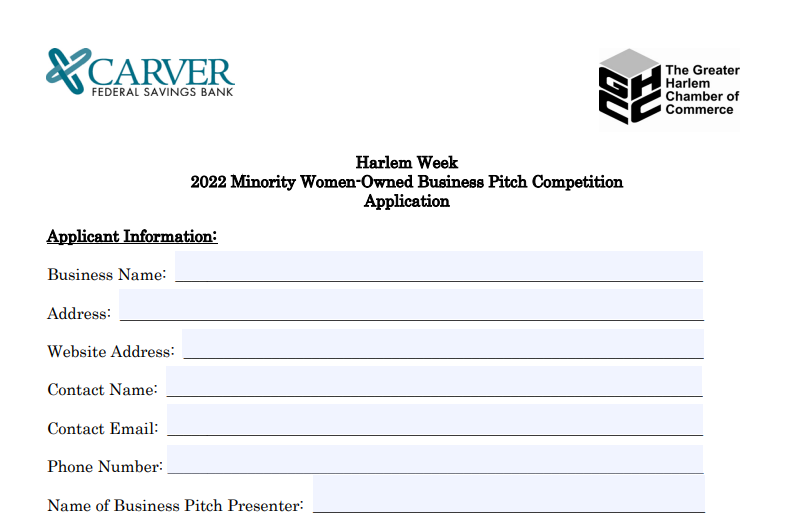
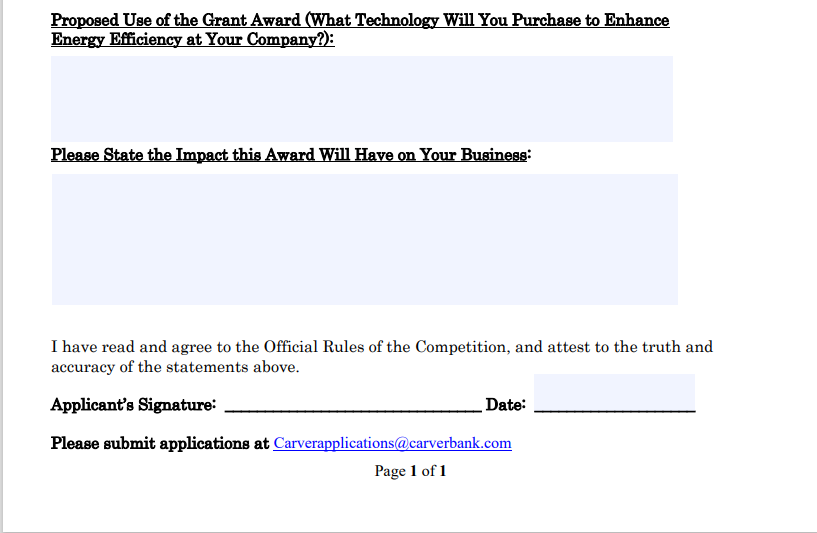
-
Lupita Nyong'o On Why She Decided Not To Star In 'The Woman King'
Bre Williams
October 19, 2022Lupita Nyong’o is talking about why she decided to not star in The Woman King.
The actress was set to star alongside Davis in the upcoming historical film The Woman King. But back in 2020, the actress walked away from the film in which she was to play an Agojie warrior.
In a new interview with The Hollywood Reporter, Nyong’o opened up about why she decided against starring in Gina Prince-Bythewood’s film.
Nyong'o didn't feel like the role was right for her.
According to IndieWire, Nyong’o was set to play an Agojie warrior in The Woman King starring Viola Davis, who also produces. The Agojie tribe inspired the fictional Dora Milaje female army in Black Panther.After she was cast in the film, the actress made a short documentary about the Agojie tribe called “Warrior Women With Lupita Nyong’o.”
Per The Hollywood Reporter, the Academy Award winner “grapples uncomfortably with the tribe’s legacy of violence.” After the documentary, Nyong’o decision to exit The Woman King though she hasn’t specifically revealed why.“It was very amicable, the departure from it,” Nyong’o said. “But I felt it wasn’t the role for me to play.”
Thuso Mbedu took over the role Nyong’o was slated to play.
After her departure, Lupita Nyong’o’s role was given to Thuso Mbedu.In addition to The Woman King, Nyong’o also exited the upcoming Apple TV+ series Lady in the Lake, which stars Natalie Portman. Moses Ingram replaced her in that series.
“I’m desperate for small projects,” Nyong’o told THR. “They’re harder to get off the ground, they’re harder to stay on track. Bigger movies elbow them out of the way. The pandemic and the fiscal stress on the industry has made it even harder for those movies to get made.”
Nyong'o is currently balancing large projects with smaller independent roles.
“I think to be culturally prosperous, to be artistically prosperous as a people, is to have options. I personally love a good Marvel movie, but it doesn’t take me away from really wanting the little character-driven film,” the Us actress shared. “I believe in the fight for those things to be kept alive because the one thing we always want, the ultimate privilege, is choice.”She concluded, “It becomes a philosophical question about what is art and what is its purpose. I believe that art plays a role in moving the people that experience it, and a lot of people are moved by Marvel. Is you being moved by this thing less important than me being moved by Picasso?”
Bre Williams
October 19, 2022ARTICLE
https://shadowandact.com/lupita-nyongo-on-why-she-decided-not-to-star-in-the-woman-king
THE BLACK DRAGON'S REVENGE - RON VAN CLIEF - FULL HD MARTIAL ARTS MOVIE IN ENGLISH
imdb
https://www.imdb.com/title/tt0072858/?ref_=nm_flmg_act_16
film
LINK
https://www.youtube.com/watch?v=VeOoWRtASY4Is Kanye Finally CANCELED? from Bad Faith
LINK
https://youtu.be/wxHAm-bgFyM
Referral
https://twitter.com/msolurin/status/1580952441839026179
Art Block and Burnout from chrissa bug
LINK
https://youtu.be/e_tYHhkjC4s
REFERRAL
https://www.deviantart.com/chrissabug/status-update/New-Video-about-Art-Block-93374057228 Stories You Can Read Online for Black History Month
“Anything Could Disappear“
By Danielle Evans
Electric Literature
https://electricliterature.com/anything-could-disappear-danielle-evans/“Drinking Coffee Elsewhere“
By Z.Z. Packer
The New Yorker
https://www.newyorker.com/magazine/2000/06/19/drinking-coffee-elsewhere“The Era“
By Nana Kwame Adjei-Brenyah
Guernica
https://www.guernicamag.com/the-era/“Suicide, Watch“
By Nafissa Thompson-Spires
Dissent Magazine
https://www.dissentmagazine.org/article/suicide-watch-heads-colored-people-social-media“French Absolutism“
By Brandon Taylor
Joyland
https://joylandmagazine.com/fiction/french-absolutism/“What’s For Sale“
By Nicole Dennis-Benn
Kweli Journal
http://www.kwelijournal.org/fiction/2014/5/14/whats-for-sale-by-nicole-y-dennis-benn?rq=What's“Sunflowers“
By Bryan Washington
Boston Review
http://bostonreview.net/fiction/bryan-washington-sunflowers“Dangerous Deliveries“
By Sidik Fofana
Epiphany
https://epiphanyzine.com/features/dangerous-deliveries-fofana“Williamsburg Bridge“
By John Edgar Wideman
Harper’s Magazine
https://harpers.org/archive/2015/11/williamsburg-bridge/“The Key“
By Nnedi Okorafor
Enkare Review
https://enkare.org/2016/11/14/key-nnedi-okorafor/“Milk Blood Heat“
By Dantiel W. Moniz
Ploughshares
https://www.pshares.org/issues/spring-2018/milk-blood-heat“Bear Bear Harvest“
By Venita Blackburn
Virginia Quarterly Review
https://www.vqronline.org/fiction/2018/12/bear-bear-harvest“Beg Borrow Steal“
By Maurice Carlos Ruffin
Kenyon Review Online
https://kenyonreview.org/kr-online-issue/2015-summer/selections/maurice-carlos-ruffin-342846/“How to Kill Gra’ Coleman and Live to Tell About It (Vauxhall, NJ, c. 1949)“
By Kim Coleman Foote
Missouri Review
https://www.missourireview.com/how-to-kill-gra-coleman-and-live-to-tell-about-it-vauxhall-nj-c-1949-by-kim-coleman-foote/“Allentown, Saturday“
By Gabriel Bump
Brooklyn Rail
https://brooklynrail.org/2020/06/fiction/Allentown-Saturday“Books and Roses“
By Helen Oyeyemi
Granta
https://granta.com/books-and-roses/“God’s Gonna Trouble the Water“
By Randall Kenan
Oprah Magazine
https://www.oprahmag.com/entertainment/books/a33350187/randall-kenan-short-story-gods-gonna-trouble-the-water/“What It Means When a Man Falls From the Sky“
By Lesley Nneka Arimah
Catapult
https://catapult.co/stories/some-mathematicians-remove-pain-some-of-us-deal-in-negative-emotions-we-all-fix-the-equation-of-a-person“The City Born Great“
By N.K. Jemisin
Tor.com
https://www.tor.com/2016/09/28/the-city-born-great/“202 Checkmates“
By Rion Amilcar Scott
Electric Literature
https://electricliterature.com/202-checkmates-by-rion-amilcar-scott/“All This Want and I Can’t Get None“
By Tia Clark
Joyland
https://joylandmagazine.com/fiction/all-this-want-and-i-cant-get-none/“Wet Paper Grass“
By Jasmon Drain
Terrain
https://www.terrain.org/fiction/26/drain.htm“Emperor of the Universe“
By Kaitlyn Greenidge
Kweli Journal
http://www.kwelijournal.org/fiction/2014/10/10/emperor-of-the-universe-by-kaitlyn-greenidge“Ark of Light“
By Victor LaValle
Lightspeed Magazine
https://www.lightspeedmagazine.com/fiction/ark-of-light/“False Cognates“
By Ladee Hubbard
Guernica
https://www.guernicamag.com/false-cognates-1991/“Whiskey & Ribbons“
By Leesa Cross-Smith
Carve Magazine
https://www.carvezine.com/story/2011-fall-cross-smith“A Selfish Invention“
By Donald Quist
Storychord
http://www.storychord.com/2017/03/issue-140-donald-edem-quist-tracy.html“Best Features“
By Roxane Gay
Barrelhouse
https://www.barrelhousemag.com/onlinelit/2010/11/1/best-featuresARTICLE
https://chireviewofbooks.com/2021/02/01/28-stories-you-can-read-online-for-black-history-month/


